You're currently viewing a custom sorting.

Originally Aired: 1993-2-1
Synopsis:
Geordi falls in love with an alien murder suspect. [DVD]
Problems
None
Factoids
None
Remarkable Scenes
- Picard intimidating Morag with his influence over Gowron.
- Aquiel showing up on the Enterprise.
- Crusher's hand showing up in the gunk.
- Geordi phasering the shape shifting life form.
My Review
An absolutely dull episode and sad in a way. Another tragic LaForge romance in which we watch him spend virtually the whole episode trying to land a girl only to be turned down in the end. The murder plot is confusing right up until the last moment at which point LaForge employs Texas justice, murdering the murderer. It's a little absurd that he never once called for security despite the fact that he had plenty of time to, and could easily outrun the shape shifting blob. I'm a big fan of LaForge and all, but frankly, this has got to be one of his worst episodes.

Star Trek TNG - 1x24 - We'll Always Have Paris
Originally Aired: 1988-5-2
Synopsis:
Captain Picard is reunited with an old flame. [DVD]
Problems
- During the multiple Datas scene, one of them says, "It's me!"
- Data says the mad scientist guy's experiments were causing time ripples with a radius of 1000 light years or more, yet nobody seems concerned about the implications of such a thing being true.
Factoids
- For some reason, Denise Crosby is still credited as Tasha Yar for the rest of the season, despite her death in the prior episode. I guess they couldn't be bothered to alter the opening credits.
Remarkable Scenes
- Picard's fencing match in the beginning.
- Picard: "Enough of this self-indulgence." Regarding his time on the holodeck.
- Picard's strange behavior on the bridge when he reaches his old girlfriend before anyone else know just who's down there.
- Picard, Data, and Riker meeting themselves from 5 seconds ago is awesome.
- Picard confronting his lost love regarding their unfinished business.
- Beverly fantasizing about Picard.
- Data navigating the obstacle course lab.
- Data talking to his three selves.
My Review
What this episode lacks in its attempts to be profound it makes up for in being a great character story for Picard with a wonderful action sequence for Data. Even by now, stories about characters being reunited with "old flames" are becoming something of a cliche on Star Trek. It's not necessarily unrealistic that in the course of scampering across the galaxy that some of the characters would meet up with people they used to spend a lot of time with, but at the same time it strikes me as a somewhat unimaginative way to force character development out of an episode. I can't help but roll my eyes and say "oh, of course there's somebody Picard used to know on that planet!" Despite this, the episode was solid and entertaining, if a bit unrealistic at times.
The following are comments submitted by my readers.
- From DSOmo on 2007-06-07 at 6:34am:
- When the Enterprise receives the first distress call from Dr. Manheim, he gives only two coordinates to his location. How were they able to travel to the correct location? Three coordinates are needed for three-dimensional space.
- Jenice tells Picard she waited for him all day. She also comments that it was raining. Their rendezvous was at an open-air cafe! Did Jenice sit in the rain all day and wait for Picard?
- During the time rift, the multiple Datas question each other as to who is in the correct position. The middle Data says, "It's me!" In addition to the fact Data cannot use contractions, Data's response is also bad grammar. The correct response should be, "It is I!" - From CAlexander on 2011-03-14 at 5:16pm:
The character development was amusing to watch. The other plot was too perfunctory, with unnecessarily huge implications that were ignored.
At the end, Dr. Mannheim asks to return to the research lab, and Picard says OK. I was flabbergasted. They should be hauling him off to prison for Reckless Endangerment of the Galaxy!
@DSOmo: I notice the rain issue as well, but I assumed the cafe was open-air from the sides, not from the top. I don't think the camera ever panned up to show whether or not there was a roof or canopy above them. - From Percivale on 2011-12-06 at 4:17pm:
I think the real mistake was deciding that Data wouldn't be able to use contractions. It makes no sense other than to make Data more identifiable as an automaton - which they try so hard to disprove throughout the series - and they obviously couldn't keep up with their own rule. - From 0ne mooner on 2012-02-18 at 5:31am:
In which Data gets to be a hero. Win!
The guest star who plays the prof also plays Sigmund Frued on Bill and Ted's excellent adventure.
If riker is to buy a round at the blue parrot how is he to do this? I thought currency in the federation was obsolete? - From mattymjp on 2013-07-21 at 7:05am:
Some interesting outfits worn by the female guest stars in this episode. That is all I have to say! - From Dr. Paul Obumheim on 2023-04-21 at 7:53am:
The scene at the lift where they meet themselves is fantastic, I love it.
Great episode, could have done without the Cafe scenes.

Star Trek Voy - 4x02 - The Gift
Originally Aired: 1997-9-10
Synopsis:
Voyager adjusts to its new crewmember. [DVD]
Problems
- According to Janeway, Tuvok's meditation lamp was purchased from a Vulcan master who doubled the price when he saw the Starfleet insignias. Well, the Federation does not use a currency driven economy. The Vulcans as Federation members wouldn't be selling things to other Federation members. Furthermore, the Vulcan master would have no reason to double his price upon noticing that his buyers were Starfleet officers, seeing as how Starfleet officers do not get paid. On the contrary, Janeway seemed to imply that Starfleet officers are very well paid and that the Vulcan master knew this which is why he doubled his price.
Factoids
- Like the previous episode, the Kes character is actually a guest star in this episode.
- This episode establishes that Seven of Nine's given name is Annika Hansen.
- Species 259 was assimilated in galactic cluster 3. They contributed autonomous regeneration sequencers to the Borg. Galactic cluster 3 is supposedly beyond Ensign Kim's comprehension. Seven of Nine described it as being a "transmaterial energy plane intersecting 22 billion omnicordial life forms."
- Janeway claims to have met Borg who were freed from the Collective. Given her lines, it would seem she's talking about people other than Jean-Luc Picard.
Remarkable Scenes
- The opening scene showing Voyager still "augmented" with Borg systems everywhere.
- Kes beginning to display extraordinary powers.
- Janeway researching Seven of Nine's past.
- Kes saving Seven of Nine's life.
- Seven of Nine working in Engineering.
- Kes manipulating the flame in Tuvok's Vulcan mental exercises.
- Kes stopping Seven of Nine from contacting the Borg.
- Janeway: "I've got an Ocampan who wants to be something more and a Borg who's afraid of becoming something less. Here's to Vulcan stability."
- Janeway: "One voice can be stronger than a thousand voices."
- Kes blowing up the corridors as she walked through them.
- Kes throwing Voyager 9,500 light years closer to home.
My Review
This episode is more like Voy: Scorpion, Part III, as it directly deals with the events of the two parter. Never before has Voyager done a three part arc before. Interestingly, Seven of Nine says in this episode that Janeway won't be able to change her nature and that she will betray Voyager. When Seven said that, Chakotay's scorpion speech was ringing in my head. I'm not sure if the connection was intentional or not, but certainly interesting. In some ways I could have done without the scene depicting Janeway's private goodbye conversation with Kes. It was a little too feminine and tearful for my tastes. But I understand that it was necessary. It's just that I find it vaguely ridiculous trying to imagine a scene like that between Troi and Crusher, or Kira and Dax. In some ways it felt overacted. In the end, I suppose Kes was given a suitable amount of closure. Her scene with Neelix certainly could have been done better. The reason for their breakup is written off as a joke. And the suddenness of her leaving the ship is kind of annoying. I realize that behind the scenes, Jennifer Lien wanted to leave the show and all, but I would have expected a better farewell. To me, the loss of the Kes character really is a loss. I like Seven of Nine, but I liked Kes more. And I was really looking forward to seeing her grow old like was depicted in Voy: Before and After. Oh well. What's done is done. No more Kes. As a final comment, it's remarkable to note that this is the first of many times Voyager cuts substantial sum of time from its journey due to some extraordinary means. Thanks Kes!
The following are comments submitted by my readers.
- From Mike on 2008-07-08 at 3:05am:
Jennifer Lien did not want to leave the show; she was forced out. This is well known in ST fandom. - From JaM on 2009-06-01 at 12:32pm:
"Janeway claims to have met Borg who were freed from the Collective. Given her lines, it would seem she's talking about people other than Jean-Luc Picard" Well, she met the Ex-Borg in 3rd seasons: "Unity" - From Drac on 2010-05-04 at 5:07pm:
Not suprised Jennifer Lien had to leave the show her acting made them all look bad.She and the doctor are my favourite characters so far.Her character held so much potential and she had the talent to back it up thats what i call wasted opportunity.Not like Harry Kim who had his chance one too many times , he should be dead alredy that would make it easier to forget about Kes.About the borg they handled her poorly but i am willing to let this one go.I can tell alredy she will be a weak substitute for Kes.
- From blown on 2011-09-18 at 8:04am:
This episode blew me away. Up in my favorite Voyager episodes so far.
It had less action than the two-parter that sets it up, but much more heart, drama, and ethical dilemma to make up for it.
It was an absolute blast to watch Seven of Nine's transformation, and interesting to see the Doc and Janeway confront the ethical ambiguity of their actions - what Seven of Nine referred to as forced "assimilation" into humanity. Loved this role reversal.
The Seven-in-recovery was a very compelling mix of trapped animal, addict going through withdrawal, and desperate young woman in the midst of a severe emotional and existential crisis. I thought the performance was excellent.
Re: the Kes storyline, I liked this progression as well. Pretty bad ass to see her perform neurosurgery with her mind, see through the fabric of matter, energy, and thought, and ultimately go through some kind of mysterious ascension, saving Voyager from Borg-space (and cutting 10 years off their journey) in her final parting moments. Vaguely techno-spiritual, but nicely done.
The few things I took issue with were Tuvok saying, "there is nothing beyond the sub-atomic level" - granted he's not a science officer, but I'm sure he's still well educated. The comment just made no sense.
Another small point was Torres and Kim's (non)reaction to working with Seven of Nine. I mean, you would think they'd be a bit less casual about working side by side with someone so recently "de-Borged," and so recently trying to sabotage the ship. They were just unrealistically casual and nonchalant about it. Kim was practically hitting on her. I mean, all this is fine, just not so incredibly soon!
Another thing I didn't much like was how Kes unintentionally hurts Neelix physically in the mess hall (though I love how she succeeds in sparing most of his emotions in their "soft" break-up). This "Kes has powers beyond her control" thing was done pretty much to death in "Voyager: Cold Fire," and I was actually relieved when she was finally in control in this episode...so it was really annoying to see this kind of thing start to creep back in.
Likewise, the other slightly annoying thing was how Kes' transformation was destabilizing the molecular integrity of the ship or whatever. On the one hand, I like what this does for the plot and how it compels Kes to leave. Seeing her as a kind of walking time-bomb in the very last moments is also kind of interesting. But something about all that just doesn't sit quite right. It's probably because it's more of that same stuff from Cold Fire...Does *everything* cool that happens Kes have to simultaneously be dangerous and harmful? Why are her not-so-latent powers so irritatingly ironic?
Anyway, I complain about this but as I said, I also weirdly appreciate it. It reminds me a bit of Jean Gray from X-Men and her transformation into the Phoenix force (if you forgive the weird comparison).
So, overall a great episode and I suspect a slightly under-rated one.
- From Rick on 2013-03-30 at 3:34pm:
""interesting to see the Doc and Janeway confront the ethical ambiguity of their actions - what Seven of Nine referred to as forced "assimilation" into humanity. Loved this role reversal.""
I thought this was a specious argument. I would counter by saying that sure, you can go join the collective because its your choice. But by the way, if you are willfully choosing to join the collective you are guilty about 100 billion counts of conspiracy to commit murder, so we are going to have to lock you up. The whole reason no one blames the drones is because they didnt have a choice, but if they willfully choose to be a borg then that kind of goes out the window. So of course Janeway is correct to point out that she has no rational capability to make this decision. - From thaibites on 2014-05-25 at 4:12am:
Wow, 3 kick-ass episodes in a row! I'm shocked and quite happy. These all had action, drama, and suspense. I wish all the episodes could be this good. Is this a turning point for the series, or just an anomaly? - From Dstyle on 2015-06-01 at 2:07pm:
From the moment she was introduced I've had this fear for the Seven of Nine character, which is that she'll serve as the "I know everything the Borg Collective knows" character. I just don't think that's how the Borg are supposed to work.
To use an admittedly imperfect analogy, picture the Borg Collective as a gigantic supercomputer with each drone acting as a single microchip in that computer. Then remove and isolate one microchip and say, "Hey microchip, tell me everything the supercomputer knows." The microchip would be like, "Uh, I turn this switch on when I get the signal and turn it off when I get another signal. That's all I know." I just don't think each drone, when separated from the Collective, can retain all of the knowledge of the Collective.
To use another imperfect analogy, think of the Borg Collective as the Internet. We can all tap into the collected knowledge of the internet whenever we need it. If a situation arises where I need to access this knowledge, say the toilet lever breaks, I can tap into this massive repository of human knowledge and quickly and easily look up a video on YouTube on how to repair the toilet and make the repair myself. Take away the Internet and I'm left to my own devices. Maybe I remember how to fix the toilet, maybe I don't.
I've watched one or two episodes past this one and it's clear Seven seems to know and remember everything the Borg know, which just seems ridiculous to me. If anything, she should barely be able to function at all once severed from the Collective. The transition seems to be happening too easily for my tastes, but I guess I'm watching a late 90s show in 2015, when the nature and quality of television programming has changed dramatically, and I need to adjust my expectations accordingly. - From McCoy on 2017-08-12 at 6:13pm:
"Star Trek: The Series of Wasted Opportunities" continues. Great premise 1 - Starfleet and Maquis on one ship. Execution - all friends after couple of days. Great premise 2 - Delta Quadrant. Execution - holodeck adventures, abducted humans, quasi-klingons, borg...
And now the conclusion - from all characters in this show they kicking off one of two interesting (second is The Doctor). If they nedded more space for new character, why they didn't kicked off frustrating one dimensional Torres, boring Chakotay, Jar Jar Neelix or Mr. Nobody Kim? Oh, I know. I've read Kim was too beautiful to be killed...
Really - this is beyond my understanding. I would love to see Kes growing older, maybe becoming mentor to the crew. And just before death sending Voyager back home. So much potential in her! All wasted.

Star Trek TNG - 5x06 - The Game
Originally Aired: 1991-10-28
Synopsis:
Wesley returns to find the crew addicted to a game. [DVD]
Problems
None
Factoids
- Boothby's second mentioning, by Wesley.
Remarkable Scenes
- Wesley and Data discussing the acadamy.
- Data mentioning Beverly's dancing skills. A connection with TNG: Data's Day.
- Geordi: "Tell'm to flip a coin!" Data: "A coin. Very good. I will replicate one immediately."
- Wesley mentioning Boothby.
- Beverly pushing the game on Wesley.
- Wesley and Lefler tinkering with the game trying to figure out how it works.
- Wesley in the turbolift with an addict.
- Data unbrainwashing everyone.
My Review
This episode has a number of problems at the basic level. Firstly, we never see Lefler again. Second, if brainwashing people is this easy, why isn't it done all the time? Third, who the hell are the Ktarians and why do they want to take over Federation starships? Fortunately we get to learn a little bit more about the Ktarians later, mostly thanks to Voyager. But still, this episode seemed wholly random and without much purpose.
The following are comments submitted by my readers.
- From Pete Miller on 2006-04-15 at 11:10pm:
This episode just plain sucks, and a 2 is way too generous. First of all, Wesley coming back from Starfleet academy to discover that his mother and everyone else he loves are basically heroin addicts is just ridiculously cruel. What a horrific welcome back episode. Secondly, the Lefler character is so charismatic, beautiful, and just damn likeable and they NEVER bring her back. She had the potential to be one of the best minor characters ever. Thanks Rick.
Thirdly, the premise is stupid. A game is just sooo addictive that everyone on the whole enterprise is seduced by it. I can buy Riker getting addicted, and maybe even Picard (although probably not), but WORF??? No way in hell Worf would ever play the game. For the sake of justification, perhaps Picard ordered him to play it. Either way, it's just stupid beyond reason.
Lastly, no one ever apologizes. Yes, I know that they weren't "themselves", but they seemed to remember what they did. Therefore, the idea that Wesley would leave without so much as an apology from anyone is completely absurd. Then again, this episode is completely absurd, and it pisses me off every time I watch it. The only thing saving it from a zero is that at least it doesn't break canon, and Lefler is a thoroughly enjoyable character. - From DSOmo on 2007-09-06 at 8:47am:
- When Riker wants to introduce the game to Troi, he finds her in Ten-Forward. He finds her enjoying a bowl of chocolate ice cream. She proceeds to describe for him the ritual of eating chocolate. Isn't it a little late in the series for new expositional material between Troi and Riker? Riker acts like he's never seen Troi eat a bowl of chocolate ice cream before. She is doing it in Ten-Forward. Obviously this isn't a ritual she observes only in private. This is the fifth season, and Troi and Riker supposedly knew and dated each other before either joined the Enterprise. How could he never have seen this before?
- Picard tells Riker that Wesley will arrive by shuttle. Yet when Wesley does arrive, he beams in from a science vessel.
- When Robin tells Wesley he needs to calibrate the sensors manually, he balks. He then tells Robin that the computer must do it. Of course, she proves him wrong by marching over and demonstrating. Has Starfleet Academy ruined Wesley? This is the same guy who turned a tractor beam into a repulser beam in his head when everyone said it was impossible. This is also the guy who helped the engineers reroute power when an alien entity took over the ship. He did both of these things when merely a child, and now that he's in Starfleet Academy he doesn't know how to calibrate a sensor manually?
- Does it strike anyone else as odd that Picard will play the game but Wesley won't?
- When Crusher and Worf come looking for Wesley, they find Wesley and Robin on Wesley's bed, simulating the game-playing using mock-ups. Crusher and Worf leave satisfied. Wesley never puts the mock-up on again. Wouldn't it make more sense for him and Robin to continue to wear the game and fake the pleasure?
- While Wesley prepares to elude the crew, he tells Robin that he programmed a site-to-site transport program. This all makes sense because it would allow Wesley to beam from anywhere to anywhere on the ship. In the actual beaming, Wesley beams from a hallway to a transporter pad! That's not site-to-site, that's normal transport. In fact, because Wesley uses normal transport, Geordi can locate him, telling Picard that Wesley ended up on deck 6. - From djb on 2008-03-26 at 7:43am:
For some reason, this is one of my favorite episodes. Probably has something to do with childhood memories.
The premise and ramifications of such a simple brainwashing device are a bit scary. I think they could have made it more believable with a few modifications. Also, it's good to see Wesley back for an ep, but sadly it's yet another installment in the "Wesley and/or Data save the day" vein, of which there have been far too many. Lefler is a great character (and Ashley Judd's looks certainly don't hurt), but it's a shame we don't see that character again. I guess we can add her to the long list of guest stars we'd love to see more of but we never hear from again, of which, there are, again, far too many. (Probably a budget thing.)
That being said, this episode has a lot of good moments. Riker's face when he first gets a hit from the game is great. Wesley flirting with Robin is great, but then again, I'm a romantic. Seeing all the characters brainwashed is a freaky sight! People we know and love and trust week after week, all turned into evil zombies. Contrived, but fun. Watching our cute couple figure out what the "Game" really does, figuring out what's wrong with Data, and pretending to be brainwashed, is fun and entirely believable, given how brilliant both of them are. I also liked the chase scene. It reminded me of The Hunted from season 3.
Data's coming on the bridge and snapping everyone out of it is a pretty badass moment. Even though Data saving the ship (yet again) is an old plot device, it is still believable, and fun to watch.
One little nitpicky thing-- when Worf and Riker force Wesley's eyes open. He blinks, indicating they haven't really got his eyes forced open. That's a pretty difficult thing to do; you pretty much need a speculum if you want to do it without actually touching/hurting the person's eyes (as in "A Clockwork Orange"). But they could at least have used a take where he didn't blink.
I'd have to agree with the problems in plot/execution that others have mentioned; taking all that into account I'd normally give it a 4, but tilt it up to 5 or 6 because... well, I liked it. Flawed in concept, but well-executed, and memorable. - From Rob UK on 2014-02-03 at 4:47am:
Sad to say i am also a hater of this episode but no surprise here it is for completely unusual reasons.
Firstly, the potential for drugs(or technology that alters the chemicals of the brain responsible for perception) that alter the mind in sci-fi is phenomenal (just look at farscape), it is totally wasted here with a lackluster effort, the crazy leaps that the viewer must make to understand how each character other than beardy Bill the sex fiend got tricked into playing long enough to get hooked, Bill was getting booty when he got hooked, be honest who hasn't been there in life more times than they care to remember, deviant sexual interest with a big bag of naughty that you promised yourself you were not going to have any of and definitely go to work monday morning?
I think you could call that a sidetrack, anyway where was i?
For me what made this episode the most painful was all the orgasms faces we had to endure as our crew 'score goals' in the game, Dr Krushers were particularly excruciating but i literally thanked the powers that be when we were spared Picard's 'jizzface' when he put the game on just after Wes tried to get a shipwide investigation going, just thank the heavens and the hells that he wasn't very good at it I say. Sadly i was not saved as i have a visceral imagination that has a mind of it's own and as the scene cuts away with Picard looking like he is gonna take a shit with concentration the minds eye continues the scene on until he gets his release, i apologise profusely to anyone reading this who also has a vivid imagination that can run away with itself visually and did with that imagery. - From Mike on 2016-10-27 at 7:39am:
I was hoping that the ending of this episode would be Wesley waking up and realizing that this game business was just a horrifying nightmare, as it was for us, the fans. Only in a dream could the entire crew be reduced to worthless imbeciles while Wesley and a young Ashley Judd save the day.
This is the first of two episodes (the other being "Rascals") in which the Enterprise is easily taken over by buffoonery. Not proud moments for the Federation flagship. - From Keefaz on 2017-01-08 at 12:31am:
My girlfriend and I are watching through all the TNG on Netflix, and I think this is the first episode we really struggled to sit all the way through. 2 or 3 times we almost turned it off.
It is so bad, and all the creepy close-ups and orgasm faces are painful to watch. The Troi ice-cream scene is especially eye-numbingly terrible. The only saving grace is the cute romance between Wes and Lefler, and you're really clutching at straws when that could be a highlight. - From ChristopherA on 2019-04-30 at 2:22pm:
I noticed many of the issues others have complained about with this episode, but I liked it anyway. I thought Wesley and Robin were likeable, the possessed Enterprise crew were creepy, and the episode was exciting to watch. Not my favorite, it does have a lot of issues, but a fine average episode. - From jeffenator 98 on 2019-09-06 at 5:19pm:
Law #103 All Wesley saves the ship episodes suck. 2/10 - From Chuck the Canuck on 2023-05-12 at 5:38pm:
"I'd like to know more about it before I try it," says Wesley. I guess aside from Lefler, none of the 1000+ other people aboard the ship thought of that.
I think the biggest plot hole here is that Crusher and Riker call Geordi to look at Data before they get him addicted to the game. Wouldn't he have done the exact same thing Wesley does later in order to figure out what's wrong with Data? Wesley even says he's one of the experts on Data.
The most entertaining parts of this episode are the looks and sounds people make as they play the game.

Star Trek TNG - 7x23 - Emergence
Originally Aired: 1994-5-9
Synopsis:
The Enterprise develops its own intelligence. [DVD]
Problems
- Uhh... so... the Enterprise develops an intelligence and even reproduces! And then suddenly just stops? For no reason?
Factoids
- This episode is a candidate for my "Worst Episode of TNG Award".
Remarkable Scenes
- The Enterprise starting to freak out.
- Data holding back a car.
My Review
More filler, this time worse because we've got bad sci fi to go along with it. Throw in the stock holodeck malfunction along with a no consequences plot, among many other things, and we've got ourselves one hell of a cliched episode. Besides the cliche, the science in this episode is really, really bad. I just find it hard to believe the Enterprise could come alive and reproduce, then never do it again, all of which for no reason.
The following are comments submitted by my readers.
- From RichD on 2006-05-03 at 9:23pm:
What an atrocious, abysmal episode. Lazy writing, uninspired acting, and erratic pacing. The Enterprise gives birth? What is going on? At this point in time in the series, in the 7th season, we should have never, ever been subjected to such a complete waste of time. My goodness. I can only think of one other episode that was worse, Shades of Gray. - From -ezm- on 2010-06-02 at 7:25pm:
Absolutely terrible episode. Bottom 5 for sure. To think that All Good Things would only be 3 episodes later. - From Paul on 2010-08-19 at 2:40pm:
I felt violently sick while watching this episode. Not sure if that was related to its intense badness.
Also interesting to note is the guy that plays the train conductor is also Jeffery Lebowski in 'The Big Lebowski'. I recognised his voice and couldn't work it out for ages ^^ - From ElGuapo on 2011-12-14 at 7:14pm:
Another computer turned intelligent episode... At least this one wasn't as bad as the one with the little repair robots that turned self-aware. Still, an awful episode. The only saving grace is the.. wait... I can't think of anything.
Oh wait.. I know.. maybe the new lifeform will look cool when TNG hi-def comes out in 2012! Right now it looks like the pipe screensaver from Windows 95.
- From L on 2013-05-09 at 6:27am:
Very irritating.
Using a mixed historical holodeck scenario to explore the ship's 'mind' seemed like cheating and cheap production values. I guess they made it justifiable, but it was pretty cheesy as a metaphor.
Picard saying they have a responsibility to respect the ship as any other living being is just stupid.
It's a highly crucial tool and a mobile environment that supports the crew's life; its developing intelligence is a serious problem as its desire for individual freedom is in immediate conflict with a desire to keep your environment supporting you and your crew's life. It demonstrated it was willing to kill them all when it started to use life support energy to reach the second star.
This is no time to be a hippie, an immediate lobotomy is called for!
I did like how in the end he said that the Enterprise's consciousness was the sum of their experiences and adventures over the years, so in a sense the crew was also the parent of the new life-form. A nice way to think about it.
But it was still a pretty unrealistic reaction to a ridiculous situation.
Good parts -
The analysis of Prospero and Shakespeare in the first scene.
Data out of the holodeck still with crazy hair and moustache.
Introducing the concept of consciousness as an emergent function of complexity. If only they had explored it in a better plot.
I'm sure there's been some ridiculous lines in seven years of The Next Generation, but Troi's
"I think we should follow that man, that brick might be an important clue.",
has to be one of the greatest. - From Emily on 2014-02-10 at 11:50pm:
I think for you to truly understand this episode it would be beneficial to have a deeper understanding of The Tempest.
In some ways I think that the ship’s intelligence, trying to break away from the confines of the ship in to a higher state of being is in many ways comparable to Ariel in The Tempest, a spirit who we are told is imprisoned within a tree (a thing of the earth in which a spirit of the air does not belong).
Ariel is freed from this chamber by Prospero and in return he obeys him as a servant. Prospero uses Ariel to control the forces of nature (it is worth noting here that the term ‘magick’ in Shakespeare’s time could be used to mean wisdom about natural forces/elements) in order to complete his mission of diplomacy. This is undeniably similar to the relationship between Captain Picard and The Enterprise.
As the play progresses, Ariel itches more and more for complete freedom from his earthly tasks. Prospero is a man of his word, and eventually releases Ariel once he has done everything Prospero has asked of him.
Another interesting thing to note about this episode, is that it is very close to the end of TNG. The Tempest was Shakespeare’s last (and arguably best) solo work and a lot of the play parallels Prospero’s magic art to Shakespeare’s art as a play write. At the end of the play (this is the scene shown at the beginning of the episode) Prospero says goodbye to his magic, and indeed the epilogue to the play can be interpreted as Shakespeare’s heart-warming goodbye to the theatre. Perhaps the use of this play is a nod to the fact that the writers would shortly be saying goodbye to TNG.
I could probably continue to research and write for days about the symbolism in this episode, the use of opposites, the exploration of the psyche, the ‘Brave new world’ and how this all relates to The Tempest and further to humanity.
However as this is and old article on an old webpage I’m guessing my efforts would amount to very little. I think what I’m saying is that this episode has a lot more to it than what you have taken prima facie and if anyone reading this has decided to just take a look at this episode and The Tempest in maybe a little more depth they will be greatly rewarded by what they find, and furthermore what I have written would have been worthwhile. - From Daniel Antil on 2014-08-31 at 9:18am:
I agree this is one of the worst episodes. It's almost a guarantee that any episode which relies on the holo deck for its storyline is generally insubstantial. There are so many things wrong with this episode:
1. The holo deck becomes the vehicle for the ship's computer to take over the ship??? It just can't happen!
2. Data, despite his strength, cannot stop a car from moving forward if he is merely squatting on the ground - it is simple physics - he would need proper leverage and weight balance.
3. The man who takes the gold brick and puts it into an empty slot in a wall... What does it mean??? There is obviously something symbolic about it, but they don't explain it at all!
4. The ship creates a life form in the cargo bay??? So many things wrong with that!
5. When the life form is complete, it simply passes through the ship's hull and flies off into space... Why? Where did it go? And why the heck doesn't the Enterprise follow it??? That should be the primary mission - investigate and keep tabs on a life form the ship created!
6. After the holo deck turns off, Data, Troy and Worf are still holding drinks in their hands... Drinks they got from the holo deck train.
That's just a basic list... There are dozens of other flaws in this episode. It's a stinker! - From Carolyn on 2015-08-28 at 5:45pm:
This is one of my favorite episodes. Very creative, funny and thoughtful. I can't believe the reviews I am reading here! - From GVT on 2016-08-02 at 7:28am:
I found Emily's comment very helpful in understanding this episode...thank you Emily. This episode does require a more metaphorical interpretation since, as L mentioned, having starships running around becoming self-aware and doing whatever they choose would spell disaster for the crews of those vessels. I find entertainment in the absurd so I rate this episode a 6...but with insight gained from Emily's post a 7.

Star Trek Dis - 1x05 - Choose Your Pain
Originally Aired: 2017-10-15
Synopsis:
While on a mission, Lorca unexpectedly finds himself in the company of prisoner of war, Starfleet Lieutenant Ash Tyler and notorious intergalactic criminal, Harry Mudd. Burnham voices her concerns about the repercussions of the spore drive jumps on "Ripper."
Problems
- The ship that abducts Lorca is stated to be a D7 class battle cruiser, but looks nothing like previous depictions in other shows. It should have looked more like this.
- When Culber is using a tricorder on Stamets, the screen misspells his name as "Staments."
Factoids
- Saru asks the computer to list Starfleet's most decorated captains, which are as follows: Robert April, Jonathan Archer, Matthew Decker, Philippa Georgiou, and Christopher Pike.
- The Buran, previously commanded by Captain Lorca, was ambushed about a month into the war. The Klingons boarded it and Lorca managed to escape, after which he destroyed the ship to prevent his crew from suffering at the hands of the Klingons.
Remarkable Scenes
- Mudd: "I used to have a life, captain. A good one. A respectable business. That all got blown up because of your goddamn war." Lorca: "Starfleet didn't start this war." Mudd: "Of course you did. The moment you decided to boldly go where no one had gone before. What did you think would happen when you bumped into someone who didn't want you in their front yard?"
- Tilly: "You guys this is so fucking cool!"
- The tardigrade going into some kind of protective hibernation to save itself.
- Saru ordering Culber to force the injured tardigrade into powering the spore drive one more time. Culber's response: "I will not be party to murder."
- Stamets subjecting himself to the spore drive to save the tardigrade's life.
My Review
This episode does much to recover from the missteps of the previous two. Opening with Burnham struggling with the morality of exploiting the tardigrade to gain a tactical advantage over the Klingons taps into the stuff that made Voy: Equinox so good. It took longer to get here than it should have, but it's still good stuff nonetheless. Ultimately, this is a fairly uplifting episode compared to the others so far. Burnham gets to free the creature, Lorca gets to atone for past sins to some degree, and Stamets gets to be a genuine hero. And when the science nerds are geeking out over their research, the story nearly breaks the fourth wall when Tilly exclaims her excitement with Star Trek's very first "fuck," as though the characters themselves are glad the writers finally let them do some real science and tapped into the spirit of Star Trek in a real way for the first time since the opening moments of the pilot.
There are only shades of it though. Turns out Starfleet is hunting for more tardigrades and doesn't seem all that interested in wrestling with the ethics. Even Saru refuses to hear out Burnham about the harm they were doing to the creature; a surprising development for a character who thus far has seemed beyond reproach at all times. He later comes around and pleads with Burnham to "go save its life," which was a nice piece of character development, but the payoff was a bit lackluster as the immediate consequence was for Burnham to recklessly dump it into space without the slightest clue as to whether she would be saving the creature or inadvertently executing it.
While it's certainly true that real life tardigrades are pretty hardy and it's reasonable to assume a macroscopic one that lives in space can probably survive a vacuum, just because an animal has tolerance for extreme conditions doesn't mean that such extreme conditions are in fact its ideal habitat. They never figured out how the tardigrade got aboard the Glenn to begin with and never got any hard information about what exactly the tardigrade's natural habitat actually was. So when Burnham saved its life, the whole thing amounted to a lucky guess based on a hunch. Happy endings are nice, but happy endings that just as easily could've been hubris aren't quite what the spirit of Star Trek is all about. Except of course when Janeway flies head first into a binary pulsar. But at the time in Voy: Scientific Method she was pumped up on drugs by bad guys to keep her dopamine levels high specifically to make her act erratically. Plus she hadn't slept in four days and had been in constant pain the whole time. Janeway's recklessness was an act of desperation. Burnham's was just reckless.
There were other, smaller deficiencies in the story as well. Saru's anger and/or jealousy directed towards Burnham regarding her closeness to Georgiou wasn't at all compelling. And we're treated to Stamets getting into yet another petty argument with someone. This time it was Burnham over whose idea it was to use a living creature as a navigational tool. It was also distinctly odd that we never got any real details about what exactly Tyler went through with that Klingon female captain. Luckily these weak storytelling beats were far less numerous and distracting this time than in the past two episodes.
Perhaps the most notable piece of storytelling in this episode is the breadth of character development we get for Lorca. It turns out Lorca was such a valued officer that after losing his previous ship with all hands that he was swiftly given another command and given free rein to fight the war however he saw fit, to such an extent that he frequently goes on unsanctioned missions that are only just now being reined in. The reason for his light sensitivity is revealed here too. Interestingly Lorca lied to the admiral about why he doesn't get his eyes fixed, citing a supposed distrust of doctors. He later reveals to Tyler during their escape on the Klingon space peacockraider that he doesn't want to fix his eyes because the pain helps him remember what he did to his previous crew.
The backstory of the Buran sets up Lorca as a tragic character in ways very reminiscent to Burnham. Both of them inadvertently caused the deaths of people they care about, but in many ways Lorca appears to be struggling with his version of this far more, despite being arguably less culpable. Besides his generally unhealthy obsession with the study of war and his masochistic desire to not fix his eyes, it was also particularly disturbing to see him throw Stuart, Harry Mudd's innocent pet against the wall, nearly killing it, for no other reason than to upset Mudd. This kind of completely unnecessary casual cruelty and indifference towards life are indicators of Lorca's poor mental health. As was Lorca's prior eagerness to capture and experiment upon the tardigrade. Likewise, while perhaps an intentional homage to Kirk's actions in TOS: I, Mudd, it was pretty horrifying to see Lorca leave Mudd in the hands of the Klingons; striking him even on his way out. Earlier Mudd tried to remind him that there are billions of civilians at risk on the ground while Starfleet makes war in the skies above them. Ultimately, Lorca's first duty is to protect civilians like Mudd, but he seemed all too willing to forget that simply because Mudd was selfish and obnoxious, as though that should deprive him of his human rights as a Federation citizen.
The surprising star of the show this episode though was Stamets. After a weak start at the beginning, Stamets enlists fully in Burnham's quest to unlock the full potential of the spore drive without causing further harm to the tardigrade. Then he bravely risks his own life to save both the tardigrade and his ship when he pilots the ship out of danger by taking the tardigrade's place as the spore drive's navigator. Shortly thereafter, Stamets also gets the distinction of depicting the first gay romantic relationship in a Star Trek TV series in the episode's closing scenes. Seeing Stamets and Culber in private together was a nice piece of character development that would've been nice to have gotten earlier. It makes them both suddenly feel far more relatable. We could've done without that sinister hangover effect from piloting the spore drive cliffhanger though. It felt forced and wasn't really needed. It would've been far more touching to end on Culber begging Stamets not to put himself in danger like that again, leaving the threat of lasting side effects from piloting the spore drive to be more of an implied threat rather than hamming it up like they did with that cliffhanger.
The following are comments submitted by my readers.
- From Rob UK on 2017-10-18 at 8:19am:
Talk about mudding the waters of continuity.
I apologise i couldn't resist the pun
We all know the spore drive has to fail so embarrassingly that it is bad luck to even talk about it, it's like watching paint dry waiting for the cliffhanger/impending disaster to happen, this is why we have never bloody heard of it before, well unless you are a fan of the real Paul Stamets like myself, if you don't know google Paul Stamets Psilocybin Mushrooms of the World and educate yourself
Still struggling to watch an episode in one take - From Matthew Kay on 2017-10-18 at 8:52pm:
My main beef with this show is that everything happens so damned fast. Like the Kelvin films, it feels like it's been scripted by someone who watches TV on fast forward, despite the streaming format allowing for more in depth exposition.
As Eric has said I think, the 'show don't tell' principle is one of the consequent problems. Like the Saru scene where he admits to jealousy - we have just been handed that bit of character exposition on a plate. We don't deserve it yet and it feels unreal.
Likewise the progress of the spore drive / tardigrade storyline. Over in a blink. No up front discussion of the glaringly obvious moral issues, but suddenly Saru's conscience is on full show at the end and the whole thing is resolved in two minutes behind Lorca's back. And of course by an unexplained Burnham shortcut - basically magic, which is becoming too common and an unwelcome part of the show's makeup. It's not inconsistent since she's always like that - it just undermines suspension of disbelief. Tory from BSG is wasted in a similar display of implausible fast-forward plotting.
I'm aware that the fact these guys are at war is a massive narrative factor. But we don't know them any other way. When Sisko or even Sloane act ruthless and ends-justify-the-means in DS9 you know the character through long burn earlier development or because there's a long and meaningful section of dialogue. Even the interplay between Sisko and Garak in that one episode is about 10 minutes longer than the genuine character development time we've had on this whole series. (The glib BS you get when characters like Lorca and Stamets are grandstanding is just superficial nonsense, not plausible character time.)
Discovery people - please stop trying to skip to the end, build your characters, build your world, earn your payoffs!
One last thing - I feel like this time period has been done to death. It's full of hokey continuity built on 60s/70s terrible production values and now pretty backward social values. Leave it alone' - From Kethinov on 2017-10-18 at 9:06pm:
Well said, Matthew. I completely agree. - From BSHBen on 2017-10-19 at 8:20pm:
Kethinov - thanks for continuing to post your detailed reviews! I'm still on the fence about the show, as I think are many people. I wish it would slow down and better earn its character and plot development. So far it has established the groundwork to make Stamets, Burnham, Lorca, and particularly Saru all multifaceted and memorable characters, but I'm worried that it won't deliver properly upon the setup. We'll see. There's plenty of potential here and "Choose Your Pain" is my favorite episode so far.

Star Trek Voy - 2x05 - Non Sequitur
Originally Aired: 1995-9-25
Synopsis:
Harry Kim awakens on Earth. [DVD]
Problems
- Paris' site to site transporter seems far too small a device for the power it contains.
Factoids
- The space doors aboard the starbase in this episode are a reuse of the Dyson Sphere door from TNG: Relics.
Remarkable Scenes
- Harry discovering who he is in this new dream world.
- Harry confronting Tom Paris in the dream world. Tom got in a fight with Quark on DS9 and was thrown in the brig by Odo. :) Apparently now, according to Harry, Tom is a loser and a drunk.
- Harry: "Why does everyone say relax when they're about to do something terrible?"
- Harry discovering that he fell into an alien "timestream" and that his dream world is the real but altered world.
My Review
This episode offers an interesting concept. How would you react to waking up into the life you've always wanted at the expense of your friends' lives? Well Harry immediately rejects it. I can see why. Would you be able to forget an entire year of your life and pretend to believe that something entirely different happened to you during that time? I know I couldn't. Besides idealism, this episode offers very little. It develops exactly as expected with no real plot twist. The Federation authorities are annoying in their suspicions of Harry and the entire plot is consumed with Harry's alternate life. So this episode comes off as kind of a dud.
The following are comments submitted by my readers.
- From Pete Miller on 2006-07-31 at 3:30am:
Oh yeah! THIS is why I hate Brannon Braga! - From yaspaa on 2010-06-06 at 11:19am:
Tom mentions being locked up by an unfriendly shapeshifter. A reference to Odo? - From thaibites on 2013-10-01 at 11:57am:
The problem I have with this episode is the same problem I have with a lot of the early season 2 episodes - there's too much Earth in them! The whole point of the series was to get out of their rut and away from the Federation. So, here they are - billions of light years away, and they amazingly keep encountering links to their "old life". Impossible!
Doesn't seem very creative or imaginative to me...(Actually, it shows the producers were either lazy, burned out, or under pressure from the network to dumb down everything so the masses could relate to the show better.)

Star Trek Voy - 3x18 - Darkling
Originally Aired: 1997-2-19
Synopsis:
The Doctor turns violent. [DVD]
Problems
- Janeway said: "I'm downloading the coordinates into Tuvok's tricorder." The proper term would have been upload, not download.
Factoids
None
Remarkable Scenes
- The doctor consorting with holographic historical figures.
- The doctor displaying odd behavior to Torres.
- The doctor's fire assault. Clever, seeing as how he can't be burned. :)
- Torres explaining to the doctor that by integrating personalities of historical figures, he also acquired the "dark" traits of their personality as well, explaining his odd behavior.
- The evil doctor torturing Torres.
- Evil doctor regarding the doctor: "What a hollow excuse for a life."
- The holograms of historical figures after being tortured by the evil doctor.
- Kes: "What you're doing is wrong." The evil doctor: "Not at all! It's working perfectly!"
- The mid air beam up.
My Review
A largely unremarkable episode. The doctor is once again yelled at for tweaking his program and causing it to glitch; one wonders why he keeps attempting this if he keeps screwing it up. Kes broke up with Neelix in Voy: Warlord and finds a way to fall in love at first sight with alien of the week. She eventually realizes such a relationship is a bad idea and opts not to leave the ship; all very predictable. The evil doctor was overly cliched and the focus of the episode was too much on interpersonal relationships and too less about the doctor's struggle to improve himself at all costs. Having said all that, there were many scenes to redeem this episode, even if it was flawed somewhat in premise and execution.
The following are comments submitted by my readers.
- From Dejan on 2007-12-17 at 11:54am:
Kes could easily remove Doctors mobile emitter in transporter room.. - From JR on 2012-06-04 at 12:58am:
Perhaps I missed something, but as far as I can tell it was not Kes that broke it off with Neelix in 3x10 Warlord - it was that controlling entity Teiran. I assumed after Teiran was defeated/exorcised, that Kes and Neelix were back together. I was taken aback seeing her rub up on an alien of the week.
- From Psycroptic on 2012-08-28 at 8:03pm:
^ I thought that as well, I kept expecting to see them back together - From TheAnt on 2013-10-09 at 10:33pm:
The 'Doctor Jekyll and Mr Hyde' episode.
I like this episode, for several reasons.
And Picardo really do carry the part well. For example when his evil self tell Kes how much he 'hate him' - the nice version of the doctor.
The trek up on the mountain side really hints of the kind of scenario we were shown in the old kind of horror movies as Dr Jekkyl and Hyde belong to.
Even so one have to admit that this is one of the more average episodes, and admittedly a filler. - From zook on 2013-12-23 at 10:30pm:
Something that is quite bothersome, and it's present all over SF shows: almost all alien species, in all the corners of the galaxy, have the same basic ways of expressing affection/attraction: kissing, touching faces, etc. Why? The only exception that comes to mind is the Vulcan hand touch, but even that was neglected with the new (Abrams) Star Trek. It shows a disappointing lack of imagination, and a missed opportunity to challenge our assumptions in interesting ways. - From Kethinov on 2013-12-24 at 7:59pm:
Zook, it's all part of Trek's remarkable take on convergent evolution. Most intelligent life is humanoid. Humanoid life all share a great deal of anatomical features due to convergent evolution. As such, all humanoid life expresses love (and other emotions) in similar ways, also due to convergent evolution. - From zook on 2013-12-24 at 10:54pm:
Kethinov, I think this explanation would make sense if behavior were determined on a strictly biological basis; as we all know, that is not the case. Also, it would not explain the Vulcan hand touch. Unless it's different for touch-telepathic species, like the Vulcans. But then again, Kes is also a telepath... - From Kethinov on 2013-12-25 at 3:15am:
Of course it's all biology. Emotional states, psychological conditions, even Vulcan telepathy, it's all from the brain, which is biology. And since Star Trek is asserting that most aliens are very much like us (by being humanoid) then it's reasonable to assume that they experience all these things in a sufficiently analogous way. - From zook on 2013-12-25 at 3:50am:
Not to drag the conversation on too long, but I should point out that the view you just expressed is not immediately obvious, and needs justification. It's an interesting question to ask whether all human behavior can be reduced to biology, or if there is also a cultural component. There is evidence for the latter, since groups of the same species (so with identical biology) develop quite different customs, behaviors and sets of values. It's not only plausible, but much more probable, that different species will be even more different in their inter-personal conventions, even if they are part of some convergent evolution narrative. - From Kethinov on 2013-12-25 at 6:22am:
I totally agree that it's not immediately obvious and should have been explained by the show at some point. Unfortunately, it's one of the Star Trek franchise's many unstated premises as I like to call it.
Fans have had to come up with their own off screen rationalizations to explain many things that are peculiar or counterintuitive for years. Probably the biggest one, which I think is a more generalized version of your question, is "why are all aliens mostly like humans?"
The official explanation is it's a TV show and bumpy foreheads are easier on the budget. The best in-universe explanation is convergent evolution. It's a shame the show never mentioned it (although there are hints of panspermia on occasion, which is helpful), but unfortunately that's all we've got! :) - From Rob UK on 2013-12-25 at 5:51pm:
TNG - The Chase is all about the discovery of the progenitor species who infected the alpha, beta, gamma and delta quadrants with their mitochondrial DNA, adding it in the primordial soup of thousands and thousands of planet.
This is explained by a hologram at the end (the actress who plays the female shapeshifter in DS9 plays the role) as a smoothed off less featured humanoid of the long distant past appears as the puzzle is solved, one of my favourite ST episode just for having the audacity to try and explain away the wrinkly forehead cheaper on the budget choice way back when it happened in a plausible enjoyable episode, very entertaining Klingons too like the meeting with Data in the mess hall.
Slight sidetrack there lol not like me hahahaha so we all look alike because we are all alike deep down where it matters.
With a little bit of nature vs nurture thrown in the mix.
Just incase anyone missed the anti racism message that Star Trek has carried in style since day one.

Originally Aired: 1997-2-26
Synopsis:
A planet is bombarded with deadly asteroids. [DVD]
Problems
None
Factoids
None
Remarkable Scenes
- Neelix' overly enthusiastic attitude and his fumbling with the backpack.
- Tuvok's little strength pissing contest with one of the aliens, crushing his fist.
- Neelix freaking out at Tuvok.
- Tuvok: "I am looking for Mr. Neelix' instinct. Perhaps it will be marked."
- Alien regarding having pushed Tuvok off the lift: "Mr. Tuvok returned to the surface."
- Neelix to the ambassador: "Mr. Sklar returned to the surface."
My Review
Redirecting asteroids to planets as a method of conquest is an interesting concept and an original plot. Unfortunately the episode concentrates very little on these would-be conquerors and nearly exclusively on Tuvok and Neelix. Not that there's anything wrong with that; it's just that the aliens of the week were particularly more interesting to me than another Neelix vs. Tuvok conflict. With respect to their conflict though, the episode reminded me quite a bit of the conflicts Spock and Dr. McCoy used to have. And in that respect, the episode was quite entertaining. Overall the episode is decent. It has some untapped potential though.
No fan commentary yet.

Star Trek Voy - 4x03 - Day of Honor
Originally Aired: 1997-9-17
Synopsis:
Torres learns the true meaning of honor. [DVD]
Problems
- Paris says: "I've never navigated a transwarp conduit before." This would seem to contradict Voy: Threshold. Not that I care. Most fans, including myself, do not consider that episode canon.
Factoids
- This is one of the only Torres-centric episodes in the season because the actress got pregnant and the writers didn't want to work it into the story.
Remarkable Scenes
- Torres' bad day in the teaser.
- Seven's response to when Torres asked her if she ever feels remorse for the things she did as a Borg: "No."
- Torres' decidedly negative experience on the holodeck, attempting to celebrate the Day of Honor.
- Seven to Paris regarding any advice she can give him regarding navigating a transwarp conduit: "You will have no idea what you're doing."
- Torres ejecting the warpcore.
- Tom: "How much worse could it get? Having to dump the warpcore has to be the low point of any day."
- Torres and Tom having to evacuate the shuttle.
- Tom: "Why is it that we have to get beamed into space in environmental suits before I can initiate first contact procedures?"
- Seven's solution.
- Torres declaring her love for Paris just before Voyager rescues them.
My Review
A multifaceted episode exploring both Seven of Nine's desire to integrate smoothly with Voyager's crew and the developing relationship between Torres and Paris. Additionally, the aliens of the week were interesting as well. While I found them personally annoying in execution, the idea for them was really cool. Voyager just leapt 9,500 light years closer to home, and they're still so close to Borg territory that they're still seeing the aftermath of the Borg Collective everywhere. Additionally, I thought it was very intelligent to use Seven of Nine's character to attempt to reproduce Borg transwarp technology. It seems Voyager's systems aren't capable of creating a transwarp conduit. Finally, Seven of Nine helping the Caatati was very much in the spirit of Star Trek, and is just the kind of thing I wanted to see from her character. All in all, a slightly above average Voyager episode.
The following are comments submitted by my readers.
- From L on 2013-12-23 at 8:48am:
Is this the first Star Trek to use a 'floating stranded in space with limited oxygen' plot device?
Was cool to see.
Torres is still incredibly unpleasant and angsty.
I love how Seven of Nine cannot be manipulated by her attempted guilt trips. - From thaibites on 2014-05-27 at 12:56pm:
Well, after three great episodes, it's back to crap. What a bummer! I knew we were in store for a "Seven needs to integrate into and be accepted by the crew" episode, but I was hoping it wouldn't be right away.
Actually, what I hated the most was this week's soap opera in space (literally) with Paris and the miserable one. I just can't stomach this relationship. To me, it's a slap in the face to any intelligent viewer. We're supposed to accept that the ship's pretty-boy is attracted to a miserable, bitchy, HOSTILE, hideous jerk? Kes, I could believe, but this relationship is worse than when TNG had Riker in love with a hermaphrodite! The whole crew needs to get together, hold her down, and have Tuvok use a cheese grater on those skull ridges.

Originally Aired: 1999-5-5
Synopsis:
Janeway learns about her ancestor. [DVD]
Problems
- Harry's story about his uncle Jack in 2210 contradicts much of established Star Trek history. But with all the historical misconceptions this episode shows us, I'm inclined to believe Harry got his history wrong.
Factoids
None
Remarkable Scenes
- Shannon O'Donnell predicting that the Y2k bug is nonsense. Bold statement for an episode written in 1999.
- Seven of Nine eavesdropping on Tom's and Neelix' contest. When both could not provide an answer to what the seventh wonder of the world was, Seven recited it.
- The doctor: "I too come from a distinguished line." Paris: "His cousin is an electric shaver."
- Chakotay: "Ship status report." Janeway: "Let me guess. The holographic engineer is having problems with her program, Neelix, the Cardassian cook is low on supplies, Seven of Twelve is regenerating, and Captain Chakotay is doing just fine."
My Review
Well I'm not the only fan who found this episode distasteful. The fundamental problem with this episode is that it contributes nothing to the overall story of Voyager. It's nothing but a "feel good" episode for the crew; they all want to get together and tell stories of genealogy and feel good about themselves. There is no contention, other than Janeway's recollection of history isn't as accurate as she thought it was, nor would Kim's be as I would imagine from his tall tale! As for the story of Shannon O'Donnell, that's where the episode starts to get offensive. Henry Janeway is portrayed as a man against progress and for reasons not sufficiently explored, the Millennium Gate was regarded as an undisputed symbol of progress. To me, it seemed absurd that the whole town has to close down so that "progress" could be achieved. The US is a huge place, surely there were other locations available that didn't require bulldozing old buildings! Additionally, it's annoying that the writers just couldn't resist to make an episode exploiting the whole Y2k craze, virtually the only redeeming quality of its inclusion is Shannon's declaration that it was/will be/is total nonsense. This episode bears striking similarity to the similar waste of time that was DS9: Take Me Out to the Holosuite, but the differences is that DS9's version had contention, humor, fun, and a meaningful ending. Voy: 11:59 just didn't. It was mostly pointless and if it weren't for a few funny moments spread lightly across the plot, it would receive a de facto zero.
The following are comments submitted by my readers.
- From Pete Miller on 2006-12-04 at 7:43pm:
I didn't think this episode was that bad. It was kind of stupid in a lot of parts, but the humor was great and the story was pretty cool. It added something about the self-sustaining ecosystems later used on Mars, so it's not like it doesn't contribute ANYTHING. Contributes more than "Take Me Out to the Holosuite" that's for sure.
Voyager meets Fargo, minus murder - From Mike on 2008-08-10 at 12:46pm:
Yeah I think you missed the boat on this review.
1) The theme of 'the negative impact of progress' is rarely shown on the generally optimistic ST. Here we see at least a bit of a human cost to building something like the "millennium gate".
2) The 'its a self-sustaining city' vs. 'its just a mall' theme brings up another ST issue. This isn't the optimistic 60s anymore, and we're not going to get a massive government-funded space program. Progress is going to be done by corporations, or its not going to be done at all. So that means profit and exploitation, symbolized here by the destruction of the small town way of life.
3) The theme of "revisionist history" is a rare one in popular culture. It also ties this episode to 'Living Witness'.
The episode was FAR from perfect, and the ending was incredibly rushed (all of those ends tied up). But it's a very thoughtful and intelligent episode. - From Baronvonellis on 2011-09-29 at 3:36am:
I liked this alot. It was very well done and thoughtful. It was also a nice change of pace from all the explosions and "shields down to 20%" junk that is in every other episode.
I feel like people are too critical of Voyager compared to TNG. This was very trek and explored alot of scientific and culturally issues in an entertaining story. What more do you want from it. - From Rick on 2013-01-10 at 8:48pm:
Boy, this have to be a tough episode for a liberal to watch. Do you root for the large corporation or the conservative that its trying to bulldoze? Tough choice.
I thought it was a very good episode for the reason that an above poster made. The liberalism going on now is mostly through large corporate entities looking to monetize any trend they can. - From Hugo Ahlenius on 2015-01-30 at 9:27pm:
So he has a giant bookstore with no customers, in a small town - doesn't a buyout deal with a good price sound pretty decent? I didn't find their chemistry and connection worked out very well. The history/reveal stuff was a tad interesting though. Felt mostly like a soap/tv-movie otherwise... - From parkbench on 2016-02-20 at 7:57pm:
I have to say I am really shocked at how negatively the site's author reacted to this episode. I'm glad some commentors came with a counterbalance, because this was one of the best episodes I have seen in awhile. Let me explain...
I have gotten to a point w/ Voyager where I usually keep it on in the background, even when I'm watching a brand new episode--why? Because the writing is so consistently mediocre, there are so many missed opportunities, so many actors straightjacketed by milquetoast dialogue that they come off as outrageously corny or artificially human, that it's hard to watch sometimes. But I love Star Trek, so I power through--and perhaps this is what the site's author really had a problem with.
Because having a "non-sequitur" episode isn't, in and of itself, a bad thing--what's bad is that Voyager is so aimless and so grasping for straws that when an episode like this comes along, all the storytelling could appear, to the untrained eye, to just be more meandering away from the plot.
But if you pay attention, this was a very lovingly crafted episode with tons of real social & political themes which, though flawed, drives to the very heart of the scifi and Star Trek formula: reflecting on the fragile potential of mankind.
If anyone--site author included--is surprised about the plotline, then they could do with some reading. Almost every major sporting event, from the NFL to the Olympics, major development project in the U.S. or elsewhere, major cultural site or monument, runs into this issue: and it's not pretty.
In fact, though the episode sort of gives out its legs towards the end--pitching the story as one merely about "progress" vs. "tradition", "the future vs. the past"--this is often what the (real-life) script looks like. Major projects want the prime real estate, not just random land in the middle of nowhere, and they will often do anything they can to get it. I have been to a major park in Kentucky that is totally rustic except for 2 or 3 random houses smack dab in the middle that STILL have functioning mailboxes and families living in them because they refused to cede their land, so the park built around them.
Hell, look at the railroads, the colonisation and destruction of indigenous lands that made most of this country possible, or even just any major fracking or resource-extraction project. Look at Appalachia, the health problems the majority of its residents face, the polluted water (a la Flint), the unemployment, joblessness, and total abandonment by the very powers that claimed they had come to save the area.
And when it comes to Olympic stadiums, it has been shown time and again that the promise of "business", jobs, and cultural notoriety is short-lived, while the costs are consistently stacked against the poor: people are evicted and streets are cleansed of any hint of poverty or decay, rent is driven up, and a temporary luxury economic bubble is created mostly for people from out of town to come and be a part of a brief media spectacle. And then what? It all leaves and usually what's left is like a monorail in a dying, de-industrialised town: a big eyesore that has done nothing but contribute to the already-existing massive inequalities and disparities between people living very different realities in these urban landscapes.
Or just look up the city of Shenzhen in China, which in the 1970s was a small fishing town. Through the incredible macro-social acrobatics of giant multinational firms and international finance capital, they systematically turned this tiny town into a (now eerily-familiar) post-apocalyptic landscape of a metropolis, hyper-polluted and hyper-segregated between the lower classes of workers and dagongmei and the business elites whose sole purpose in living there is to extract every bit of value they can from it before they leave. And I encourage you to do your own research if you don't believe me--have a look at any number of the problems facing the average citizen in Shenzhen, and tell me if the "progress" the town was granted was not a Pyrrhic victory.
This is the actual world we live in. It's not sci-fi, it's horrific shit. So if sci-fi manages to even reflect a PIECE of that, I'm all ears, because it's rare and it's brave to have that kind of honesty.
So my point is--the show, to a point, actually accurately depicts a lot of this dynamic, showing what community complacence OR resistance can look like (many people take the pay-out, while others launch grassroots media campaigns). It also hints at some kind of corporate exploitation, as some in the comments have noted; but as I said before, I wish this didn't end in a simple "past vs. future" morality tale. They bring up the idea of the "big shopping mall" and just leave it there; I wish more of the supposed benefits vs. deficits had really been teased out, so that if they really ultimately wanted Janeway to close his shop, it would be less an easy victory (we, the viewers, unconsciously want O'Donnell and Janeway to be together and a happy conclusion) and more of a melancholy turning-point, as the town's independence becomes subordinate to this massive social-engineering project--the times indeed they are a-changin'.
And that's another thing--it was a really neat narrative trick to tell us the conclusion of the plot and then to reconstruct it. Not the first time we've ever seen this, but seeing how well Shannon O'Donnell and Janeway get along, but knowing what must happen according to "history", creates a lot of mystery and curiosity in how it's all going to go down.
And speaking of narrative tricks, how about an "earth episode" that didn't boil down to some crazy holodeck caper but actually filled in, however messily (as ST is wont to do), the universe's actual timeline? That was very welcome for me.
Again, hearing Harry talk about his family, or Janeway talking about the fragilities of reconstructing history was a huge breath of fresh air for me. This was a script with real pacing, with dialogue that actually expanded on the plot and enriched the story's world, and reflected real themes while deepening them through an imaginative thought-scenario. Its flaw is less in the episode itself than in the whole trajectory of Voyager that allows a gem like this to be buried so mercilessly under layers upon layers of colorless dust.
And I suppose, coming to expect less than mediocrity from Voyager, I am willing to be forgiving about an offering that doesn't exactly "advance" the plot--I mean, this was the original idea of Voyager, wasn't it? "Return" to the old TOS style, have a "general missrion" peppered with vignettes? I will always think this is inferior to the DS9 formula, but as a one-off, it's mighty fine.
I was amazed, too, when at one point I became lost in Kate Mulgrew's acting, during one of the later scenes where Shannon and Janeway are arguing in the library. And I found myself thinking, really? Her? Well, for starters, it's because she's rarely given the breathing room to use all the skills of her trade. That is, they actually wrote her a dynamic character! And she clearly has fun with it. It was a pleasure to see her as a true actress and not as a two-bit daytime space opera mouthpiece for once.
Give this to me over any stupid episode about men and women and dating and uninspired gender stereotypes that plagues this series, any half-brained Buck Rogers adventure that thinks it's a parody of the past but is really a parody of itself, or overwrought melodrama filled with fake gravitas. This was a sensitive, if flawed, offering, and gives me a little faith that the Voyager series is not completely screwed, as long as they keep these writers on board somewhere in there.
Thanks again to kethinov for maintaining the site.

Originally Aired: 1993-2-7
Synopsis:
Frequent U.S.S. Enterprise visitors Q and Vash introduce themselves to the crew of Deep Space Nine, while the officers struggle to save the station from imminent destruction. [DVD]
Filler Quotient:
2, filler, but an enjoyable episode nevertheless. You can skip this one, but you'd miss out on some fun.
- There's no essential plot or exposition in this episode that renders it unskippable, but it's a decent episode, even though it could have been better.
Problems
None
Factoids
- This episode is a continuation from TNG: QPid and TNG: Captain's Holiday.
- Q has never seen a space station torn apart by a wormhole before.
Remarkable Scenes
- Bashir telling the story of his medical finals.
- Vash and Q appearing.
- O'Brien explaining what he knows of Vash's relationship with Picard.
- Vash to Q: "You're arrogant, overbearing, and you think you know everything." Q: "But I do know everything!" Vash: "That makes it even worse!"
- Quark ignoring the weirdness of being transported about by Q due to his strong desires to do business with Vash.
- Vash sexually arousing Quark.
- Q toying with Julian.
- O'Brien's reaction to seeing Q: "Bloody hell."
- Q to Sisko: "Is Starfleet penalizing you, or did you actually request such a dismal command?"
- I like the inside joke about the uniforms. Q: "I like your new tailor." He then magically switches from the TNG uniform to the DS9 uniform. :)
- The conversation between Quark and Odo regarding Odo eavesdropping on him. Quark: "What were you this time? The table? One of the chairs? The wine bottle!" Odo: "When are you going to realize that you have no secrets from me?" Quark: "I have nothing to hide. I'm selling quality merchandise to select clientele." Odo: "And what makes them so... select." Quark: "They're all ridiculously wealthy. And not too bright." Odo: "I'll never understand this obsession with accumulating material wealth. You spend your entire life plotting and scheming to acquire more and more possessions until your living areas are bursting with useless junk and then you die. Your relatives sell everything and start the cycle all over again." Quark: "Isn't there anything you desire?" Odo: "I have my work. What more do I need?" Quark: "A suit of the finest Andorian silk. A ring of pure sorax! A complete set of Tenaish pottery. How about a latinum plated bucket to sleep in?" Odo seemed tempted by the last one. ;)
- O'Brien to Q: "O'Brien. From the Enterprise." Q: "Oh yes, weren't you one of the little people?"
- Q mentioning that the station is "hurtling toward its doom" to the auction crowd.
- Julian having slept through the whole episode thanks to Q.
- Morn appearances; 1. Can be seen walking behind Vash and Sisko during their first meeting. 2. Behind Quark when he tries to convince Vash to sell him her artifact at an absurdly low price. 3. In the crowd when Q creates a boxing match between himself and Sisko. 4. In Quark's Bar when Vash is leaving in the end of the episode.
My Review
Certainly a bonus to bring back Vash and Q, further tying the series to TNG, yet allowing us to see that it can stand on its own against TNG villains. This episode bears a resemblance to TNG: Encounter at Farpoint. Both episodes featured Q, both episodes featured a trapped alien being exploited, both episodes ended in the release of that alien as a puzzle for the Starfleet crew to solve, and both episodes ended with Q being proven wrong. The repercussions of this episode are of course not as grand as Farpoint's, but it is nevertheless a fun episode, even if it gets annoying waiting for the crew to solve the painfully obvious puzzle at times.
The following are comments submitted by my readers.
- From Mark McC on 2009-02-19 at 3:02am:
This is a nice fun episode that ties in nicely with TNG, and provides some light-hearted relief from the relatively heavy mood set by the batch of DS9 episodes (compared to much of TNG anyway). The plot doesn't do much except update us on what Vash has been up to on her travels. The real highlight is, as always, John de Lancie's performance. There doesn't seem to be any real reason for Q being there, but that doesn't make it any less enjoyable.
My favourite moment of this episode is Q's little double-edged jibe at O'Brien. "Weren't you one of the little people?". It highlights the fact that O'Brien has moved on from his lesser role in TNG, where he was a minor character who was never far from a transporter console; one of those "little" people who beaver away in the background to keep everything running. It's also a nice reference to his Irish ancestry, "little people" being another name for the leprechauns of Irish legend (as in the hokey Disney movie "Darby O'Gill and the Little People"). - From Bernard on 2009-11-24 at 1:57pm:
There is a reason that Q never returned to DS9, he doesn't really work does he?
I'm glad they stopped rehashing TNG villains because there was absolutely no reason for Q to be in this episode just like there was no reason the Duras sisters needed to be in 'Past Prologue'. It's nice when they tie in to TNG, but at least make said tie in relevant to the plot (I know they think Q is behind everything that is going on but we all know he isn't and that's getting very old by now - see TNG's Deja Q for this false blame type of thing).
Vash on the other hand is central to the plot and fits into the underworld of DS9 perfectly. Overall a fairly satisfying episode with a mundane plot, I'd give it a 4.
'Picard and his lackeys would have solved all this technobabble hours ago', love that line.

Star Trek Voy - 6x17 - Spirit Folk
Originally Aired: 2000-2-23
Synopsis:
Problems arise when Voyager runs a holodeck program non-stop. [DVD]
Problems
None
Factoids
None
Remarkable Scenes
- Tom turning Harry's girl into a cow.
- The doctor's sermon.
- Neelix being compared to the likeness of a Leprechaun.
- Sullivan "playing along."
My Review
An improvement upon Voy: Fair Haven, but not by much. The episode is better in that they didn't have to find some external space anomaly to have an excuse to spend all the episode in the holodeck, but we did get some cliched holodeck malfunction action. We also got a slight rehash of TNG: Elementary, Dear Data. It's remarkable to point out how Moriarty had to be more or less eliminated, but since the Fair Haven characters were not villainous, the same was not necessary of them. With all these things considered, the episode is quite pleasant; my fundamental problem is with the whole idea of Fair Haven in the first place. I just don't find the crew escaping into a stereotypical Irish town all that interesting.
The following are comments submitted by my readers.
- From Pete Miller on 2007-04-17 at 9:09pm:
This episode epitomizes Voyager. It's really painful for me to even talk about this episode. Tom Paris turns Harry into a cow. The Doctor is a minister. The show has nothing to do with outer space.
God. Since it doesn't break canon, I can't give it a zero on this scale. However, its score is the limit as x approaches zero. It's as close to a zero as you can get without actually being one.
As a matter of fact, I actually think that "Threshold" has a better plot. - From f. ive on 2010-01-28 at 11:08pm:
Paris didn't turn Kim into cow. He turned his holographic girlfriend - From L on 2014-01-30 at 8:44am:
Almost worth it just for the scene where the Doctor slams open the church doors and yells "Sinners!"
But otherwise, lame.
- From Hugo on 2015-06-27 at 7:12pm:
That doc has a jeremiah-chrichton-level-bad beard. A thorough stupid/silly episode, but it still kept my interest. Not sure what that means though.

Star Trek Voy - 7x24 - Renaissance Man
Originally Aired: 2001-5-16
Synopsis:
Janeway is held hostage. [DVD]
Problems
None
Factoids
None
Remarkable Scenes
- The doctor: "I'd never admit this to anyone else, but there was a time when I would have given anything to be flesh and blood. But I've come to realize that being a hologram is far superior."
- Janeway's freakishly weird behavior.
- Chakotay discovering Janeway is an impostor.
- The doctor pretending to be Torres.
- The doctor jumping through the wall and grabbing his mobile emitter. Nice!
- The doctor hiding in a sea of copies within the holodeck.
- The doctor as Torres defeating Tuvok.
- The doctor as a Hierarchy member.
- The doctor's program destabilizing.
- Tuvok and Tom retaking the Delta Flyer.
- The doctor's confessions.
- Torres casually explaining that she's fixed the doctor.
My Review
A lot of nice details in this episode. I was fond to see the return of the Hierarchy. Probably most amusing was the doctor's clever use of holographic technology. We get to see the Emergency Command Hologram again too. And we get some incredible special effects as well. I am particularly fond of all of the doctor's athletic maneuvers. There's no doubt that just about everything the doctor did in this episode was one blunder after another, but it made for such wonderful story. Like Voy: Workforce, this episode makes great use of Voyager's continuity. Voy: Renaissance Man remains one of my favorites of the season. Maybe one of the best performances of the doctor ever.
The following are comments submitted by my readers.
- From g@g on 2012-01-25 at 8:32am:
Ok, I'm not quite done with the episode but I think there's a bit of a problem here. On Voyager, the doc acts like he's Neo from the Matrix, aerial kung fu included... then when he's beamed onto the ex-hierarchy vessel, he's quiet and obedient as a lamb. Doesn't really square. That's not even mentioning the fact that photons should probably be able to pass through a force-field, no? Otherwise the forcefield would be opaque (I'm sure there's lots of examples of holograms and the doc in particular going through forcefields in previous episodes, I just can't quite list them at the moment - rather sure he's done so pretty much anytime he's confined someone in sickbay). So, his sudden powerlessness could've been tweaked or explained or something. Both otherwise awesome episode (so far). - From Vengeance on 2012-07-07 at 2:55pm:
Photons may be able to pass through a forcefield, but the Doctor's mobile emitter certainly couldn't. - From Rick on 2013-04-24 at 1:28am:
More treason from the doctor with no consequences. Special rights for oppressed minorities, where have I heard this before? I do agree with the reviewer that everything the doctor did was stupid but the episode was still pretty good. - From QuasiGiani on 2017-11-09 at 1:46pm:
"Special rights for oppressed minorities, where have I heard this before?"
Nazi rallys. Limbaa radio. Reagan/Bush campaign stumps.
Pretty much anywhere AWMs are being suckled and suckered.
...
Excellent episode.
Loved the death-bed confessions. Especially loved how 7Of9knew what was coming and did her best to get him to stop!
Was hoping they'd "adopt" the guy from Hierarchy.
But what does it matter, dammit?! Only one episode left. I cannot watch it! I cannot look away! Goodbye my friends! Speak well of me!

Star Trek Voy - 7x08 - Nightingale
Originally Aired: 2000-11-22
Synopsis:
Harry Kim takes command of a ship. [DVD]
Problems
- So if the "passengers" aboard Nightingale were all cloaking tech scientists and not just passengers after all, how come they knew nothing of ship operations?
- Was the border of Annari space ridiculously close to the planet Voyager landed on? They seemed to cross the border without ever reaching warp speed in short order...
Factoids
- Another ship landing.
Remarkable Scenes
- Janeway complaining about the extended maintenance stay.
- Harry saving the alien ship.
- Harry complaining about still being an Ensign.
- Icheb concerned that Torres is attracted to him.
- Icheb confronting Torres about her "attraction."
My Review
On the surface, this is an above average episode, but an analysis reveals several weak points. The technical problems which I've outlined in the problems section contribute quite negatively to the plot, seeing as how they do much to ruin the premise. I also was annoyed that the Nightingale was just a reuse of the Maquis raider. There isn't much excuse for that in today's high budget Trek. Finally, I was rather annoyed Janeway didn't put a stop to Harry's mission. It had obvious negative consequences for Voyager, and even considering the actual events of the episode, there's no way to be sure Harry was in fact helping the "right" side. It would have been much smarter for Voyager to stay out of the conflict, complete the trade negotiations, and leave peacefully, rather than being escorted out of the combat zone having not completed repairs and not made any trades. There are several nice details about the episode though which keep me from rating it any lower. I loved the plot concerning Icheb's mistaken romance. I especially love the way it ended. Torres just played along and let Icheb believe whatever he wanted to believe so she didn't have to explain to him what her actual motives were. Seeing Kim complain about his rank and get some time to play captain on another ship was nice too. And to be honest, despite the inherent flaws, I much enjoyed the "smuggle the cloaking device behind the lines" story. In short, this episode is a lot of fun if you don't think about it too much. So I tend to be fairly forgiving.
The following are comments submitted by my readers.
- From Mitch89 on 2013-02-20 at 9:00pm:
I like that Harry Kim finally gets to shine as a leader. He's right when he says he'd be a Lt Cmr if they were back in the Alpha Quadrant. Being passed up for promotion over Tom Paris also seemed a little harsh. - From zook on 2014-01-07 at 2:23am:
Ron Glass, who plays Loken here, also played Shepherd Book on "Firefly". Not exactly Star Trek trivia, but you do have reviews for Firefly on this site. Glass even has a similar hairdo. I wonder if the same crazy thing happens when Loken undoes his ponytail ;) - From Mike on 2017-06-04 at 11:44pm:
TERAK: "Ensign? What's that?"
KIM: "A junior officer. The lowest ranked officer, actually."
What do I get the feeling that Garrett Wang wasn't acting when he delivered that line so indignantly? :)
As much as I enjoyed seeing them finally focus on Kim's character a bit more, I have to agree that this was a needless and reckless sideshow for Janeway to approve. She certainly should've learned by now that there's a difference between offering help to a species in need without delaying the return trip, and involving themselves in the local political disputes of the quadrant. This is clearly the latter. And yeah, neither side has clear moral superiority here so all that is accomplished is that Voyager loses the resources it needs and Harry may or may not have evened out the balance of power.
As for the problem about the cloaking tech scientists wanting Harry and crew to pilot them back home, I think that's explainable. This world has been blockaded by the Annari and probably doesn't have legions of experienced starship crews. They do have brilliant scientists, however, who probably saw the chance to co-opt some help from aliens that have greater ops experience. The Kraylor probably figured, as long as they're here, why not ask them to do this for us?
An enjoyable episode to be sure, and I do think the subplot with Torres and Icheb was amusing if nothing else.
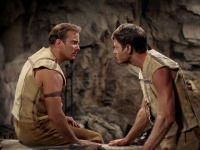
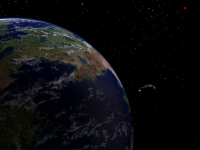
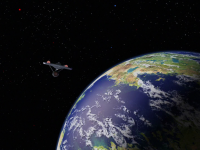
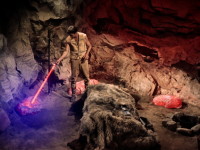
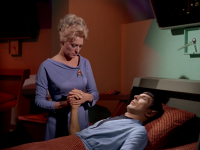
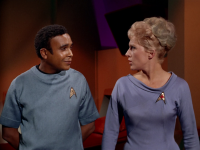
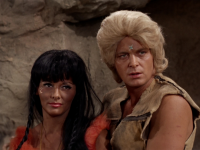
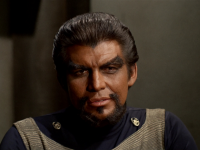
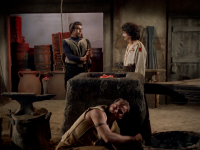
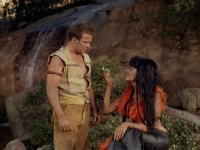
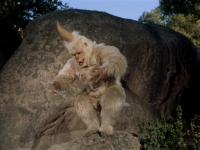
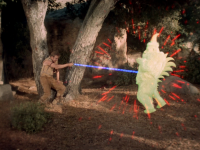
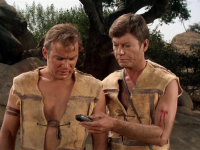
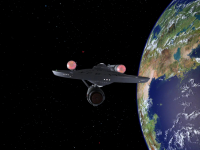
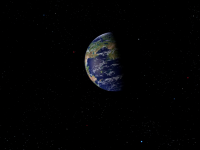
Star Trek TOS - 2x19 - A Private Little War
Originally Aired: 1968-2-2
Synopsis:
The Klingons provide arms to a peaceful planet and disrupt the balance of power. [Blu-ray] [DVD]
Filler Quotient:
2, filler, but an enjoyable episode nevertheless. You can skip this one, but you'd miss out on some fun.
- Despite the apparent cliffhanger at the end of the episode, none of the events depicted here are ever followed up on. As such, this episode can be regarded as filler. However, it's a great story and well worth a viewing.
Problems
- When McCoy fires his phaser to heat up rocks, the phaser fires without him pressing the trigger!
Factoids
None
Remarkable Scenes
- McCoy regarding Spock: "Lucky his heart is where his liver should be or he'd be dead right now."
- Kirk and McCoy attacked by a strange alien animal.
- Nurse Chapel holding Spock's hand, and then being informed that Spock probably knew she was doing that.
- Kirk: "We once were as you are. Spears and arrows. There came a time when our weapons grew faster than our wisdom and we almost destroyed ourselves. We learned from this to make a rule during all our travels never to cause the same to happen to other worlds, just as a man must grow in his own way and his own time."
- The revelation that the Klingons are feeding gradual technological improvements to the aliens in exchange for loyalty.
- Spock asking Nurse Chapel to hit Spock repeatedly and Scotty stopping her.
- McCoy debating the ethics of giving technology to more of the aliens with Kirk.
- Kirk fighting another one of those white-furred aliens.
- Nona stealing Kirk's phaser.
- Nona getting herself killed. What a moron.
- McCoy knelt over Nona's body watching in horror as Kirk and the hill people fight the villagers.
My Review
Yet another proxy war episode featuring the Federation and the Klingon Empire manipulating a primitive planet as a power play in their their everlasting cosmic cold war. However unlike The Trouble With Tribbles and Friday's Child, neither of which very deeply explored the issue, and unlike Errand of Mercy whose exploration of the issue was cut short by interference from godlike aliens, A Private Little War is perhaps the most poignant exploration so far of the terrible impact a proxy war can have on the subjects of said manipulation.
Right from the beginning this episode is packed with great pacing and effective drama. Spock is badly wounded and there are Klingons in orbit! Kirk must focus on maneuvering the ship out of view of the enemy without knowing if his friend will live or die. As the episode moves forward, it makes it clear in no uncertain terms that it's a satire of conflicts like the Korean War and the Vietnam War, as a direct reference to such conflicts is made in the terrific ethical debate between Kirk and McCoy. The two characters wrestling with their morality is the centerpiece of the story, a rare treat afforded by the conspicuous but amusing incapacitation of Spock early on.
By taking Spock out of the picture at the beginning of the episode, the story was able to explore unusual character dynamics such as the oft-neglected plot thread involving Chapel's unrequited love for Spock while giving McCoy a chance to spend some quality time being Kirk's wingman in Spock's place for a change. McCoy's unique and highly emotive perspective on the issue served as a wonderful contrast to Spock's typically cold, logical analysis. This time Kirk gets to play Spock's role by making the logical argument for escalating the conflict while McCoy gets to play the idealist, instead making a principled argument against arming less advanced civilizations.
Accompanying the great ethical debate are a few nice, smaller details that certainly enhance the story's overall effectiveness, such as the inclusion of the hostile alien animal that attacked Kirk, along with the fact that Kirk's injury seriously incapacitated him in a way not usually seen among the lead characters. I also enjoyed Kirk's fretting over whether or not the Klingons had broken the treaty they signed in Errand of Mercy as well as the quirky form of medicine that was required to heal Spock. The scene where McCoy sarcastically(?) accuses Kirk of being under the influence of some kind of mind control induced by the roots used to heal him based on the local superstition was also a nice touch.
As usual there are imperfections though. While the hostile alien animal was delightfully alien, the intelligent inhabitants of the planet once again looked exactly like humans. Also, Spock's curious tendency to make biblical references reared its ugly head once again and the conspicuous presence of a doctor who just so happened to be an expert on Vulcan physiology was a bit too convenient. However, the most annoying detail was the inability of the Klingons to detect the Enterprise in orbit despite the clear ability of the Enterprise to monitor the Klingons the entire time. I'm at a loss to understand why this tactical advantage wasn't exploited more readily by the Enterprise.
The ending is perhaps the most notable aspect of the story though. In an unusual twist, there is very little closure to this story despite no indication that this apparent cliffhanger will ever be picked up on again. Kirk resigns himself to arming "his" side in this proxy war with advancements equal to those given to the other side by the Klingons; with the plot clearly implying that this will soon develop into an arms race without an obvious end in sight. In short, our heroes have failed. And that's the story. The ending is bold, but in this case I think a better story would have featured more closure or at least the promise of a further installment. Nevertheless, as written it's still a great story.
The following are comments submitted by my readers.
- From rhea on 2008-04-27 at 10:17pm:
in this episode, the Vulcan Healing Trance was established (factoid) - From Scott Hearon on 2014-04-09 at 1:47am:
I think this is the episode where TOS's collective shortcomings, as seen in hindsight, are starting to get to me.
The basic premise and even many of the situations are very thoughtful and put together well. However, I think I'm just growing weary of extremely weak dialogue, acting, and shoddy costumes. It's a good thing that Nancy Kovacks is so incredibly hot, since that was the only thing slightly distracting me from that hideous orange fur drapes around her neck and shoulders. And those blonde wigs? Horrendous.
Yes, I have to concede that the allegory to the Cold War is interesting and the ethical questions are still relevant. But honestly, that's not really what I'm looking for from science fiction, especially not 25 years after the Cold War has ended. The most science fiction part of this episode was Spock's alien physiology as his body repaired itself. There's something fascinatingly Zen-like about it that I feel could have been explored more, though probably not in this episode, as it clearly had no place.
I just hope that some of the next few episodes I check out are a little more like Amok Time or The Doomsday Machine, rather than this one.

Star Trek TAS - 2x06 - The Counter-Clock Incident
Originally Aired: 1974-10-12
Synopsis:
A hyper accelerated alien ship drags the Enterprise into a nova and both arrive in an antimatter universe where time flows backwards. [Blu-ray] [DVD]
Problems
- Sarah April claimed to be the first doctor on board a ship with warp drive. This is simply untrue. She's not old enough. Besides, the SS Bonaventure was established in a previous episode as the "first ship with warp drive," which also is not entirely correct. So her statement contradicts multiple conflicting episodes!
- How could Sarah's flower have rejuvenated so completely? Did the pedals which fell off fly back onto the plant or did it grow new ones or something?
- Among the numerous nonsensical qualities of the alternate universe, how can a woman give birth to an old man? A baby weighing less than 10lb is already painful enough. How would she give birth to a 100lb+ person?
- According to the map of the galaxy shown in this episode, the Enterprise traveled an impossible distance in mere minutes or hours.
- Why did the clothes of the crew members shrink with them as they became younger?
- Once again the transporter is a miracle cure for aging...
- Why would Robert and Sarah April choose to go back to being old?
Factoids
- This episode is a candidate for my "Worst Episode of TAS Award."
- This episode establishes that Robert April was the first captain of the Enterprise and that Sarah April was the first doctor of the Enterprise.
- This is one of many episodes to mention Babel but never actually go there.
- The Enterprise sets a speed record in this episode, traveling at warp 22+! Though not under its own power.
Remarkable Scenes
- The Enterprise crew growing younger.
My Review
A universe where time flows backwards is interesting, but the implementation in this episode is extremely poor. There are a number of logical and technical problems, some of the major of which I've documented in the problems section. Most interesting is the ship's crew growing younger, with Robert and Sarah April being given a chance to reprise their positions on the Enterprise. Once again the transporter becomes the miracle cure for an age related problem. Finally, I really don't understand Robert and Sarah April's decision not to remain young. Did they really want to die decades sooner than they had to? A totally unfit end to a series which never really found its way.
The following are comments submitted by my readers.
- From MarkMcC on 2008-12-01 at 3:24am:
Regarding giving birth to a 100+lb person, I guess people in that universe start off dead, spring to life as an old person and gradually get younger. Then when they're close to death (as an infant) they pop back up into their mother's womb and die when the egg defertilizes?
This is followed by the person's parents having backwards sex - it's probably best not to think too hard about how that works in practice!

Star Trek TNG - 2x14 - The Icarus Factor
Originally Aired: 1989-4-24
Synopsis:
Riker is reunited with his estranged father. [DVD]
Problems
- Riker's father at one point mentions falsely that this is the first time Riker has been offered a command.
Factoids
- This episode establishes that the Federation had an armed conflict with the Tholians 12 years ago.
- 2nd time (at least) Riker refuses a command on screen.
Remarkable Scenes
- Worf yelling at Wesley.
- Data exploring Wesley's curiosity about Worf.
- Worf to Data: "With... all due respect... BE GONE! ...sir."
- Pulaski regarding Kyle Riker: "Did he ever tell you why he never remarried?" Riker: "What woman would have him with an ego like that?" Pulaski: "I would have, in a cold minute."
- Picard "crudely" spelling out Riker's choices to him.
- Data to O'Brien: "If I were not a consummate professional and an android, I would find this entire procedure insulting."
- O'Brien: "That's right. The animal's head exploded [literally from the pain]."
- Troi's discussion of barbarism with Pulaski.
My Review
The game Riker played with his father was silly and the resolution of their problems was hastened too much. I also don't like how no real reason was given for Riker's last minute refusal of command. Not that I wanted to see him go, but the whole episode just seemed to end abruptly. I do like, however, how one episode after Riker bitched about his father to Pulaski, there's an episode involving him. I wonder if Pulaski blew the whistle on him. ;) On the other hand, the events leading up to Worf's "celebration" of his right of ascension nicely made up for the silly father/son adversarial plot.
The following are comments submitted by my readers.
- From DSOmo on 2007-06-27 at 8:34am:
- Picard and Riker are both fascinated with the fact that the first officer of the Aries can speak forty languages (and it is an amazing feat). But who really needs to speak multiple languages anymore? The Universal Translator takes care of that, right?
- At the very end of the episode, Wesley says, "Breaking synchronous orbit." But the shot of the Enterprise just before, shows the ship moving in one direction and the planet in an other. - From Rob on 2008-04-13 at 8:40pm:
I would disagree only with your placing the statement that Riker's father wrongly states this is Will's first offer of command under "Problems". Rather, I think it could be placed under "Factoids" as we already know that Will hasn't spoken to his father in quite some time. The point that Kyle doesn't know that Will has already turned down a command promotion by this point speaks to this estrangement (not that I think this wasn't just a writer's error, but still....) - From Keen on 2009-07-17 at 7:50pm:
It was also mentioned in the episode: "Time Squared" that the Federation shuttle craft does not have warp drive. - From rpeh on 2010-08-25 at 4:41pm:
Your review hits the nail on the head here. Riker vs Riker was boring, although Anbo-jyutsu is worth mentioning as one of the three most stupid ideas any TNG writer had. The Worf B-story was much more interesting, and it was nicely done. I'd have preferred it if his friends had been wielding the pain sticks themselves, but I suppose that wasn't likely given how shocking it was.
I'll give the Riker plot 2 and the Worf plot 7. Minus 1 for Anbo-jyutsu and averaged, makes a 4. - From James on 2011-03-27 at 5:57pm:
Almost nothing happens in the episode. It's extremely boring. Probably the funniest part is the joust game: the outfits and set design are unbelievably bad, and I love the way it's introduced as "the ultimate evolution in the martial arts". It's funny that this aired just a few months before American Gladiator started. - From CAlexander on 2011-04-05 at 1:54pm:
Oh God, not Anbo-jutsu! It wouldn't be so bad if they didn't have to declare it to be "the ultimate evolution of the martial arts". I still feel compelled to mock that every time I see it.
In general, the main plot about Riker and his father had its heart in the right place, but I thought the execution was too hokey to take seriously. I liked the little B plot about Worf, though.
- From Inga on 2012-01-02 at 1:52pm:
I agree with others so I won't repeat the points mentioned.
I'd like to add a point of my own that I don't like the conversation between Troi and Pulaski. "Despite human evolution there are still some traits that are endemic to gender." Then the bit about father-son relationship, and lastly "It's almost as if they never really grow up at all." What? Am I the only one who finds this insulting to men? I thought people of the 24th century got over the 'men are hunters and women are homemakers' idea. - From Bronn on 2015-03-13 at 5:57am:
Eh, I actually like this episode for the most part. Though your point about the resolution for Riker is well-said-he just decides, off screen, that he's not going to accept the command. Then boom, off we go.
The Anbu-Jitsu game was unintentionally hilarious. Riker's dad calls it "The ultimate evolution in Martial Arts," which is something that you'd only hear in a farce. Yet it's played completely seriously in a way only Star Trek can. But there's a hint of subtlety tied in: during Worf's ceremony, Data mentioned that it's important for warriors to state their deepest emotions under extreme duress. Then Riker and his father start shouting their deepest emotions during their match, which connects the resolution of the two plots.
Things I really liked:
-The connection between the two plots, and how the family issues of Worf and Riker share similarities, despite their extremely different backgrounds
-I love seeing early O'Brien, just as a reminder that the writers maintained a quality B-cast. Colm Meany just shines in any little scene he's in.
-I actually liked the conversation between Pulaski and Troi. There was a subtle connection between Crusher and Troi since they each shared a history with the Captain and First Officer, respectively, but it was seldom remarked. This helped establish a connection between Pulaski and Troi that really helped Pulaski's character. However...
Things I didn't like
-The gender-bashing during said conversation. Though if you look at Troi's relationship with her mother, it really echoes many of the things she says about fathers (always seeing their children as young, trying to control too much-does that sound like Lwaxana at all?)
-The interpretation of events at the beginning. Wesley is babbling away at someone who is clearly thinking about something else, and the fact that Worf tells him to go away is taken as a sign that Worf has a problem. To me, the way Wesley was chattering DEMANDED someone tell him to shut up, but of course, it's Wesley Wonder-Boy, so he was right. Speaking of which, with all this talk of family, how come the fact that Wesley is separated from his mother and also lost his father not even an element this episode? It would have made for a nice subtext, but seems a missed opportunity.
-The cause of the rift between father and son. Will says, "It should have been you who died!" but he didn't ever know his mother. We never learn how she died. His father says that Will was all that kept him going, but then he apparently abandoned Will when he was 15-how do those two ideas connect? There is some information missing, which is regrettable because this season offered a lot of teasers about Riker's relationship with his father (in "A matter of Honor" and in "Time Squared.") - From Azalea Jane on 2021-07-18 at 8:28pm:
I enjoyed this episode more than I expected to this time. There's nothing huge in terms of major plot points, conflicts, or life-threatening danger, but instead we get a sort-of cross section into the personal lives of the crew and more mundane ship operation. It's nice to have these lower-stakes episodes to give some breathing room and character development. And of course, character development is what helps make us care what happens to these people in the first place. A plot is only as good as its characters, and if you don't care about the people, you generally don't care about the plot. I think Riker's relationship with his old man explains lot about him, and Pulaski's relationship with his father adds depth to their relationship, as well as between Pulaski and Troi.
I agree with some of the other commenters that the ending was rushed. That is often the case with TNG. At least we got some O'Brien!
I like Troi in the scene with Kyle Riker, calling him down. It's a great example of her ability to be incisive, firm, and yet gentle. Troi is so tragic in how often she's underutilized or poorly written. But to me she's in great form here.
I'd totally forgotten the plot point of Pulaski's history with the elder Riker. I'll admit, I kind of like Pulaski in this episode. It's all a bit soap opera-y, but she still has something unique to do, a unique take. She doesn't feel shoehorned in, as with so many other episodes in season 2.
Though they don't use the term, I like the "chosen family" theme. A lot of the main cast have fraught relationships to family. Worf is an orphan, with only his human adoptive parents on earth, who know next to nothing of Klingon culture. Data, as far as he can tell, is effectively orphaned as well (his brother quite estranged), and Wes' father is dead. And of course, as we see, some others on the crew have fraught relationships with their family. Many folks are forced to find new family, and that is a valid kind of family to have.
As others have pointed out, Troi's and Pulaski's conversation about gender felt rather reductive, especially for the 24th century. Pulaski's comment about the Klingon rite being barbaric is pretty culturally insensitive of her too. I also disagree with both women in this scene about "barbarism." The Riker boys needed a way to dig down to what they were feeling, and sometimes a good spar is exactly what you need. (For what it's worth, the screenwriters of this episode were men. Who knows why they wrote such an unflattering conversation about their own gender.)
"Perhaps that's part of their charm, and why we find them so attractive." Speak for yourself, Deanna! Some of us ladies don't find men appealing at all. :) And plenty of straight or bi women are NOT attracted to the same qualities in men.
Final thought... who was that cute bartender in Ten Forward????? ????

Star Trek TNG - 5x10 - New Ground
Originally Aired: 1992-1-6
Synopsis:
Worf receives a visit from his son Alexander. [DVD]
Problems
- The soliton wave is said to have 98% efficiency, 450% more than the Enterprise warp drive. This would give the warp drive an efficiency of about 20%. This is a problem because in previous episodes, Geordi has made claims to the warp drive having efficiencies in the 90th percentile. Maybe he was referring to some other part of the engine that does energy conversions...
- How could the soliton wave be increasing in energy as it traveled? Where the hell was all that extra energy coming from?
Factoids
None
Remarkable Scenes
- Geordi's enthusiasm coupled with Data and Worf's sterile reactions.
- Worf's adoptive mother making a case to Worf to take back Alexander.
- Ms. Kyle interrupting Worf. Then Dr. Crusher interrupting Worf.
- Troi coercing Worf into getting more involved with the school.
- Worf's reaction to Alexander stealing.
- Worf's discussion about honor with Alexander.
- Worf discussing the incident with Troi.
- The test ship exploding.
- Worf silently proud of his son for defeating his training program.
- Troi carefully trying to convince Worf to embrace his son instead of send him away again.
- Worf and Riker attempting to save Alexander.
- Worf lifting the beam by himself.
My Review
I found the plot regarding Worf and his son vastly more interesting than the soliton wave. Mostly because the soliton wave involved quite a bit of bad science and just seemed a ridiculous concept. Yeah, warp without warp drive. Very cool. But I could tell the whole idea would flop from the beginning. Conversely, Worf's son's issues were interesting. Seems history is repeating itself and Alexander will grow up without a real family and end up being another truly unique Klingon. I like the way the two problems of the story are woven together in the end. It makes Worf's rescue attempt so much more vigorous and exciting to watch. An overall decent and memorable episode.
The following are comments submitted by my readers.
- From Pete Miller on 2006-04-16 at 2:58am:
For some reason, I took quite a liking to the endangered species that Riker saved - From Orion Pimpdaddy on 2006-05-15 at 1:55am:
There is always a risk of bringing kid actors onto the screen. You never know how they are going to perform. For this episode I believe Worf's son was played well. The dialog between him and his dad was believable. Troi also has something to do in this episode. The conversation she has with Worf about the true reasons behind Worf's problems with his son is one of Troi's best speeches in the series. It is always a plus to see her do something involving because her character just seems tacked on to the episodes sometimes, with no real purpose.
The rest of the plot falls into the "We are helping a scientist try an experiment and it is working, but oh no, wait, something is wrong" cycle of writing. The fire at the end was a good piece of work, but it is hard to believe Alexander would survive after having metal fall onto him.
New Ground deserves a 6. It is well executed, but there is not much excitement. It is what it is. - From DSOmo on 2007-09-10 at 8:14am:
- Several shots near the beginning of the episode show the Enterprise in orbit around the planet that serves as the origin point for the soliton wave experiment. It's the same footage used for Galorndon Core in the episode "The Enemy." I find it odd that sequences aren't reused when they could be. When revisiting Galorndon Core in "Unification II," the Enterprise flies around a completely different colored planet!
- Alexander's schoolteacher seems to have marital problems. When Worf refers to her, he calls her "Miss Kyle," but when Troi refers to her, Troi calls her "Mrs. Kyle." (I see in the Remarkable Scenes section above, "Ms. Kyle" is used) ;)
- Early in the show, Geordi raves about the soliton wave as a great improvement. He says that the soliton wave will allow ships to travel at warp speeds without bulky warp drives. Later, the head scientist of the project explains that a group of warp coils on a planet will generate the wave, which will push the test ship to the destination where another group of coils will dissipate the wave. How is this an improvement? What happens if you want to change course in the middle of the trip? How do you reach a destination "where no one has gone before"? On second thought, the better question is, How do you stop once you reach the place where no one has gone before? In addition, the soliton wave emits a great deal of subspace interference. To monitor the test ship's telemetry, the Enterprise must stay within twenty kilometers. In other words, without futher improvement, any ship traveling in a soliton wave won't be able to communicate with any ship more than twenty kilometers away!
- When Geordi recommends flying through the soliton wave to get in front of it, Picard asks why they can't fly around it. Data responds that the wave has increased in size and there isn't time to fly around it! Yet when a space scene shows the Enterprise chasing the soliton wave, the wave looks very flat. It sure looks like the Enterprise could just fly over it! - From Krs321 on 2009-08-31 at 5:15pm:
"Early in the show, Geordi raves about the soliton wave as a great improvement. He says that the soliton wave will allow ships to travel at warp speeds without bulky warp drives. Later, the head scientist of the project explains that a group of warp coils on a planet will generate the wave, which will push the test ship to the destination where another group of coils will dissipate the wave. How is this an improvement? What happens if you want to change course in the middle of the trip? How do you reach a destination "where no one has gone before"? On second thought, the better question is, How do you stop once you reach the place where no one has gone before? In addition, the soliton wave emits a great deal of subspace interference. To monitor the test ship's telemetry, the Enterprise must stay within twenty kilometers. In other words, without futher improvement, any ship traveling in a soliton wave won't be able to communicate with any ship more than twenty kilometers away!"
I considered this problem while watching the episode. I think the explanation would be that they are simply testing the theory that A) soliton waves could be created/harnessed and B) that they would actually propel a spacecraft. I don't think the experiment was to be a finished propulsion system.
- From Mitch89 on 2013-03-24 at 9:36pm:
My favourite scene from this episode is at the very beginning, where Geordi likens witnessing the soliton wave test as a moment in history, equivalent to witnessing Cochrane engage the first warp drive. Little does he know in the future, he will be at that moment too! - From Rick on 2013-11-26 at 5:55pm:
reviewer:
look at your problem from the reverse angle: 98% means 2% loss in the energy transfer. 4.5 times the loss of energy in the transfer would mean the enterprise operates at 91% energy transfer which is right around where you think it should be. hope that helps - From Dstyle on 2016-09-16 at 6:01pm:
Worf's meeting with Picard is interrupted twice: first by Ms. Kyle and then, moments later, by Dr. Crusher. Worf looks annoyed, but seriously, when you think about the communicators for a second, wouldn't this happen all the time? How is it that the person on the receiving end of your communication just so happens to never be in the middle of an important conversation? Especially the senior level folks, you'd think they'd be getting interrupted all the time by the officers under them.

Star Trek XII: Star Trek Into Darkness
Originally Aired: 2013-5-15
Synopsis:
When terrorist attacks strike London and San Francisco, Captain Kirk is sent on a mission to bring the alleged terrorist to justice. But when things don't go according to plan, Kirk begins to wonder what the true motives behind his orders are.
Problems
- Spock claims that Kirk shouldn't save him from the volcano because it would violate the Prime Directive. But Spock's entire intervention to save the natives from the volcano is itself a violation of the Prime Directive!
- Nothing in the altered timeline satisfactorily explains why Khan's ethnicity so radically changed.
- At one point Kirk says that since the Enterprise is at warp, the Vengeance can't catch up with them as a general principle, however that entire notion contradicts a whole host of prior episodes which have often depicted ships chasing each other at warp speed.
- Travel time between Qo'noS and Earth was way too short. They're at warp for all of a few minutes at most and then suddenly they drop out of warp only 237,000 kilometers from Earth!
Factoids
- Technically the title of this film is just Star Trek Into Darkness, but I have prepended the "Star Trek [MovieNumber]" format to maintain consistency with the other films.
- The title of the film was an attempt to be clever by making "Star Trek" a verb rather than a noun, so as to "trek into darkness."
- Peter Weller, who plays Admiral Marcus in this film, also played John Frederick Paxton in Ent: Demons and Ent: Terra Prime.
- Christopher Doohan, the son of James Doohan (the original actor for Scotty), shares a scene with the new Scotty (Simon Pegg), appearing beside him as a transporter chief.
- The set for the warp core is not a set but an actual experimental nuclear fusion reactor at The National Ignition Facility.
- According to Spock, a five year mission has never been attempted before.
- According to Carol Marcus, Kirk had a brief relationship with Nurse Chapel, but Kirk didn't even remember her name!
Remarkable Scenes
- Kirk and Spock retreating to an underwater Enterprise on the pre-warp planet.
- The Enterprise revealing itself to the natives in order to rescue Spock just as Spock completes his work rendering the volcano inert.
- Kirk to Spock upon being informed that he violated the Prime Directive: "Oh come on, Spock. They saw us. Big deal!"
- Kirk gushing to Spock about the possibility of being selected for the spiffy new "five year mission."
- Pike regarding Kirk: "You think you're infallible. You think you can't make a mistake. It's a pattern with you. The rules are for other people. And what's worse is you're using blind luck to justify your playing god."
- Pike's death.
- Spock: "There is no Starfleet regulation that condemns a man to die without a trial, something you and Admiral Marcus are forgetting. Also, preemptively firing torpedoes at the Klingons' home world..."
- Scotty: "This is clearly a military operation. Is that what we are now? Because I thought we were explorers."
- Kirk to Chekov: "You're my new chief. Now put on a red shirt." Chekov, with a look of terror on his face: "Aye captain..."
- Kirk making a snap decision not to use the special torpedoes to assassinate Harrison but instead to attempt a risky landing on Qo'noS to apprehend Harrison to satisfy due process.
- Kirk ordering his lieutenants to remove their red shirts, perhaps in the hope that will increase their odds of survival? ;)
- Spock revealing that he mind melded with Pike so that he could experience death vicariously.
- The Klingons ambushing the landing party.
- Harrison saving the landing party and then surrendering to them upon learning of the exact size of their arsenal.
- Kirk attempting to beat up Harrison only to fail to even leave a mark after multiple blows.
- Harrison revealing his true identity as Khan and outing Admiral Marcus' secret plans.
- Admiral Marcus attacking the Enterprise with the Vengeance.
- Scotty sabotaging the Vengeance.
- Kirk and Khan jumping from the Enterprise to the Vengeance.
- Young Spock calling old Spock to get advice about Khan.
- McCoy: "Damn it man, I'm a doctor, not a torpedo technician!" Count 38 for "I'm a doctor, not a (blah)" style lines, which McCoy was famous for.
- Khan taking out Admiral Marcus, taking over the Vengeance, and demanding his crew returned to him.
- Spock beaming armed torpedoes to the Vengeance and detonating them.
- The Enterprise falling to Earth.
- The seat belts appearing on the bridge. If only they'd had those in a few of the other 700 or so hours of Star Trek. ;)
- The gravity shifting all over the ship as it falls to Earth.
- Kirk: "You used what he wanted against him. That's a nice move." Spock: "It is what you would have done." Kirk, regarding saving the ship by exposing himself to radiation: "And this is what you would have done. It was only logical."
- Spock: "Khan!!!"
- The Vengeance crashing into San Francisco.
- A year later, Kirk retaking command of the Enterprise and embarking on the five year mission that he had hoped would be assigned to him originally.
My Review
The sequel to Star Trek XI's reboot corrects some of the prior film's sins, repeats others, and commits some new ones in the process. The biggest improvement was the hyperactive pace of the previous film being toned down a bit. This gave the film time to flesh out Kirk's and Spock's altered characters a bit more, doing much to set them apart from their counterparts in the original universe. Minor characters get more appropriate things to do too. The acting performances of Sulu and especially Chekov annoyed me last time around, but no longer. Probably the best minor character moment was Scotty objecting to classified weaponry on the Enterprise on the grounds of possible unintended technical consequences. Was he just jealous about the loss of control, or did he sincerely believe his caution to be warranted? Both the writing and the actor leave that open to interpretation, which I liked. The most important improvement from last time around is this film provides more texture for how Kirk went from cadet to fully commissioned officer with the rank of captain in one day. We already knew from the previous film that Admiral Pike made Kirk into a sort of pet, but here we're presented with a much more nuanced take on their relationship, which establishes the idea that Kirk's rapid rise through the ranks has been unconventional, controversial, and difficult for Pike to continue to justify. At the beginning of the film, Pike has had enough and finally resorts to threatening to demote Kirk all the way back to cadet. These scenes do much to establish the credibility that was lacking the previous film's plot, though in my view they don't go quite far enough.
While this film corrected the main issues with the previous film's character writing, it repeats most of the previous film's other missteps. First and foremost, we still have no on-screen evidence one way or the other as to whether this new universe exists apart from the old one or supersedes it. Also Scotty's magic transporter formula continues to defy my suspension of disbelief. As Emory Erickson stated in Ent: Daedalus, if it were possible to reliably beam people from one planetary system to another several light years away, then why have starships? Khan beaming directly from Earth to the Klingon home world was completely absurd. Likewise, the film once again had difficulty accurately portraying the speed of warp drive, with total travel time at warp speed between Earth and the Klingon home world apparently lasting only minutes. And just like the last film, this film is as sloppy with continuity as it is with its future tech. Admiral Marcus' involvement in Section 31 was a pathetic writing blunder compared to the smooth operation that Sloan ran on DS9, as it's stated that Admiral Marcus was motivated solely by the desire to establish a military-industrial complex. As such, there was no reason to tell Kirk about Section 31's existence at all, as Admiral Marcus could have satisfied his objectives without disclosing that detail. Likewise, it seems nobody on the Enterprise had ever cracked open a history book on the Eugenics Wars, or they'd have known precisely who Khan was well before it was necessary for Old Spock to educate his younger self on the matter.
What's worse, this film commits a striking new sin: it's considerably more unoriginal. For starters, the quickly chewed up and forgotten pre-warp civilization's portrayal at the beginning of the film strongly resembled the similar one in Star Trek IX: Insurrection. But more obviously, the vast majority of this film was a blatant rehash of Star Trek II: The Wrath of Khan. While it was nice to see Carol Marcus in a strikingly different role and it was also nice to see the new character of Admiral Marcus overshadow Khan as the main villain for most of the film, those tweaks just weren't enough. The film just couldn't resist peppering itself endlessly with nostalgic references to its predecessor. Some were tasteful and clever, others were painful and tacky. Added together, the story isn't really much more than the sum of its parts: a more action-packed take on Wrath of Khan with a mildly interesting exploration of New Kirk's reckless youth as opposed to the much more interesting exploration of Old Kirk's decaying youth. Most of the film feels as though it's merely going through the motions of what a somewhat hollow but glitzy rehash of Wrath of Khan is supposed to look like. Even the title of the film doesn't seem to serve much of a purpose other than to simply sound cool. But that disappointing lack of depth, heart, and originality is by no means a showstopper. This film, just like the one it follows, is once again an undeniably fun action romp. It's just sad that these fun action romps must continue to come at the unnecessary expense of the intelligent storytelling and thoughtful embrace of the franchise's rich history that the series used to enjoy.
The following are comments submitted by my readers.
- From Bernard on 2013-05-17 at 11:05am:
Unfortunately I don't forgive some of the things that you do in order to give the film a pretty high rating. The fact that this film contained more than one moment that made me face palm myself and also a moment that made me laugh out loud when it was supposed to be a moment of drama says it all.
Shamelessly ripping off some parts of Star Trek II, this film does so with a heavy handedness that is obscene whilst seemingly patting itself on the back for tweaking some of the nuances slightly such as reversing characters. The writers seem to think this is clever... it is not.
There is a mish-mash of ideas that often culminate in a confused plot. Admiral Marcus is a good example. This guy poses more menace than Harrison and seems to be building to be the films major villain... but then he's not. Again, that's not clever and wastes time that could have been spent fleshing out Harrison's motivations and giving the brilliant Cumberbatch more screen time.
Some of the moments that were intended to grab you emotionally just fell flat. The scene where Harrison attacks Starfleet HQ for example just comes across as corny and the less said about the scene in engineering near the end the better. This is the type of thing that boosted up my opinion of 2009 (Vulcan being destroyed, George Kirk's sacrifice).
Into Darkness does do some of the things 2009 did equally well though. From the phenomenally sublime look, feel and effects of the movie to the raging soundtrack. From the stellar moments involving the Enterprise and also other fantastic set piece visuals this film feels even more spectacular than it's predeccesor. The character interaction between Kirk and Spock is also done consistantly throughout the film and it tells a good story between the two. So well done for that writers, but when I'm picking the bones trying to find good things to say it is not a good sign.
I can't be bothered to explain the lazy writing in this movie that causes me to make it a 0 rating (incidentally, I didn't give Star Trek 2009 a 0). But it has to have zero from me. It is ridiculous in parts, enjoyable but ridiculous. I felt like I was watching somebodies parody of Star Trek at points with Bones appearing simply to serve up gruff one liners, bizarre re-enactments of well loved scenes from STII, and lazy rehashing of a well loved adversary. I think most older Star Trek fans will surely only watch this movie to enjoy some of the better moments whilst laughing at it in equal measure.
When I commented on Star Trek 2009 I said it would be ok if they followed it by writing an ORIGINAL story that focused on building on the great foundation they had laid. Instead we get lazy writing that borders on parody whilst hammering us with visual after visual that whilst they may blow our mind are actually quite boring (anyone else get bored halfway through the scene where Harrison and Kirk are flying through space in space suits? That's boring to me, I don't want to watch a computer game... but unfortunately... the masses do and that's who they're trying to satisfy now and because it's working so well that's all we're going to get. - From Selador on 2013-05-18 at 5:53pm:
This is a hideous, hideous film. It is epitomized by the scene where Spock punches the "bad guy" in the face, over and over and over again. It is violent, mindless and is everything Star Trek is supposed to not be.
The characterisation is awful. Neo-Kirk in horrible and unlovable, there wasn't a single scene where Spock wasn't emotional, Bones is an idiot and if it wasn't for Simon Pegg's brilliance the Scotty character wouldn't make any sense at all.
Throught the film there's an undertone of righteous, violent indignation. Neo-Kirk is constantly on the verge of beating people to a bloody pulp because he is idiotically convinced that he is the "good guy" and that everyone who disagrees with him deserves nothing but to be contemptibly and repeatedly punched in the face. Everything he does seems to me to be justifying American imperialism - he feels it's fine to intervene and that the moral code doesn't apply to his actions since he is infallibly correct. Never before have I had this feeling when watching Star Trek - and I've seen all the films and series'.
I feel there's no need to go into detail about why the plot doesn't make sense since it's so obvious.
This film put me in a bad mood for about a week, I would recommend and anyone who actually likes Star Trek to avoid it at all costs, despite Kethinov's absurdly generous review. If you've seen the South Park episode where indecent things are done to Indiana Jones you will understand what watching this film is like.
Now, back to lovely DS9... - From dario on 2013-05-19 at 7:21am:
one problem you forgot to mention was the klingons had bumpy heads. while during this time their heads were smooth. - From Kethinov on 2013-05-19 at 12:58pm:
Enterprise's resolution of the Klingon forehead problem established that while it would take generations for the Augment DNA to no longer suppress Klingon forehead ridges, that some Klingon families may resort to plastic surgery in the mean time. As such, there is no reason to fault this film for displaying Klingons with ridges, just as there's no reason to fault Star Trek I: The Motion Picture for the same reason. - From Orion Pimpdaddy on 2013-05-19 at 8:07pm:
I literally just saw it about an hour ago, so I haven't formulated all my thoughts, but here's what I think so far:
I enjoyed the film a lot more than the previous one. Here's some reasons why:
-More homage is paid to the Enterprise itself. Let's face it, the Enterprise is the main character of the franchise. I was happy to see some wide shots of the ship while it was being still underwater and in the space dock. I don't seem to remember seeing the ship more than 2 seconds in the previous movie.
-This movie has more of that idealistic morality we Trekkers love. Throughout the film, the crew was trying to do the "right thing," like stopping a volcano, not participating in secret weapons, etc. I didn't sense any of that in the previous film.
-The part where new Spock contacts old Spock established that this Khan was pretty much the same Khan as before. Not some new Khan that was raised differently because of the new timeline. For some reason, I enjoy knowing this.
-There's no car going off a cliff.
-There's no cave where people bump into each other.
-It was cool to see the Klingon moon half destroyed, consistent with Star Trek VI.
That being said, the movie did some things it didn't need to do:
-The chemistry between Kirk and Spock doesn't seem to be there. They mention to each other they are close friends, but I just don't feel it. If anything, they seem like adversaries.
-Reproducing scenes from the Wrath of Khan was a bad choice. When Spock screamed “Kahn!” I instantly thought of the Darth Vader “nooooo!” part in Star Wars Episode III. I'm telling you right now, that part is going to be controversial for decades to come. The whole Kirk death scene itself had only about 10% of the emotion that the original Spock death scene. Once again, it's because the Kirk/Spock relationship doesn't seem to be there.
-The fistfight on top of the vehicles was ridiculous. Why is Spock the only one beaming down? How can they not get sucked off from the wind resistance? I can only imagine how many scenes like this Abrams is going to insert into Star Wars.
-Why remake the Klingon look? That face looked worse than the makeup job of the TNG era Klingons.
Problems:
-From what I remember, in the scene where Pike is dressing down Kirk for letting the natives see the ship, he was also mad about them trying to freeze the volcano. Why? Starfleet rescues civilizations all the time. For example, in TOS they were once trying to stop an asteroid from hitting a planet full of Indians. I know, it's a different timeline, but that aspect of Starfleet's mission should still be there.
-I was confused about why they needed Khan to come back to the ship alive in order to resurrect Kirk. All they needed to do is transfuse blood from one of Khan's frozen men.
Overall, I'm giving the film 6 out of 10. The best thing it did was make me forget about the first movie. - From Wes on 2013-05-19 at 8:56pm:
Kirk and Bones swam back to the ship. Spock was in the volcano.
I liked it much better than the first one as an adventure and the plot twists. This was entertaining. And it seems they are trying to be more entertaining than anything. Although, there were good classic Star Trek elements in this one.
The time to travel to "Kronos" was dumb. And what's with changing the spelling of the name of the Klingon home world to Kronos!? And yes, the rehash of Wrath of Khan elements was a little annoying (i.e. someone dying in engineering, yelling "KHAAAAAAAAAAAAAN!" and others). - From Wes on 2013-05-19 at 10:59pm:
Oh, I forgot.
I look at the title as more of a preface to where this franchise is headed--war with the Klingons and a more militarized Starfleet. I do look for superhuman Kirk going to war with the Klingons in the next movie. Get ready for a rehash of General Chang ;) - From Jem Hadar on 2013-05-22 at 2:29am:
I don't understand people who freak out over this film so much. It is a GREAT movie- this is a new generation of Star Trek, modernized- and I think some people are too stuck in the past. Yeah, it could have tackled "the issues" more- but that's not what this film was trying to do. I think the next movie in the series will have a more 'humanitarian' outlook, but for what this film was going for, it did a great job. I loved all the references to past Trek. The Nimoy cameo was fun, though the problem you pointed out was a sound one.
I loved the new Klingon look- the effects were top notch too. Cumberbatch did an excellent job as Khan. Scotty had some great scenes; it was nice to see him have an even bigger role this time around. The new Carol Marcus was really hot too, which was great. I will say, though, that the Spock "KHAN!" scream had me laughing, which I don't think was the intention.
I think the title of the film was perfect, and a good indicator of where the series is going. - From OmicronThetaDeltaPhi on 2013-05-30 at 8:31am:
Well, Jem Hadar, if expecting the franchise to retain at least an inkling of the optimism and moral values it held dear for 40 years is "being stuck in the past", then I am proud to declare myself as one of those who are stuck in the past.
I'm really sad to see how the Star Trek franchise has transformed into a mindless sci-fi action franchise. And for what? In order to make it "more popular". As if popularity has ever been a measure of quality.
Into Darkness indeed. - From Abigail on 2013-06-04 at 7:44pm:
My main thought about the movie (and this is not especially deep or thoughtful) was that 99% of the plot happened in the first hour and fifteen minutes. Then I watched people jump around on rooftops, fire phasers, and punch each other for the next forty-five minutes. Sorry, but that got pretty boring. That's not really "Star Trek" to me; I need some substance!
I do give them credit for the great special effects, though. I saw it in 3D, which made it particularly fun to view. - From Pete Oliva on 2013-09-16 at 3:08am:
It just always bugged me how Khan's ethinc background changed. I know the new actor is British, but still, for continuity's sake, it stinks. His ethnicity wouldn't have been altered by the timeline fork. - From Rob UK on 2013-09-17 at 8:13am:
Well where to start??
I just watched this for the third time to try and make some sense of it and do you know what i just realised? Obviously you all don't so here goes.
This is the plot and storyline from that ultra cheesy movie of the 90's The Demolition Man with Stallone (whole Enterprise), except shot in a I-phone store and some cgi thrown in, let me explain.
Future benevolent society ruler afraid of the unknown wakes up cryo frozen 'weapon' to use their powers for his own gain, everything backfires and our hero must save the day joining forces with the 'bad guys' to defeat the real enemy the benevolent leader! lame on so many levels, not even starting on all the swearing, the emotions from Spock acknowledging that his human side even affects him, i could go on and on, this is not the Star Trek standards I have come to expect by a long way, it is a nice cgi movie which I was amazed to find the second half was not directed by Michael Bay.
So am i right in thinking (judging by what we have seen so far) that this is the remake of Star Trek II, the last movie ingeniously titled 09(instantly dating it lol,imagine Star Trek the Movie was called Star Trek 1980, it certainly would not still be being watched now) was the new version of Star Trek the Movie and they are now just gonna churn out a remake of each movie rather than advanced the Star trek universe we have been drip fed the evolution of over the last 30 years? very lame, don't think i'll even torrent them lol.
What happens after the Dominion war, Cisco's evolution to join the profits how did this affect B'jor and the whole sector, what about the Mirror mirror lot who seemed to have almost found a permanent way through to our side, trade with the ferengi?????? Holograms rights????? Lame Lame lame lame so dissapointed - From Rob UK on 2013-09-19 at 6:04am:
I think we should all start a fan petition to get some directors and some backing on the continuation of 'our' Star Trek Universe, they could run in parallel just like alternate universes reality theory. One could continue in the world we know and love and the other could churn out sci fi cgi flicks and dumbed down action orientated remakes for the ADHD generation. - From BrentNorth on 2013-12-15 at 3:41am:
There is a potentially decent Star Trek film lurking somewhere here, trying to get out, a post-modern story about terrorism and militarism. But it is overwhelmed but the brutally clumsy attempts at Wrath of Khan nostalgia.
Star Trek is supposed to be about new frontiers of exploration and thought, not cheap imitations of what has already been done. For that reason, I am at least partly of a mind to rank Star Trek V: The Final Frontier above Into Darkness. V may be a terrible film, but its concept is at least worthwhile in theory.
On a specific note, the portions of this film that relate to "Khan" constitute an unforgivable sin in my book (and were completely unnecessary). I have rarely if ever watched anything so excruciatingly cringe worthy. Whoever was responsible for the creative decisions behind those parts should have his/her Star Trek license immediately and permanently revoked. - From Rob UK on 2014-02-17 at 8:48pm:
I have always loved my Trek fix ever since i was a kid, i am oddly amused at how mentally affected i am that 'they' (the Star Trek PTB)are not continuing the tale telling in regards to the STU as of Stardate 2373 when Voyager got home and after DS9 kicked Dominion ass, so much to work with (please see my above rantings on Cisco the profit and more lol).
It is the same type of mind torment all the original fans must have went through between the end of TOS and the Star Trek movies of the 80's, anyway we eventually arrive to my point in writing
http://www.startrekcontinues.com/episodes/
If you are a fan of TOS and you never wanted it to end with Turnabout Intruder s03e24 then you would be crazy not to follow the link i just posted (webmaster permitting of course), I only just found the show a couple of weeks back and they've got my interest hanging on for ep3 coming soon. - From Kevin on 2014-06-07 at 2:27am:
I tried to like it, and honestly bit here and there were good. Good visuals and music and pacing. But the story and all of the silly moments and things that made no sense took over and I realized it was simply a crappy big budged action movie, with no care taken to make a quality movie.
None of these complaints have ANYTHING to do with liking or not liking old star trek.
It was simply a lame, and lazily written movie, that nobody read the scrip and thought, wow this does not make sense.
There are literally about 4 dozen really noticeable plot issues. Things that just do not add up. It was as if they were trying make scenes simply to get to the next action part.
Really squandered their chance to make a quality lasting movie. Instead they took the easy, lazy and silly way out. A comic book parody of Star Trke, and a really not well thought out movie on its own.
Bad not only as star trek, but bad as a movie in general. - From Kelly on 2014-06-07 at 11:07pm:
Really not sure what to say. I get why some like it sort of. But to me as a woman, in my 30's it felt like I was totally the wrong audience. It was very juvenile feeling many times. The plot was not so much confusing, but silly and nonsensical. It seemed okay when I watched it, but later as I thought about it, so much made no sense. Decent acting and filming and all the technical stuff, but it needs someone to double check the science and the script. I rolled my eyes many times.It made me crinnge. I laughed at stuff that was supposed to be serious. That stuff with Spock and Uhura was beyond embarrassing, as was him yelling "Khan". Kirk is not a captain, but a teenager jock in space. Really a bit insulting to me as an adult. - From Bronn on 2014-11-26 at 6:46pm:
This film has many, many problems, which led to me scoring it a 2 (ST[2009] received a 6, Nemesis received a 1, and Final Frontier a 0, just for comparison). Before explaining the flaws that destroy this film, I'll start with what works well.
1) The visual effects are pretty stunning, and the visual style is actually an improvement on the flaws of the previous film. It has a futuristic style without the antiseptic look of the 2009 film (the same kind of problem the Star Wars prequels had, in which CG backgrounds had an unsettling fakeness about them) so it was easier to immerse. JJ Abrams also stopped with the lens flare nonsense.
2) The basic premise actually works for me. I don't mind Khan re-entering as a villain, and I don't mind that there's actually a secondary villain who is trying to steal control of Starfleet for the military-industrial complex. As a pair of plot devices, they work fine, and would have provided a fine story. Unfortunately, they failed to properly realize either plot.
3) The acting from the main cast is spot on. Chris Pine is extremely talented and believable, and I am a big fan of Quinto's abilities. Simon Pegg is nearly a show-stealer as Scotty, just as he was in the 2009 version. I also have no problems with Zoe Saldana as Uhura, even if she's a big intrusive at times.
Okay, now onto the problems.
The biggest failing of this film is the writing. The characters aren't believably written. We accepted the original Kirk and Spock as great friends because we saw that actively develop during their adventures together. We saw Spock nearly emotional at Kirk's fake death in "The Amok Time," and we realized there was an emotional bond there. However, at the end of Star Trek: 2009, this Kirk and Spock were closer to adversaries than friends-which is fine. They didn't HAVE to be friends, since this is a new universe; the writers could do whatever they wanted with this relationship. If they wanted to show them becoming friends, it would be something we could follow during the subsequent films.
That's not what happened, though. We're simply (and CONSTANTLY) told that these two are friends. I would accept that they've had plenty of off-screen adventures in which they've become close, even though it removes that interesting character development, except for what happens in the plot. It's clear that Spock and Kirk are very different people who don't even know each other that well. Kirk lies to Starfleet about their mission, and is surprised that Spock was completely truthful. How does he know so little about his friend that he simply assumes Spock will lie to keep him out of trouble? And if they're so close, why did Spock not anticipate Kirk's obfuscation? They have so little in common. It's like the writers simply went from "Well duh, they're Kirk and Spock, they HAVE to be best friends," and didn't bother actually portraying that.
Furthermore, Kirk's lie irritates me. It starts with ending the previous film with him as captain of the Enterprise when he's clearly got no experience or maturity and hasn't earned that post yet. I kept imagining Picard locking the door to his office and telling Chris Pine that "The first duty of any starfleet officer is to the truth!" It's not like violating the Prime Directive is automatic dismissal from Starfleet, since Picard and the original Kirk did so several times when they felt they had a moral imperative to act. Saving an entire civilization from catastrophic destruction should not be hard to justify. But Kirk just lied about it, and behaves like a spoiled brat when his lie is called out and he gets in trouble for it. Again, he thinks that saving Spock's life is sufficient to get Spock to lie on his behalf, even if lying (and especially a dishonorable cover-your-ass lie) goes against Spock's nature. It was very early on that this mischaracterization grated on me, and it continued through the rest of the film.
This poor characterization was even more deeply demonstrated during the mission to Qo'nos. Kirk asks Spock and Uhura, very frankly, if their personal issues are going to get in the way of the mission. They promise him that it won't, and he believes them because they're professionals, Starfleet officers, and one is a Vulcan to boot. I expect them, on a mission which is supposed to be serious (in which they could easily be killed) to actually get past personal issues, which were frankly fairly petty. I mean, Uhura's whining about the Vulcan she's dating refusing to share his feelings...seriously! And it happens almost as soon as the mission starts. I mean, not only is unprofessional, it's a bit childish. It makes me think of Battlestar Galactica (re-imagined), in which there were deeply flawed individuals who sometimes had severe personal conflicts, even open hatred, with people they worked with, but they were able to get past personal issues in life-or-death situations. Here we have Spock, of all people, drawn into an argument with his girlfriend on a life-or-death mission. It doesn't help reassure me that this junior crew, with an immature captain, is somehow still professional enough to get the job done.
I've rambled about the characters so much that I won't get into the plot very much, but let me say this: Why is it that the climax of the film has two starships blasting each other right next to the moon? I mean, are those the only two ships in starfleet? Why weren't other ships all over the place since they were literally minutes away from star fleet headquarters? They were closer to Starfleet headquarters than the freaking SHIPYARDS at Utopia Planetia. Yet somehow, nobody intervened, and both ships were completely at liberty to blast each without talking to anyone else. If nothing else, wouldn't Starfleet wonder why Marcus killed everyone on the Enterprise rather than have them face the law? Wouldn't other ships arrive to see if they could assist in the situation? Why is Spock able to send a subspace message to future Spock, but incapable of sending a message asking for help from other people in the vicinity of earth? I honestly don't know why this fight had to be near earth, except that they wanted Khan to threaten to destroy Starfleet headquarters at the end of it-would have made more sense if they'd been fighting near Qo'nos or anywhere OUTSIDE of the Federation, when these logical failures would not have existed. - From Axel on 2015-07-13 at 5:10am:
I wish it could just be a thing that all Star Trek movies have their own canon separate from the TV series. I mean, going all the way back to Star Trek I, The Motion Picture. For whatever reason, Star Trek films always seem to fail to capture what the TV shows got right. Maybe it's the fact that the films have to appeal to a wider audience. But the transition to the big screen has always been bad for Star Trek, IMO.
So obviously, I'm not a fan of most Star Trek films and this is one of the worst ever created. By now we've established that the Prime Directive exists solely for the purpose of being violated. We have JJ Abrams pretty much lifting portions of Wrath of Khan's script and not even trying to hide it. We have a ridiculously convoluted timeline in which Old Spock is warning Young Spock about Khan and who knows what else. We have Young Spock going over the deep end with his emotion time and time again. We have utter nonsense like this superblood and the ability of people to transport from one planet to another (maybe someone hacked the Iconians' program centuries before it was discovered?). But mainly what we have is something so far removed from the original concept of Star Trek that it barely justifies staying in the franchise. What was wrong with having the crew explore the galaxy and encounter some entirely new phenomenon or species that they must work together to address? I mean, it worked for three decades worth of TV shows now, didn't it?
I just couldn't enjoy it, despite the noble intentions behind the reboot and the stunning visual presentation. Then again, stunning CGI is no longer that big a deal in modern sci-fi, so oh well. The 2009 film was pretty good, but this just took a turn for the worse. Maybe we'll all live long enough to see the TNG reboot in 2037 and they will learn some lessons from this. - From Jadzia Guinan Smith on 2015-07-19 at 1:56am:
I’m not even getting into a detailed critique or bring up any specific issues. The whole thing just makes me sad.
@ Selador – I should’ve taken your advice and not watched this horrendous thing. @Jem Hadar, if being “modernized” means lacking any discernible moral center, then human civilization is in big trouble.
@Rob, yeah, I’d like to join your petition to continue into the future in the prime universe as well. In fact, I’d like not to even acknowledge this gawdawful new universe – meaning I want a prime universe where Romulus still exists (instead of having been needlessly and causally destroyed offstage)! I want this whole Nero idiocy to have happened in an entirely separate universe (not just an altered timeline). Maybe we can have a "reset" movie, where the JJ Abrams fiascos turn out to be a bad holonovel series by someone or other...
However, this is highly unlikely to happen. Given that the rebooted franchise has made more money than all of the offerings of our old beloved one, I doubt very seriously that anyone is going to heed our “petition” or our sentiments.
We have to accept that Star Trek, for better or worse, is now just another mindless action franchise meant only to churn out summer blockbusters. Gone is any attempt at philosophical depth. The old, cerebral and idealistic Star Trek I loved is now a thing of the past... something for Blue Ray box sets and Netflix streaming sessions, to be indulged in occasionally, like an old, worn copy of War and Peace.
The final frontier is closed. It’s over.
- From Axel on 2018-07-02 at 2:22am:
Despite their rebooted makeup/costume design making them appear more badass, the Klingons once again get completely smoked. This movie further supports my theory that the Klingons are the most overrated villains in all of Star Trek, supposedly a race of fierce warriors but in reality getting conveniently destroyed whenever they face humans. At least the Borg and Jem'Hadar win sometimes.
To me, this movie, like all of Abrams' ST movies, is a compromise. It collects all the names and labels familiar to old-school Trekkies-Kirk, Spock, Bones, Enterprise, Khan Singh-and throws them into the kind of visually thrilling, action-oriented movie that is typical of modern science-fiction. So, as a result, it did great at the box office. What it doesn't do is what Star Trek originally did: explore the galaxy while at the same time, exploring humanity, our issues and our ethical and moral dilemmas. It's not a thinking Trekkie's movie. It's a movie to watch and go "whoa, look how amazing that crash into San Francisco was!"
I'm not saying this as the bitter Trekkie. It's not like Star Trek movies were solid gold and Abrams ruined it. We all know that at least two of the TOS movies and two of the TNG movies were crap. And maybe this movie succeeded in connecting a new generation to the Star Trek tradition. But it just seemed underwhelming to me. Visually spectacular, but...then again, if a movie's greatest strength is its visuals and not its story, then you can honestly enjoy it just as much by watching a few highlights on YouTube.
I didn't mind that it seemed a repeat of Wrath of Khan. In today's cinema, the thing to do seems to be to recreate classics but with better visuals to indulge the nostalgia of an older audience while thrilling a new one. just look at Star Wars: The Force Awakens. It may be lazy story writing, but it's modern movie-making.
As for the characters, the main problem for me was Spock and Kirk. After watching the 2009 film, I thought that in this Star Trek universe, these two were going to have a relationship that more closely resembled rivals or adversaries that grudgingly respected each other. But this movie, out of nowhere, seems to manufacture this close bond between the two mirroring TOS. It's just not plausible given what we've seen so far. Far more believable in this series so far has been the Bones-Kirk relationship, which does an excellent job of imitating its TOS counterpart and to me, has been one of the more enjoyable aspects of these new films.
Overall, I disagree with fellow Trekkies that this is the worst of all time, but it's certainly toward the bottom. It offers more than ST V: Final Frontier, or Nemesis. But, it's still little more than a dazzling 21st century copy of Wrath of Khan with timeline issues and no substance.

Star Trek Dis - 1x03 - Context Is for Kings
Originally Aired: 2017-10-1
Synopsis:
Burnham finds herself aboard the U.S.S. Discovery where she quickly realizes things are not as they seem, including the mysterious Captain Gabriel Lorca.
Problems
- This episode establishes that the Discovery is a "brand new starship," further complicating any possible future rationalization to explain the visual continuity errors outlined in the past episodes. The Shenzhou was an "old ship" which could explain why the Enterprise looked so different. But if that is so, why does the Discovery, which is presumably newer than the Enterprise, look more like the Shenzhou than the Enterprise?
- Landry refers to Burnham as "Starfleet's first mutineer," but Spock states in TOS: The Tholian Web that there is no record of a mutiny on a starship before. The only way to rationalize that is that the event somehow went unrecorded, but it's hard to imagine how that could be possible given that Burnham was in prison for six months and seemingly everyone, including common criminals, knows who she was and of her mutiny. She is infamous in fact for having started the war.
- When Burnham asks Stamets whether they're dealing with biology or physics, he asks her, "Are you really so naive as to see them as different?" When he asks that question, his hands are on his lap and he's making a confused, grimacing expression. She then asks, "Sir?" and less than a second later it cuts back to him with his whole expression instantly changed and with him making a complex hand gesture to explain his prior bemusement. It was a sloppy cut. It strains credibility to believe that his facial expression changed and his hands moved so quickly.
- So if Burnham and Spock grew up together in the same house at the same time, then where was Burnham in TAS: Yesteryear?
Factoids
- The character of Paul Stamets is based on the real life person Paul Stamets, an American mycologist.
- Elias Toufexis, who plays the prisoner Cold on this show, also played Kenzo Gabriel on The Expanse.
- Rekha Sharma, who plays Commander Ellen Landry on this show, also played Tory Foster on Battlestar Galactica.
- When Burnham is working on the coding problem, the display she is viewing is actually displaying decompiled code from the infamous real world Stuxnet virus.
- Tilly asks Burnham, "Wow is that a book?" which heavily implies that paper books are pretty rare in the 23rd century.
Remarkable Scenes
- Burnham's convenient rescue by the Discovery.
- Captain Lorca has a pet tribble, hah.
- Lorca to Burnham regarding his fortune cookies: "It was a family business a century ago. That was before the future came and hunger, need, and want disappeared. Of course they're making a comeback now, thanks to you!"
- Saru: "I believe you feel regret. But in my mind, you're dangerous. Captain Lorca is a man who does not fear the things normal people fear. But I do. And you are someone to fear, Michael Burnham."
- Lorca: "Number One, you served with Burnham aboard the Shenzhou. What is your assessment of her abilities?" Saru: "Her mutiny aside, she is the smartest Starfleet officer I have ever known." Lorca, turning to Stamets: "Huh. And he knows you!"
- Saru: "You were always a good officer. Until you weren't."
- The Discovery destroying the Glenn.
My Review
The Discovery finally makes its debut in this episode in a remarkably shady fashion. The apparently highly corrupt Captain Lorca orchestrated a prisoner shuttle emergency to capture Burnham and manipulate her into joining his crew. Did he end up killing that shuttle pilot that came loose from the tether in the process? It's best not to dwell on such minutia... the episode certainly doesn't. What's important is Captain RansomLorca of the Federation starship EquinoxDiscovery has found a way to travel through space really really fast by experimenting on the protomolecule from The Expansesome mysterious alien stuff we've never seen before.
We have seen this basic story outline many times though. The Expanse's protomolecule notwithstanding, we've seen instantaneous travel technology on Star Trek many times. Beyond Voy: Equinox, there are a handful of other examples, but the one this episode most closely resembles is the Iconian gateways featured on TNG: Contagion and DS9: To the Death. The presentation of rotating landscapes is so similar to those portrayals in fact, it's legitimate to wonder if Iconian technology was in fact based on the same stuff that Lorca has discovered. We'll see.
What is clear though is this research project is definitely not going anywhere. Since this is a prequel, we know that nothing based on this technology ever gets developed and mainstreamed by anybody, so it's all going to go horribly wrong at some point, making it kind of hard to care about this research project at all.
In addition to that though, the coarse, sneering cynicism oozed by just about every character except for Saru also makes it difficult to sympathize with any of the people engaged in this research. It's hard to imagine why Saru, a person of clearly upstanding and incorruptible moral character, would choose to work in this den of snakes. It's sort of fuzzily implied that Saru understands the necessity of the shady secret research they're engaging in, but so far the narrative just isn't selling it. The title of the episode "Context Is for Kings" hints at what they were going for though. That and several other emotional beats in the episode are evocative of this moving exchange from BSG: Pegasus:
Adama: "Wait for all the facts. Context matters." Tigh: "Context? That woman shot an officer right in front of the crew." Adama: "We shot down an entire civilian transport with over a thousand people on board. Says so right there." Tigh: "That was completely different. And we don't know there were people on that ship." Adama: "Which is why I hope the admiral reads the complete log and understands the context."
It seems this episode is going for a similar vibe: that Lorca's actions, morally questionable as they may be, are justifiable to some degree given the context they're operating from. But that's hard to see at this moment. From what we've seen so far, Captain Ransom of the Equinox was easier to sympathize with than the borderline megalomaniacal Captain Lorca. Ransom had real, desperate reasons to act with such cruelty. Lorca seems more like a mad scientist gone batty with power.
Perhaps the worst parts of the episode though were the obligatory space monster horror scenes. Anything that resembles Ent: Impulse is definitely not going to win a lot of points. Between that and the murky character writing, this episode is a pretty significant step down in quality from the pilot. Notably though, Captain Lorca's character has some potential. The comparisons to Captain Ransom from Voyager have the potential to be quite flattering: Ransom was awesome. With a bit more careful writing, Lorca could develop into a very interesting character. They've also got some potential to connect him to Section 31 in some interesting ways here too, which could help with containing some of the continuity problems that are starting to pile up.
The following are comments submitted by my readers.
- From Claus on 2017-10-02 at 7:49pm:
Amazing episode! Much better than the double pilot.
Discovery looks fantastic, and we get to see a lot of different areas on the ship without any rush. The episode builds up to a story arc which seems very interesting so far. It reveals things little by little, but at the same time we don't know whether the explanations we get are true or not. It feels more like a sci-fi thriller than of old school Star Trek. And perhaps this is the new way to go.
As for the monster scenes aboard the Glenn. Yes, we have seen these kind of "boarding incidents" many times before. But I felt the whole episode was very exhilarating and a little creepy in a good way.
- From Matthew on 2017-10-02 at 9:41pm:
Great review, loved the Expanse references. I feel a bit kinder towards them on the 'problems' especially on design - there are some real buttons on the engineering consoles and there are bits that look like the Enterprise-A if not original Enterprise, but let them have some leeway on continuity with 60s set design (like we would the dodgier bits of 60s writing - no female captains!) I also can forgive the Spock mutiny thing. Yes Burnham is guilty, but it's going a bit far to say there was a mutiny on board since she never had full control of the ship, or at least we never properly found out.
Some things had me groaning, namely Monster of the Week (double groan for it surviving til next week) and the general horror vibe (never something Trek does very well). But I find many reasons to be cheerful
1) Sonequa Martin-Green is doing a great job
2) Her character is intriguing as is the interpersonal conflict (very anti-Roddenberry) her backstory generates with most everyone - individual reactions to her in this episode helped us get to know other characters really quickly
3) Saru's threat ganglia are great just for the name
4) Tilly - fun, vulnerable, potential both to be kickass and have mismatch buddy comedy with her roommate while offering her a redemptive connect with your humanity arc
5) We haven't even met Clem Fandango yet (Google it, then watch all of Toast of London immediately)
6) Lorca is verging crazy in a fun 'which way will he go' way. Those fortune cookies make him seem a bit like Harvey Dent before the fall, and I guarantee the foreshadowed affair with Tory from BSG will not go well. (Given her absence from the credits, perhaps most of all for her.) I'll be disappointed if he is just a bit unorthodox / freewheeling since I strongly suspect that...
7) ...the Section 31 angle will be massive - those mysterious black badges and the 'whatever it takes' brief given to Lorca. That is usually good news for quality as it has been a good story firewall, enabling Trek to get into entertainingly shady areas and still do optimism, all in one show; with fruitful clashes of ends justifies the means vs do what is right, to paraphrase Sloane. - From JD on 2017-10-03 at 7:39am:
I really enjoyed this episode, thought it was much better that the prologue episodes.
I think discovery is definitely a Section 31 ship and Lorca is an agent.
I didn't mind the Alien sequence on the Glenn, I thought it was well done and the "Helical injuries" were creepy too.
I don't think Lorca is crazy as such, he's just given a free reign to do whatever he likes to win the war.
I think there were some references to Iconian technology and it will be interesting if the research completely fails or disappears inside Section 31. - From Connor on 2017-10-04 at 12:22pm:
"Landry refers to Burnham as "Starfleet's first mutineer," but Spock states in TOS: The Tholian Web that there is no record of a mutiny on a starship before."
That's true, but Spock himself led two mutinies in TOS; the problem therefore seems to arise from the fact that TOS did a poor job keeping track of its own continuity.
If we're to ignore his error and assume that he was speaking factually, it may be possible that Burnham's mutiny is removed from records at a later point. Perhaps this will be dealt with in the show (though, I doubt it will). Spock was after all specific in that there are no "records" of a mutiny, not that there has never been one. - From Coihue on 2017-10-09 at 3:49pm:
Well, starting from the dreamy angles in the first episodes, and this kind of new travel technology. I will asume that all of this will end up in a time travel reboot. Micheal will not start the war, she will not mutiny, and maybe shecan also save her parents avoiding end up being Spock's sister.
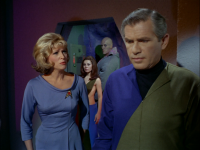
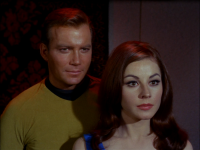
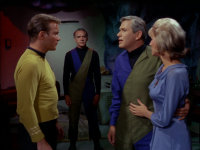
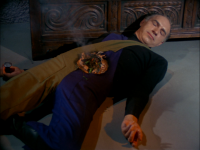
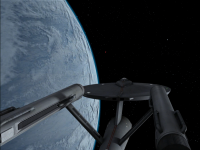
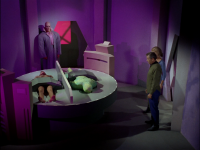
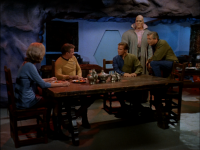
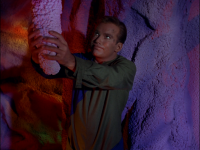
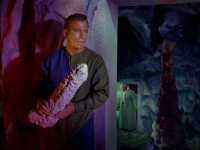
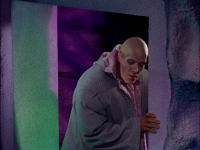
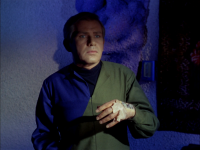
Star Trek TOS - 1x07 - What Are Little Girls Made Of?
Originally Aired: 1966-10-20
Synopsis:
Nurse Chapel's long lost fiance is found. [Blu-ray] [DVD]
Filler Quotient:
3, bad filler, totally skippable.
- Pretty lame episode with no significant long term continuity. Dr. Soong on Star Trek TNG will later (re)invent androids, but it is presumed that his work occurs in isolation with no connection whatsoever to Dr. Korby's discoveries.
Problems
- How could Kirk have strangled an android Korby?
Factoids
- This episode establishes that Kirk has a brother named George Samuel Kirk. He has a wife and three sons. Kirk calls him Sam.
Remarkable Scenes
- Kirk killing an android.
- Kirk being "cloned" into an android.
- Kirk debating with his android counterpart.
- Android Kirk calling Spock a half-breed.
My Review
While it's annoyingly unoriginal to frame another episode around a Kirk double and another guest star with a hidden agenda, I quite liked Kirk's method of making Spock aware of the impostor by filling his thoughts with hate for Spock during the creation of the Kirk android. Kirk couldn't have known for sure that his tactics would work, so the entire attempt was just one big lucky guess. Nevertheless, that sort of boldness is exactly what makes a good captain.
However, the real meat of the episode lies with Dr. Korby's discovery of technology from an extinct alien civilization capable of manufacturing androids. This technology is even capable of transferring the human consciousness into an android, a capability that he uses to save his life, after which he apparently makes no attempt to contact Earth because he's afraid that his people would find his discovery somehow distasteful. This seems like an irrational notion up until the point when the Enterprise arrives and Kirk and Chapel seem to validate Dr. Korby's irrational fears by reacting with horror at the very idea that Korby has created androids. Kirk even compares him to Hitler at one point without much of a reason.
At about 32 minutes into the episode Korby proposes seeding androids incognito to Earth and its colonies in secret as a means to avoid what he believes would be mass hysteria if their existence were to be widely known. But rather than relieve Korby of his paranoia by explaining to him that that would be unnecessary and that Earth would welcome him, his discoveries, and his android counterparts into the fold, Kirk spends the entire episode overreacting to Korby's overreaction. The ensuing conflict results in the deaths of everyone on the colony and then Kirk goes about his merry way as if nothing of consequence has occurred.
In so doing, the implications of the existence of this android technology are wasted and forgotten. Kirk makes no attempt to retrieve or preserve the technology and the episode itself seems to condemn the very existence of such a technology. At several points, the episode goes out of its way to make the argument that an android which thinks it's superior to a human is a threat which must be destroyed. The episode also demonstrates that the androids were emotionally unstable and not very good critical thinkers, seeing as how Kirk was so easily able to exploit conflicts between their emotional states and their programming. While it's clear the technology has flaws, none of this is enough to support the episode's apparent condemnation of the very idea of androids.
Instead what I can only assume the episode intended us to believe is that Korby was lying to Kirk and that his real intent was to replace key personnel on Earth and its colonies in order to take them over. This is certainly a possibility, given the Kirk double and Korby's admitted desire to keep his discoveries a secret, but at no point in the episode does this premise become conclusive. At best, Kirk could only have a reasonable suspicion of Korby intending to do such a thing and it was as irresponsible for Kirk to act on such a suspicion without proof as it was for him to make no effort to preserve or retrieve any of the technology found on that planet for further study. Overall a pretty lackluster episode.
The following are comments submitted by my readers.
- From djb on 2009-01-04 at 5:21am:
Kind of a ho-hum episode. As you said, the best part of it was Kirk getting a message through to Spock through his double.
Also, there seems to be some inconsistency as to what kind of "emotions" these droids are capable of. Also, androids wouldn't "forget" anything, only to have their memories jarred later on-- they would remember everything in perfect detail, unless they were actually programmed to forget, which they wouldn't be. Kinda weird.
One nitpick too-- Andrea isn't technically an android. She's a gynoid. A rather comely one, at that! - From CAlexander on 2011-04-15 at 4:38pm:
Another episode which doesn't come together in execution. In retrospect, I think there could have been something interesting to this story - the idea of Korby saving his life by transferring his brain to an android, then realizing that he is no longer the same person after doing so. But much of the episode consists of Korby boasting about how great his plans are, and it didn't convey a lot of meaning. Nor was I interested in Nurse Chapel, or all that weird TOS stuff about robot logic. Still, it isn't all bad. I like the parts of the plot relating to the android Kirk. His revelation at the dining table is pretty creepy, and the real Kirk's use of "post-hypnotic suggestion" is clever.
- I don't agree with the comments in the review. Korby lures down the Captain, murders two people, holds the captain hostage, and has Ruk impersonate him to cover up his crime. He then claims Kirk should bear with him, he has a good reason for it. To paraphrase, his reason is that people are too stupid to know what is good for them, so he needs to secretly take over the Federation so he can kill everyone and transfer their minds into a superior race of androids. Korby may sound mild-mannered, but actions speak louder than words, he has totally flipped out into Megalomaniacal Super-Villain territory. Kirk's sole responsibility is to stop Korby and save the Federation. That is my main complaint with the episode, that all the philosophical arguments are basically irrelevant because Korby has become such a monster.
- From Mike Meares on 2012-02-22 at 2:31am:
My biggest problem with “What are little girls made of?” is that it never does seem to make a whole lot of sense. Nothing seems to add up during the entire episode.
Now the idea of Machine vs. Man has been played out in many a Star Trek episode. It is always the emotionless machines who lose out to the warm blooded humans who demonstrate that they are more compassionate and understanding. Yea right, and if you believe that I have some swamp land I want to sell you.
But to me the main problem with this episode is the story doesn’t ever really make sense.
If Dr. Korby was indeed an android then how can he express emotions like he does? All the other androids act like they are emotionless programmed robots. But not Korby. That doesn’t make sense.
If Andrea is an android, or a gynoid, then why does she kill the android Kirk just because he wouldn’t kiss her? That doesn’t make sense.
This episode was shown just three weeks after the “Naked Time” when Christine expressed her undying love for Spock. The timing of this episode always seemed a little bit strange to me.
This episode is by far and away the weakest one of the entire first year of TOS. I have tried to watch it a dozen times and I always get disappointed with it.
I agree with CAlexander that Dr. Korby acts insane from day one and Captain Kirk doesn’t overreact at all. I think the comparisons to Hitler are good ones. Hitler wanted to create the master race, and Dr. Korby does too in a strange way.
But even discussing the story seems weird because the story never seems to fit right.
I agree that the cutest thing about this episode was the android Kirk yelling at Spock. But even that didn’t make sense. Being an android with a computer for a brain, why didn’t the android Kirk realize what he has just said to Mr. Spock?
And right after the android Kirk yells at Spock he then turns right around and says to Spock in a very concerned tone, “You look upset Mr. Spock, is everything all right up here?”
In the first place Spock didn’t look upset and even if he did ( which is debatable because after all he is a Vulcan! ) ………even if Spock was upset, would an android ask him if he was all right? I don’t think so! That really didn’t make sense!
All in all a very forgettable episode! Well not totally forgettable! I did write this review! Maybe a nightmare of an episode would be a better choice of words. - From mandeponium on 2012-08-25 at 4:55pm:
I agree with the review and comments, not a great episode. But to me the most impacting parts of this episode were Andrea's outfit, followed by a naked Kirk spinning on a merry go round. Made the the whole episode worth it. - From Alan Feldman on 2012-09-26 at 5:09pm:
"What Are Little Girls Made Of"
At 16:35, Kirk says, "That's why all this make no sense." Drop the "that's why" and it pretty much sums up this episode. Well, it starts out okay, but it makes less and less sense as it goes on. At the end, "making sense" gets entirely thrown out the window.
Re mandeponium's commentary:
The "most impacting part" of this episode is not Andrea's outfit; it's Andrea *in* Andrea's outfit!
Speaking of outfits, Rock's is, uh, a bedspread? A space blanket?
Rock is fun to watch. When he shows great strength throwing the Captain about, it's intense!
The hand-held shot of Kirk walking down the corridor and into the turbo lift is also used in "The Man Trap". It's the same shot! The Man Trap: 21:28, Little Girls: 37:34.
Mike Meares asks: "If Dr. Korby was indeed an android then how can he express emotions like he does?" The difference, I believe, is that Korby contains a "transplanted" consciousness, mind, soul, or whatever -- while the others do not. On the other hand, Rock showed anger toward "The Old Ones" and Korby, and exultation when he realized "existence -- survival must cancel out programming." Are these not emotions?
Kirk strangling Dr. Korby? Yes, that's nonsensical. I guess we're not expected to remember that far back* in the episode once we learn he is an android. I suppose some do and some don't on a first-time viewing. And what caused the "skin" on the back of his hand to be sheared off? The wall, the door? Not very durable, after all!
* About 9 minutes.
The scene in which Korby kills Rock has Rock close to him, then far from him! The sequence of shots is not self-consistent. And why does he walk so slowly toward him? I guess he's struggling to override his programming to protect Korby. But the sequence is still inconsistent.
The mind is what the brain does, so you can't transplant a mind, or one's consciousness, or whatever you want to call it. Copying, I can see. And here we have a mind (not brain) being "transferred" and "re-programmed", to boot! Talk about mind-altering!
To comment on everything in this episode that doesn't make sense would fill a small book. Nevertheless, Rock and Andrea are fun to watch.
AEF - From Schreck on 2013-05-23 at 7:32pm:
Another weak first season episode that fails to draw us in although I do enjoy a good Chapel episode…it bothers me that she was never considered a regular crew member along with Rand…I give it a 6.5 and my brother a 7 - From Bert on 2014-03-27 at 6:11pm:
I'm going to have to go back and watch the episode, but I never had a problem with it. Part of it is, you have to think about the attitudes at the time. Robots and androids were generally considered scary monsters. In movies they were almost always either evil or messengers of doom. In novels and short stories, it's the same thing. It's the reason Asimov came up with his three laws, so mechanical men wouldn't realize they were smarter/faster/stronger and take over the world.
When eveyone assumes something, you don't generally feel a need to spell it out. And when you discover a technology no one will trust, you hide or bury it. - From Alan Feldman on 2014-04-16 at 11:36pm:
djb writes: " Also, androids wouldn't "forget" anything, only to have their memories jarred later on-- they would remember everything in perfect detail, unless they were actually programmed to forget, which they wouldn't be. Kinda weird."
You're assuming perfect programming and perfect hardware, neither of which exist (well, above a certain complexity level, anyway, which we have surely reached in this case!). The old memories are probably archived and are therefore not easily accessible. Also, cosmic rays can flip bits. Not very often, but Rock has been around a very long time. Furthermore, androids are supposed to resemble humans. In this case at least some of them are able to "import" another's very consciousness (which is kind of ridiculous), so must resemble humans in some sense. Perhaps Rock was of that type.
OTOH, these androids are far more advanced that anything we have today. But they're still designed to be like humans.
Anyway, the whole story is ridiculous. Another example: "Don't you see, Roger. Everything you've done proves it _isn't_ you." Ah, so A doesn't equal A. You're not you! You're someone else! This sentence is false! Right.
The only reason to watch this ep, IMO, is Rock and Andrea in Andrea's outfit.
AEF, a.k.a betaneptune - From peterwolf on 2015-11-06 at 11:43pm:
The complicated review searching for a point without really finding it proves that there is more to this story than a plain "man versus machine". Although I do not like the creation scene, when Kirk and the proto-biomass are spinning like crazy, the rest is rather entertaining and full of serious topics. Men (or the old ones) made copies of themselves, perhaps only machines or beings which could be sentient. In this episode, no one ever uses this word (I checked the transcript), which later becomes so important for Star Trek: "a sentient being". Ruk and Andrea seem to be just on the edge of being sentient, perhaps Kirk´s copy too? Ruk shows something like anger, Andrea something like love; both could be simple simulations/emulations, but Korby seems to have transferred his complete mind to his android body copy, and, thus, still himself. I think one idea of the episode, which is admittedly not perfect and lacks humour, is contained in the statement of copy-Kirk, who says "Thank you. I felt quite at home on the Enterprise." Would a purely logical computing machine say something like that? This episode is a forerunner of all the Data episodes and we should be grateful for it. Some eerie and very good scenes are the ones when the android Ruk uses different voices, and in particular, to deceive Kirk, who is knowingly responding to it. Such things were used in X-files episodes as well. Strange enough, the only humour is brought about by Spock, complaining that Kirk was using the rude expression halfbreed ... - From Royy on 2016-11-16 at 7:05pm:
I feel this is a greatly unappreciated episode. I think it is wonderful mainly three reasons:
1. For me, it is the Star Trek equivalent of Conrad's 'Heart of Darkness'. Like Conrad's Novella, the protagonist ( Kirk) goes in search of his hero, only to find he is not what he expects? The plot is subtle, and the diverse dillemma's that provoke alot of thought for me.
2. The acting is superb. I especially love Dr Corby. I wish they had used him as a villain again e.g. Instead of Kahn.
3. That female android ... She is gorgeous.
I can watch this again and again. I pick new things up all the time.

Star Trek Voy - 5x13 - Gravity
Originally Aired: 1999-2-3
Synopsis:
A stranded Tuvok struggles with his emotions. [DVD]
Problems
- Tom says Tuvok's wife is 50,000 light years away. Actually, by my calculations, she's closer to 43,000 light years away.
Factoids
- We get to see Tuvok as a young man in this episode.
- It's remarkable how the doctor was able to speak Noss' language. "A universal translator was written into" his program.
Remarkable Scenes
- Tom getting "mugged." I loved hearing Noss' native language. Lori Petty did a good job with it.
- Tuvok saving Noss.
- The doctor: "I'm a doctor, not a battery!" Count 29 for "I'm a doctor, not a (blah)" style lines, which McCoy was famous for.
- Tuvok telling Tom his story.
- Tuvok mind melding with Noss.
My Review
A rather generic episode, other than the rather interesting time displacement part, the character of Noss, and Tuvok's flashbacks. If it were not for these things, the episode would be hideously cliched. We have yet another shuttle crash (one wonders if by now half the crew is assigned to "shuttle and photon torpedo replacement duty") resulting in yet another rescue attempt. It's rather funny how the writers don't even tell us why Tuvok, Tom, and the doctor were on a shuttle mission in the first place, as if it doesn't matter. My complaining aside, the social situation that developed between Noss and Tuvok was very well written and made the episode most watchable. It's also remarkable how Tom kept encouraging Tuvok to accept Noss' advances, to accept the inevitability of their situation, that this planet was "home" now. It reminded me a lot of Voy: Remember with Chakotay in place of Tom. I also liked how the aliens trying to seal the rift were the same aliens attacking people down on the planet. It certainly makes sense with their claim that they've lost ships to the anomaly too frequently. Even all these nice touches can't save the episode from being below average though. We've just seen too many shuttle crashes.
The following are comments submitted by my readers.
- From spline on 2014-01-20 at 11:09am:
I certainly dont think this was generic. This was a character piece, not just of Tuvok but of Vulcan culture. The reason for the crash, the whole side plot of the alien ship closing the sinkhole etc. was just an excuse to focus on Tuvok, and well worth the suspension of disbelief we have towards the Photon Torpedo and Shuttle Factory we've already developed. 8)
I have a soft spot for Lori Petty, and she did a great job with her alien language. The chemistry between her and Tim Russ (Tuvok) was remarkable for it's restraint, and yet it was clearly there. Great job on both the actors.
And the ending was really good, I liked that it didnt try to tack on some kind of tragic or hopeful thing.

Star Trek Voy - 6x03 - Barge of the Dead
Originally Aired: 1999-10-6
Synopsis:
Torres embarks on a journey to Klingon hell. [DVD]
Problems
None
Factoids
- The Klingons have a legend describing Kortar, the first Klingon, who destroyed the gods that created him and was condemned to steer the Barge of the Dead for all eternity as punishment.
Remarkable Scenes
- Torres' shuttle crashing into Voyager's shuttle bay.
- Torres: "We only have one multi spatial probe, I didn't want to lose it." Janeway: "We only have one B'Elanna Torres. I don't want to lose her either."
- Tuvok wielding a bat'leth.
- Seven of Nine and the doctor singing a Klingon drinking song.
- Chakotay: "I accept there are things in the universe than can't be scanned with a tricorder."
My Review
Voy: Coda + Voy: Mortal Coil = Voy: Barge of the Dead. The third "afterlife" plot Voyager's done so far. First Janeway, then Neelix, now Torres. I wonder when the writers will get tired of it. This one's a little better than Voy: Mortal Coil, but not quite as good as Voy: Coda. Torres' issues weren't quite as annoying as Neelix' were, but the writers made no attempt to explain away the dreams Torres was having like they did with Janeway. So in the end, the episode ended up being slightly below average. Not particularly bad, but not all that good either.
The following are comments submitted by my readers.
- From Scott MacGregor on 2008-11-26 at 1:24am:
I love klingon episodes and to see them in voyager is a refreshing change. The scene with tuvok and the batleth was great and hearing the doctor and seven singing. Did anyone notice its the same song worf and his fathers friend sang in his quarters in DS9-Way of the Warrior, a line mentioned by b'lanna in the episode. Great continuity there i have to say. It is annoying that the episode has no plot really but i thought it was a good character episode for a character who doesnt get many. - From Psycroptic on 2013-01-05 at 9:15pm:
One of the first episodes in a while that Tuvoc actually does something. He hasn't gotten NEARLY enough screentime in the last few seasons, it's basically just been the doctor, seven, and Janeway. - From Hugo on 2015-03-02 at 7:12am:
Isn't it surprising that the Doctor went with recreating her experience, I would have thought that his ethics wouldn't allow that... - From Qapl'Obummer! on 2022-02-28 at 5:29pm:
This entire episode should have been a dream while she recovered from the accident. But now we have Janeway, Paris and the Doctor almost letting her kill herself because of some stupid superstition.
btw...isn't it very rude of Chucky Chacotay to call it klingon "mythology" when he was talking to her? When I call people's superstitions mythology they are always very offended.

Star Trek Voy - 7x02 - Imperfection
Originally Aired: 2000-10-11
Synopsis:
Seven suffers a breakdown. [DVD]
Problems
None
Factoids
- Janeway is shot during transport and is not hurt.
- This episode was meant to be set after Voy: Drive, but the air date order was changed.
Remarkable Scenes
- Mezoti, Azan, and Rebi departing.
- Icheb expressing interest in joining Starfleet.
- Tom pointing out that the last time she took the Delta Flyer it ended up being destroyed. :)
- Janeway extracting a cortical node from a dead Borg in a Borg debris field.
- The Delta Flyer battling the alien scavengers.
- The doctor's surgery simulation.
- Seven discussing with Torres afterlife.
- Icheb disconnecting his cortical node himself so as to force the doctor to give it to Seven.
- Seven: "This debate is pointless, I won't accept the node." Icheb: "And I won't keep it." The doctor: "Someone had better use the damn thing! If it stays disconnected much longer it won't do either of you any good."
- The surgery.
My Review
Out of left field, we're shown a wonderful episode. It has all the components necessary for a good Star Trek episode. A contention, namely Seven's illness, putting her in danger. An attempt to save her that doesn't go so well, namely stealing a cortical node from a dead drone. A decent helping of action, namely the aliens who attacked the Delta Flyer at the Borg debris field. And finally a genuine moral issue concerning Icheb's radical solution to Seven's problem. I liked how mature and grown up Icheb has become and how logical his plan is. Most of all, I loved how he forced this plan upon everyone in order to save Seven's life when he realized he would fail to convince anyone. The ends justified his means, and Seven has grown much closer to Icheb as a result. Maybe our Borg action thriller that was last episode wasn't so great, but the drama in this episode is top notch.
The following are comments submitted by my readers.
- From Tony on 2008-09-04 at 11:03pm:
A brilliant episode except for one thing: I'd like to either have the aliens in the debris field play a larger part in the story, or have them removed entirely. As is, they seem rather random, almost like the writer(s) said, "Hey, we need some action to fill this part, let's add some hostile aliens." Provided, it would seem odd not including and implant stealing scene, and it would be a dull suene if they just took the implant and left, but I feel that they could have done better. Otherwise a great episode. - From McCoy on 2017-10-29 at 7:48am:
I think my ocular implant was malfunctioning while watching this. 10/10.

Star Trek Voy - 2x12 - Resistance
Originally Aired: 1995-11-27
Synopsis:
Janeway must escape from the Mokra. [DVD]
Problems
None
Factoids
- Alan Scarfe, who plays Augris in this episode, also played Admiral Mendak in TNG: Data's Day and Tokath in TNG: Birthright.
Remarkable Scenes
- Augris describing Voyager's "disreputable" reputation.
- Caylen's distraction.
- Tuvok discussing pain with Torres.
My Review
Could have been a lot better. This episode reminds me quite a bit of DS9: Progress where Caylem is Mullibok and Janeway is Kira. Circumstances certainly differ. I liked hearing more about Voyager's "disreputable reputation", which is good continuity with previous episodes. Unfortunately, the plot is meager. Janeway and Caylem together made for some good acting, but did little to spice up a rather drab plot. The writers could have made a much more exciting plot out of Voyager's recurring fuel problem.
The following are comments submitted by my readers.
- From Nicholas Donaghy on 2008-02-26 at 5:27am:
I'm surprised you only briefly refer to the acting in this episode. I found the plot quite "meager", as you suggest, but the performance of Joel Grey was simply stunning. It's a great coup for Voyager to get an Academy Award winner, and his performance was heartbreaking. - From plus on 2011-08-25 at 8:09pm:
I agree with the other commentator, the excellent acting, including the touching moment at the end, give this episode extra points. Plus the plot really isn't that bad... nothing terribly original, I admit, but decent, believable... This really belongs in 5/6 territory. - From thaibites on 2013-10-27 at 11:59pm:
A rating of 2? Brother, you have no heart. Joel Grey was this whole episode, and you didn't even mention him! Methinks you're a bit too wrapped up in your little ST universe...

Star Trek DS9 - 2x04 - Invasive Procedures
Originally Aired: 1993-10-17
Synopsis:
The crew must fight for Jadzia's life when a desperate Trill takes the group hostage and steals the Dax symbiont. [DVD]
Filler Quotient:
2, filler, but an enjoyable episode nevertheless. You can skip this one, but you'd miss out on some fun.
- There's no essential plot or exposition in this episode that renders it unskippable, but it's a decent episode, even though it could have been better.
Problems
None
Factoids
- O'Brien has two brothers.
Remarkable Scenes
- Quark regarding Rom: "He couldn't find a cup of water if you dropped him in a lake."
- Bashir laying into the Klingon to help him try and save Jadzia's life.
- Sisko reminiscing with the new Dax.
- Quark faking his injury.
- Quark cracking the lock on Odo's box cage.
- Sisko shooting the new Dax.
My Review
This episode features a most remarkable guest star, a disgruntled Trill never given the chance to join with a symbiote. We learn many interesting things about Trill in this episode. Symbiote joinings are rare on Trill, due to the high standards of compatibility established by the Trill society. It's nice to see a guest bad guy who's so profoundly flawed and ultimately pathetic, especially as a counterpoint to last week's James Bond villain. It's also nice to see an episode like this, which is very violent by the necessity of the plot, end with zero loss of life. The final scene is tragic and you really feel sorry for Verad. Sure, he was an introverted, selfish sociopath, but all he wanted was to better himself. Something of that is sympathetic to me at least. The best part of this episode is how Sisko works so hard at reasoning with the bad guys. He does an excellent job too. I'm most fond of the scene just after Verad becomes Dax when Sisko reminisces with him. The whole episode was very nicely done.
The following are comments submitted by my readers.
- From djb on 2009-01-03 at 1:25am:
I enjoyed this episode quite a lot, even though it was in the old "oh-crap-someone's-taken-us-hostage-what-do-we-do" plot vein.
It was cool to learn more about the Trill. What was especially cool was seeing the change in Verad, and how Sisko knew from the start that it would change him, most likely to Sisko's advantage. Verad, of course, was so myopically focused on his goal of getting a symbiont, that he had failed to really appreciate the full ramifications of joining. That, of course, is probably related to the reasons he was denied a symbiont in the first place. Mareel, not being a trill, had no idea, and seeing her gradual acceptance of what Sisko knew all along is great.
It was pretty interesting to see Jadzia, who is normally so confident, in such a vulnerable state-- it added some depth to her character.
One thing that bothered me was Quark seeming to get off so easily. We hear Kira say he's through at the station toward the beginning of the episode, but this talk goes away by the end. Maybe he redeemed himself just a little by helping the doctor sedate the Klingon and by cracking the lock on the box Odo's stuck in... who knows. - From Bernard on 2010-03-30 at 1:31pm:
Good episode for all the reason listed in the main review.
Timing is not fantastic since this is the second episode in a row where the station is evacuated! But we'll forgive that because I like to assess each episode on its own merits.
Interesting to see how all the characters react to the situation. Can you see the same thing playing out later in the series? The interaction between Sisko and Verad Dax is especially pleasing and well done. Solid episode, 7 for me. - From Zaphod on 2011-04-17 at 11:27am:
Problems
none
???
Seriously?
How could you overlook the possibility of putting Jadzia in a stasis pod? How could Bashir miss that?
Very big flaw, but at least the time pressure wasn't overemphasized so it didn't ruin this otherwise very entertainig episode for me. - From here@there.us on 2011-08-21 at 2:52am:
I thought this was a really fantastic episode, that belongs more in the 8/9 range.
There are many absolutely exceptional performances here, starting with the actor portraying Verad. The symbiote integration is depicted perfectly. One gets a very clear sense of who Verad is before the joining (and again at the end, when it's reversed), and a very clear sense of the new entity, Verad Dax.
The really astonishing thing is that the viewer can sense that it isn't exactly a "new" entity at all - we're all very familiar with Dax already, as Jadzia Dax, and the portrayal of Verad Dax conveys that uncanny continuity. The effect is really quite an impressive bit of writing, directing, and acting.
Not only does this episode provide more information about Trill society and Symbiote joinings, but we get a direct, emotional sense of what such integrations really mean for the Trills who undergo them.
- - -
There are a handful of other fantastic performances - including Sisko's convincing affections for Jadzia, anger towards Verad, and frustration towards the helplessness of the whole situation. His "temper" outbursts have not always been very compelling in previous episodes, but I love the scene when he goes berserk on the Klingon mercenary.
Bashir also has a great dramatic part to play - he is forced to violate the Hippocratic oath and remove the symbiote from Jadzia, who he is obviously in love with. As the reviewer mentioned, his chewing out the Klingon makes for a remarkable scene. Do not get between a doctor and his patient, even if you're a Klingon holding a disruptor pistol.
Finally, I thought Quark's character was portrayed even a bit better than usual. Perhaps feeling personally responsible for the hijacking (which he certainly was), he puts his lobes on the line and hatches a plan that is both daring and devious. It's quite entertaining to see him launch himself at a Klingon 3 times his size, then feint an excruciating ear injury. There's a few brilliant comedic moments around this ear injury, but it's also a clever and successful plot to free Odo ("Do we really have to?"), and ultimately help Sisko take back the ship.
- From Jeff Browning on 2011-10-18 at 11:21pm:
A couple of other problems mar this otherwise excellent episode:
1. The ion storm. In my experience of watching Star Trek ion storms requiring the evacuation of a station are exceedingly rare. Did Verad create this one? If not, his appearance at this particular point in time when the station is almost abandoned is conveniently coincidental and therefore not believable.
2. We see Verad as a mediocrity, and absolute milk toast. He cannot even manage without support from his woman. Yet he somehow managed to accumulate enough wealth to obtain a spaceship and pay to Klingon mercenaries, as well as mastermind a brilliant crime. I find no capability like this in Verad pre-joining. Where is he getting this? It just does not fit with the rest of his character. - From Gul Ranek on 2012-12-12 at 4:13pm:
Nobody noticed Tim Russ as the Klingon? Seems really strange for the part, too calm, very different than other Klingons on the show. He was good in the role of Tuvok, though. Maybe that's why his acting seems strange to me.
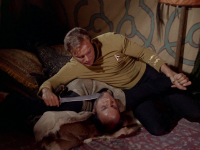
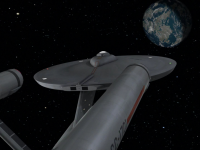
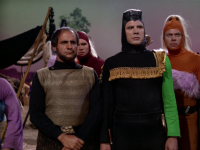
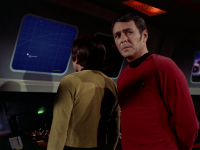
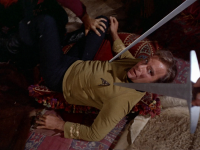
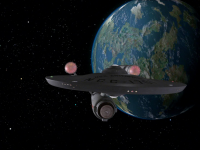
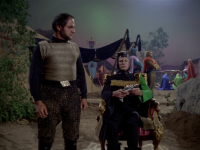
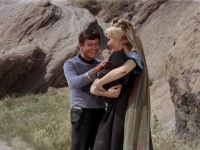
Star Trek TOS - 2x11 - Friday's Child
Originally Aired: 1967-12-1
Synopsis:
The Enterprise crew becomes embroiled in a local power struggle on a tribal planet. [Blu-ray] [DVD]
Filler Quotient:
3, bad filler, totally skippable.
- Pretty lame episode with no significant long term continuity.
Problems
- Responding to a distress call, Scotty orders the Enterprise to the distressed ship's location at warp 5. But the Enterprise's maximum speed is at least warp 7 or 8 from other episodes we've seen! I guess they're not in that much distress after all... Then to make matters worse, when he returned to the planet, he did so at warp 6, and made a big point about it! Yes, because when the captain's in trouble, it matters far more than the lives of potentially an entire freighter!
- When Kirk and Spock used their communicators to cause the rockslide, the special effects instead depicted the rocks exploding off the cliff as if they were rigged with explosives. Those must be some pretty potent sound waves...
- In the teaser when McCoy is briefing the senior officers on the aliens of the week, the footage shown of them battling is actually recycled material from later on in the episode when the warriors are hunting down the landing party.
Factoids
- This episode establishes that the maximum speed of a Federation freighter is warp 2.
Remarkable Scenes
- The security offer whipping out his phaser the moment he saw a Klingon and then getting instantly killed.
- Kirk currying favor with the new tribal leader by exposing fear in the Klingon and proposing that he be allowed to duel the Klingon.
- McCoy and Eleen slapping each other.
- McCoy: "I'm a doctor, not an escalator!" (Count #6 for "I'm a doctor, not a [blah]" style lines McCoy is famous for.)
- Kirk and Spock constructing and wielding bows and arrows.
My Review
An episode which on the surface seems nearly identical to Errand of Mercy. Once again we have a proxy battle between the Federation and the Klingon Empire and once again the aliens of the week being manipulated by this proxy fight are a primitive race which oddly appear identical to humans. The trouble is Errand of Mercy was a good story and this episode sucked.
In Errand of Mercy we're treated to the delightful character of Kor whose well characterized personality really drives home the philosophy of the Klingon Empire and how it differs from that of the Federation. But in this episode, the Klingon antagonist lacks intrigue or personality of any kind. He falls completely flat. This contrast is even reflected by the events in orbit of both episodes. In Errand of Mercy there's an exciting space battle in orbit. In this episode there is no action in space at all. Instead the Enterprise follows up on fake distress signals and chases away a timid, fearful Klingon ship, lacking in any kind of dramatic appeal whatsoever much like its Klingon counterpart on the surface.
On top of that the diplomacy in this episode is terrible in a couple of places. First and foremost, the entire premise of this episode is a blatant violation of the Prime Directive, again much like Errand of Mercy. Second, even if we assume that the Federation had made an exception to the Prime Directive due to the importance of securing the resources on this planet, that by no means gave Kirk the authorization to interfere with local law by saving Eleen, thereby endangering the mining rights negotiations as well as the lives of the landing party.
But it wasn't just Kirk who was off his game today because the bridge crew of the Enterprise started to look mighty stupid too by the end of the story. I'm glad that the overwhelming obviousness of the distress call being fake eventually occurred to Scotty, but the time for that was well before he turned the ship around. The most annoying scene on the bridge was when Uhura questioned Scotty's rather solid reasoning about the distress call being fake with little more than "but what if it's real?" That challenge alone convinces Scotty to keep plugging away at the useless search for a while longer, further endangering the landing party unnecessarily.
Probably the only charming aspect of the story was McCoy's high degree of competence, which was a nice relief from an episode filled with incompetence by nearly every other character. For reasons not terribly well explained McCoy seems to be an expert on this planet's culture and while on the surface he takes charge of the medical situation effectively and in ways allowing for a bit of decent humor as well which too was a nice relief from the overabundance of fistfights and tribal ritualistic nonsense the episode seemed to focus on to excess. Overall though this episode is quite a disappointment.
The following are comments submitted by my readers.
- From Orion Pimpdaddy on 2010-05-03 at 8:13pm:
I liked this episode a little. It is one of the rare episodes where Kirk spends a great deal of time regetting the loss of his fellow redshirted crewmember, the one who dies a minute after beaming down. He even chews out McCoy with his misplaced anger. Also, McCoy's semi-romance with the pregnant woman is interesting.
Eventually, the show falters as it shifts into cliche action sequences out in the rocks. This is the only time I know where a communicator is used to create an avalanche.
One more thing, there's something distrubing when you hear McCoy saying Ochie Woochie Koochi Koo; it's sounds dubbed. - From Peter Collins on 2015-03-18 at 2:34pm:
Pretty poor episode, but just one thing: isn't there a line about how McCoy spent some time on the planet getting to know the locals, which is how he has some in-depth knowledge? - From Rick on 2017-02-08 at 3:22am:
"On top of that the diplomacy in this episode is terrible in a couple of places. First and foremost, the entire premise of this episode is a blatant violation of the Prime Directive, again much like Errand of Mercy. Second, even if we assume that the Federation had made an exception to the Prime Directive due to the importance of securing the resources on this planet"
Eventually I assumed that you would figure out that the Prime Directive does not apply to worlds where the Klingons will conquer and destroy unless you intervene. The point of the Prime Directive is to allow worlds to develop naturally. If you have advance knowledge that a race (i.e. the Klingons) are going to conquer, use, and destroy a planet, then yes, you can intervene because the Klingons are going to intervene regardless of whether you do. Come on man. Stop being so uselessly hard on TOS. We all clearly realize that you dont like TOS in favor of the precious continuity of the much lesser DS9 and the like. - From Rick on 2017-02-08 at 3:53am:
In addition to the above, come on, give some credit to the ending. The antagonist of the entire episode finally comes to the realization that the Klingon that he has been supporting is in fact a fraud, and decides to sacrifice himself for the good of his people. That is the kind of antagonist I can get behind and the kind of one that makes a great episode. - From Chris on 2018-01-17 at 7:08pm:
I wasn't going to comment on this episode but feel the need to interject something re: The Prime Directive.
That regulation was blown out of the water at the episode's beginning with McCoy having already visiting the planet and learning about its people.
For that to have even been allowed to happen means that in earlier years, this planet had been visited and the natives already knew of aliens from the sky. They already knew about Federation weapons, communicators, etc...
I see no problem with the PD in this episode at all.
I do have a problem with Kirk's rationale that they violated no customs and so on! Is he high?!?Ridiculous for him to even go after Bones!
I always hate that TOS made the Klingons out to be such conniving sissies! - From Chris on 2019-02-09 at 10:56pm:
As usual... Another follow up.
I loved the interactions between McCoy and Eleen when slap each other! That S___ Eating grin on her face is priceless!
I also always like when Kirk baits Spock with "Well, if you don't think it'll work, maybe we shouldn't try..."
Did anyone else notice the Klingon falling down as they were approaching? They even kept the follow-up scene where he is recovering from his fall!
I'm consistently annoyed by their warp factor choices! The plague on New Makus when after Spock and the remains of the Galileo Seven get back on board, Kirk heads off at Warp 1! WTF?
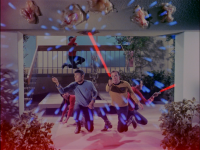
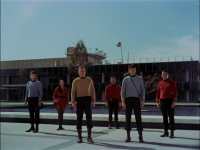
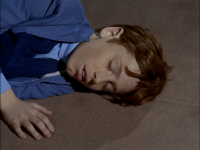
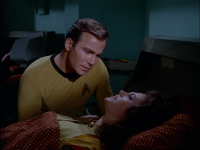
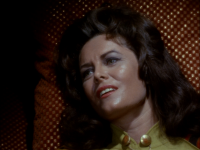
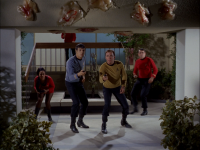
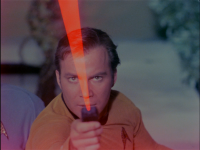
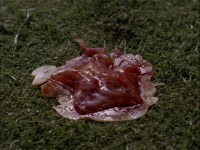
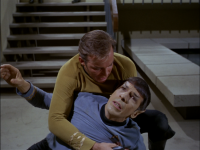
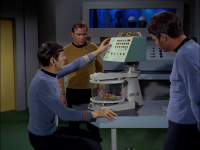
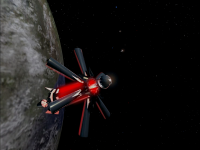
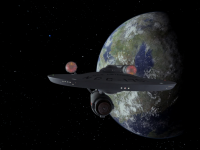
Star Trek TOS - 1x29 - Operation: Annihilate!
Originally Aired: 1967-4-13
Synopsis:
The Enterprise crew saves Deneva from deadly parasites. [Blu-ray] [DVD]
Filler Quotient:
2, filler, but an enjoyable episode nevertheless. You can skip this one, but you'd miss out on some fun.
- There's no essential plot or exposition in this episode that renders it unskippable, but it's a decent episode, even though it could have been better.
Problems
- Spock refuses the goggles during the intense light experiment on the grounds of precisely duplicating the conditions the colonists will experience. The logic being that the colonists won't have goggles, so he shouldn't have any either. His desire for scientific precision is admirable, but misguided. There is no good reason why they could not have tried the experiment with the goggles first then, if it didn't work, try again without goggles (in desperation) to see if the goggles for whatever reason make a difference.
Factoids
- This episode establishes that Vulcans have an inner eyelid to protect them from extreme brightness. This evolutionary peculiarity is a consequence of the extreme brightness of the planet Vulcan's star.
- Kirk orders Sulu to reduce the ship to sub-warp speeds while moving away from the star. This line implies that the Enterprise is capable of using its warp drive inside of a planetary system.
- Scotty spent some time in the Deneva system doing cargo runs for the asteroid miners.
- This episode establishes that there are 14 science labs aboard the ship which feature the finest equipment and computers in the Federation.
Remarkable Scenes
- The Enterprise flying too close to a star.
- Kirk losing his brother.
- The landing party engaging the parasites.
- Spock getting messed up by a parasite.
- Spock on a rampage.
- Spock resisting the parasite with his Vulcan discipline.
- Kirk revealing that his duty may require him to kill over a million people on the colony in order to prevent the parasites from threatening more colonies.
- Kirk proposing that radiating the parasites with light is the solution to their woes based on the star incident at the beginning.
- Spock volunteering to be blinded.
- Spock's nonchalant reaction to becoming blind.
- The Enterprise deploying the parasite-killing satellites.
- Spock casually explaining why he was able to recover from his blindness much to Kirk's and McCoy's astonishment.
My Review
Following up on the quick aside in What Are Little Girls Made Of establishing that Kirk has a brother named Sam, this episode opens quite dramatically with with the death of Sam along with Sam's wife. While the dramatic potential in such a momentous event in Kirk's life could have been better harnessed rather than killing off both characters so unceremoniously, it was nevertheless quite effective in setting rather unusual stakes; especially given the plot's focus on Kirk's struggle to balance saving Sam's orphaned son with saving over a million colonists from the ravioli pancake parasites. The ravioli pancakes themselves weren't the most terribly effective props, but I nevertheless admire the ambition and originality of the attempt. It sure beats another god-like alien.
The next most remarkable feature of the story is Leonard Nimoy's dynamic performance as Spock. Right from the moment the poor guy is invaded by the ravioli pancakes, he instantly becomes the most interesting character on the screen. Rather than subjecting us to the already tired trope of watching a character violently struggle against affliction of the week, Spock rapidly gains control over both his emotions and his actions while still exhibiting subtle visible signs of the intense pain he is experiencing. This allowed for an excellent opportunity to contrast Kirk's and McCoy's reactions to Spock's behavior under this kind of pressure, which added fantastic texture to the story.
Likewise, aside from the goggle logical mishap noted in the problems section of this review, the plot point pertaining to blinding Spock in the interest of scientific research was also nicely done. You feel bad for Spock even though and perhaps especially because he takes it so well. Then to make matters even worse, McCoy discovers after the fact that visible light wasn't even necessary to kill the parasite! So Spock is blinded needlessly. Finally, at the last moment, Spock reveals the details surrounding his inner eyelid to the astonished Kirk and McCoy; he was only temporarily blinded. This plot point borders on a lie to the audience as it's easy to wonder why Kirk and especially McCoy would be so ignorant about this anatomical feature of Spock, but it's just so damn charming that it's easy to forgive their ignorance.
The episode isn't all sunshine and rainbows though, as several aesthetic choices diminish the enjoyability of the story. In addition to the aforementioned goggle problem, the underutilized dramatic potential of the deaths in Kirk's family, and the almost-but-not-quite lie to the audience about Spock's blindness, we also see the recurrence of the just plain annoying cliche where a clearly unstable person confined to sickbay (Spock in this case) is simply allowed to walk out with little to no resistance.
Another bad aesthetic choice centers around Kirk and Spock speculating as to the origins of the ravioli pancakes. Kirk presumes that because their anatomy is so unusual they must be from another galaxy, a deduction that doesn't follow at all. Spock then builds upon this faulty logic by suggesting that they must come from a place where "our" physical laws don't apply. These throw away lines don't really affect the plot, but they are annoying examples of plainly pseudoscientific reasoning unbecoming of a science fiction show. Finally, while the deployment of the UV ray emitting satellites was a cool detail, it seems like yet another overwrought capability for the Enterprise to possess. Imagine the destructive potential for misuse of that power!
Overall though this episode is easily above average, as it successfully integrates a reasonably dense sci-fi plot with well executed elements of adventure, danger, drama, high stakes, and humor. A good send off for the first season.
The following are comments submitted by my readers.
- From ScienceGuru on 2010-08-05 at 11:05pm:
They said radiation did not kill the creatures, but they ended up dying to to ultraviolet RADIATION. Bad science. - From Strider on 2012-08-21 at 5:08am:
I'm frustrated by the bad science that the science and medical officers display--they don't even wait for the results of the first test before they conduct the second!
However, besides that, I think this is a brilliant episode. Yes, it has flaws, but there's such great acting by all three principals. I agree that the Kirk family drama seemed to go unaddressed on the surface, but it was there in the whole drama with Spock being infected. Every glance of Kirk's seemed to say "not Spock, too!" And when Spock was blinded, and Kirk's rage all went to McCoy--that was clearly an overreaction powered by his grief over his brother and his fear for Spock.
Nimoy's acting, especially, is unparallelled in this episode. He's so subtle, so controlled, that you never forget for an instant that he's in pain and will almost certainly die.
Plus--yay for security procedures in the transporter room! Scotty defeats Spock and keeps him from transporting just because he has orders--that's how it should be more often! - From Alan Feldman on 2012-09-24 at 6:37am:
To ScienceGuru: I believe that when Bones said "radiation" he meant ionizing radiation, such as alpha rays, beta rays, gamma rays, X-rays, proton beams, and such. That is the typical use of the word in this context, and most UV radiation is not classified as ionizing radiation. On the other hand, in sufficient quantities it is not safe, so the inhabitants of Deneva would likely have been harmed by it.
AEF - From Alan Feldman on 2013-01-27 at 7:28pm:
OPERATION ANNIHILATE
Another remarkable scene: Scotty holding Spock at bay with his phaser!
The Ravioli Monsters make for a fascinating case of a parasite. Here on Earth there are parasites that target the nervous systems of animals to control their behavior to the benefit of the parasite, just as in this case. Nevertheless, generating the uncontrollable urge to take over a space ship to infect a new planet is pretty advanced! And then to have the crew beam them down? Still, I can go with this.
In response to Kethinov's review: As for the "effectiveness" of the Ravioli Monster props, I thought it was good. And any monster that flies is automatically more scary, as such a creature is rather hard to run away from.
The special effect when they shot the crazies with the clubs was very well done.
On my response to ScienceGuru: We normally reserve the word "radiation" in this context to mean _dangerous_ ionizing radiation, in spite of the fact that sufficient quantities of UV are also dangerous.
Regarding the blindness bit: Why didn't they wait for the analysis that showed only UV light was needed? But that, too, would be harmful to the eyes. And why does the inner eyelid allow any blindness to begin with? So it can, in this case, allow just enough light through to cause blindness that one can recover from? That's one pretty extreme case of an after-image! And why does the experiment with light make such an ear-piercing sound? And why does Spock not realize he is blind until he bumps into the desk? The whole thing is pretty silly.
As for soaking the planet with UV rays: If they're powerful enough to kill the Ravioli Monsters, they're probably also strong enough to give the Denevans a really nasty case of sunburn!
If they couldn't find a way to kill the Ravioli Monsters, why would they have to kill all of the inhabitants of Deneva? The Ravioli Monsters can't escape the planet without a space ship, and may well survive anyway. So why not just quarantine the place?!
Not a great episode. And though I like watching it, I can't help but badly cringe in horror watching the experiment on Spock. And the hysterical behavior of Kirk's sister-in-law was a bit "over the top." And what are those changing black specks on the view screen in the scene with the Denavan heading straight for the sun?
AEF - From Alan Feldman on 2013-12-08 at 10:59pm:
I forgot to mention that I think the location chosen for the city was pretty good! It doesn't look quite as futuristic to me as it did when I was a kid, but still pretty good. Notice how they were careful not to show any parking lots or streets. Also notice that the place has ordinary push/pull doors! I think it's weird seeing Kirk pull open such a contemporary door in a place as advanced as Deneva.
On my previous comments about the inner eyelid: Oh, the inner eyelid must take a long time to open. I don't know why I forgot that before. Still, the whole blindness bit and the UV radiation not being considered harmful is ridiculous. I suppose they had to fill up the allotted time one way or another.
I agree that Nimoy's acting is excellent in this episode.
Overall, a mediocre episode (yes, up a notch from my last comment), as it does have its high points.
AEF, a.k.a. betaneptune - From Scott Hearon on 2014-04-03 at 10:40am:
I agree with all of the comments here. This was a pretty good episode, despite its obvious weaknesses. I gave it a 6/10.
One thing that I would add to the problems for me was the notion that the ravioli monsters were "part of a much larger organism." I feel as if Spock was implying that there was some massive, multi-celled titan that was engulfing all of them at that very moment. It seems like this pseudo-scientific idea was thrown in to make the creatures sound even more bizarre, instead of just calling them a "hive," which seems more accurate.
I share everyone's admiration of Nimoy's performance in this one. He does extremely well with the pained restraint throughout the episode, and he holds the screen in every scene. Mainly because of him, this episode carries along very nicely.
It was a solid way to end the first season, no doubt. - From Chris Long on 2018-07-15 at 2:39am:
A great episode to be sure!
However, here are my nits!
Spock busting his restraint like they are nothing! While I understand he's a strong boy and especially more so when angry... no one can do what he does...
This is Federation Tech, baby!
As others have pointed out, the experiment is laughable even in '60s thinking!!! Oh please! I guess though, there's no story without idiocy! Sigh...
I'm not sure that humans even, to this day! know what the appendix does! I'll say this though, I had one go bad in '68 and I knew that I didn't ingnore it!!!

Star Trek TNG - 4x10 - The Loss
Originally Aired: 1990-12-31
Synopsis:
Deanna Troi suddenly loses her empathic powers. [DVD]
Problems
- Data says gravity is pulling them into the cosmic string. So if gravity is pulling them, why were they moving at a constant speed? Gravity is an acceleration. Not a constant speed. It doesn't really matter, as Data was wrong. It was not gravity pulling them. Troi's "moths flying into the flame" analogy was instead correct. But of all people, I would least expect Data to make such an elementary physics mistake.
Factoids
- TPTB considered making Troi's loss permanent.
- Breen and Ferengi are mentioned as unreadable by telepathy in this episode. This is also the first mentioning of the Breen, who will later play an important role in DS9.
- Picard claims that "most starships captains have to be content with a human counselor." This implies that the crew of most starships are largely human. This is an inference supported widely by later episodes, but I never quite understood why. Humans must have started colonizing the galaxy and spreading themselves like the bubonic plague after the Federation was formed...
Remarkable Scenes
- The opening scene nicely demonstrates Troi's counseling skills.
- Riker criticizing Data for not calculating the ETA down to the second.
- Troi realizing her empathic abilities are gone.
- Troi freaking out at Riker.
- Troi taking offense to LaForge's comment even though it wasn't directed at her.
- Troi freaking out at Beverly.
- Riker accusing Troi of feeling aristocratic about her Betazoid abilities.
- Guinan picking at Troi about taking her job.
- Picard ordering Worf to fire at the 2d life forms. He seemed relieved when his attempt to kill them failed.
- Picard giving Troi a "get your ass in gear" speech.
- Troi discovering the solution. I enjoyed her "moths fly into flames" analogy. Quite appropriate.
My Review
The writers took the Troi suffering cliche to the extreme! But it wasn't so bad. It was interesting seeing Troi lash out at the crew, and the aliens of the week were a nice concept. Still though, the use of a cliche as a plot device is trite. And when Troi got her empathic powers back, we find out that the 2d life forms were intelligent, not idiotic moths. I rather liked them better as simple life forms. It would have matched up better with the fact that they were 2d and less complex.
The following are comments submitted by my readers.
- From DSOmo on 2007-08-20 at 1:56am:
- When Troi experiences intense pain caused by the colony, she needs to call Dr. Crusher. She reaches up, taps her badge, talks to Crusher, and taps her badge to end the conversation. Isn't this proof that individuals must tap their badges to begin conversations? NO ONE in intense pain takes extra steps to call for help.
- During the staff meeting about the existence of the two-dimensional colony, there are several different camera angles of the viewscreen. The colony's motion on the viewscreen changes from shot to shot (not always moving in the same direction.) - From djb on 2008-02-18 at 10:48pm:
I liked this episode, but only part of it. The plot about the 2-d life forms unwittingly dragging the enterprise kind of gets lost amongst other (and often better) "losing control of the ship" scenarios like those found in The Last Outpost, Booby Trap, Contagion, Time Squared, etc. Also the "rescued at the last minute" thing is getting old.
What I really liked about this episode was the character development for Troi.
We've seen a lot of good character development for other characters so far. I can think of many high-quality episodes developing many of the main characters, but not so many, so far, for Troi.
Unlike in "The Survivors," the whole "Troi in agony" bit was kept to a minimum, and unlike many other Troi-centered episodes, this one had nothing to do with her obnoxious mother.
Instead, it makes the viewer acutely aware of how different Troi's experience is from those of her crewmates. Her empathic ability is literally another sense, and her losing that sense and only being able to experience others on the surface would be very similar, I suppose, to a full-blooded human losing their sense of hearing: much of our experience of others is not only what they look like, but their voice, which conveys much more personality than looks do. I imagine for an empathic person, a person's emotions are even more personal, and suddenly being unable to sense them in that way would make one feel extremely lonely and cut off, much the way I imagine I would feel if I was deaf.
Troi's process of distress and her moving towards acceptance of it are very well-executed, and deepen the character. (Often, it is noted, people discover much about themselves when they lose something they take for granted.) It's quite interesting, as Riker points out, to see her not "in control". So often she is sensing and relating others' emotions, but we do not often get to hear about her own. Her transition from totally composed and regal, as usual, to a drastic lack of composure is pronounced yet believable, and her finally letting go and crying in Riker's arms brought a tear to my eye. (We know from Nemesis that they will eventually marry each other, but back in Season 4, we are still unsure, and it's nice to see tender moments between them in light of that uncertainty.)
Guinan's presence is always welcome, and you can always rely on Guinan to say just the right thing. I don't recall a previous incident of Guinan counseling Troi, but it's a great scene. The way that Troi's process of discovering her human side (intuition, instinct) helped solve the puzzle of the 2-d beings was also quite nice.
So: Ho-hum from a sci-fi perspective, but excellent from a character perspective. - From JRPoole on 2008-05-05 at 3:43pm:
The Troi-in-mental-agony plot staple reaches its nadir here. I am intrigued by the 2-D lifeforms, but this episode is pretty lackluster in execution. - From wepeel on 2008-06-02 at 5:52pm:
Amazing, I was about to skip this episode due to all the other comments on here regarding Troi's suffering cliche. Granted, the season one episodes of "pain...intense, PAIN!" were bad, but this episode was great, and the comparisons regarding Troi's emphatic expressions were unfair.
I decided to watch the episode again, muting the volume once Troi lost her powers. This idea came about after I read djb's comments on the episode, where he specified his analogy of losing empathic powers to becoming deaf. Honestly, I had never really connected with Troi centered episodes (other than Face of the Enemy) until I did this. I really connected with the message of losing a sense, and I would recommend others to give this episode its due credit via a second viewing.
Plus, she saved the ship in a method that was quite convincing and innovative. I loved that she totally captured Data's attention as well as mine during her brainstorming =) - From CAlexander on 2011-04-22 at 3:57pm:
The primary plot about Troi was jumbled and confused. But I think I liked that; it gave the impression that she was jumbled and confused and acting inconsistently because she was so distraught. I guess therapists really do make the worst patients.
The plot about the two-dimensional life forms was mostly mundane, but did have some good points. I like when Picard, faced with a difficult moral dilemma, decides he has to attack the creatures, then is relieved when he doesn't kill them.
- From 2d@d2.com on 2011-08-17 at 8:49am:
This is a fair or even good episode.
It's kind of interesting to see Troi act differently. And kind of interesting to consider why that might be so, the difference empathic abilities can make in your experience and in your personality. I was just mulling about this earlier today... If I *knew* without a shadow of a doubt, actually *felt* how others felt about me, in real time, I probably would be more at ease and more confident, just like Troi is normally. Much of our anxiety and insecurity rotates around what we think others think of ourselves, and much of it is unfounded...
It's also interesting to consider that because Troi relies on her Betazoid abilities, her ordinary skills of perception, observation, and intuition are underdeveloped. The empathic powers have been like a kind of crutch, and she is kind of helpless without them, at least at first...
- - -
One problem:
How the heck did the "forward sensors" miss the 2D beings? The explanation Data gives is utterly simplistic and nonsensical. For this to work, the forward sensors must be truly 2-directional! Like, fundamentally so - the sensors must be point sources with no height at all, not even a micron, and detect only what is directly in front them, not a micron or two above or below. Not only would they be quite useless on a starship, they would be quite bizarre and anomalous things in themselves. How would 3D engineers with 3D equipment build and maintain something like that? And why in the world would they?
I might be wrong, but I don't think it makes any sense at all.
As far as I can tell, actual forward sensors must detect what is in front of them, but not literally so. To be useful, they must operate in three dimensions, although within a limited "forward" range. - From McCoy on 2017-12-04 at 8:22pm:
God, how I hate this woman... She's an incarnation of probably all negative traits of psychologist. And this episode is indeed very good in showing this. - From Chuck the Canuck on 2023-05-12 at 6:44pm:
Having seen interviews and convention appearances with Marina Sirtis, I’m guessing this is the closest Troi’s character ever came to her real personality. I’m not saying she’s a mean person, but she’s definitely blunt and edgy.
I liked it, though. You can tell that Troi is really shaken by this experience and it causes her to lash out. Having her be nice and pleasant to everyone like she usually is would’ve been fake. I like the concept of the two-dimensional life forms and the overall plot to fix the problem. I’d give this one a 6.

Star Trek DS9 - 2x10 - Sanctuary
Originally Aired: 1993-11-28
Synopsis:
Kira is torn when a displaced alien race arrives on Deep Space Nine and claims Bajor as its people's legendary homeland. [DVD]
Filler Quotient:
3, bad filler, totally skippable.
- This is the second episode to mention the Dominion. Haneek claims that the race which conquered hers was conquered by the Dominion. This, however, is minor trivia. And the episode is so annoying that it's worth skipping over this material and missing the trivia in the process.
Problems
None
Factoids
- This episode establishes that the station can hold 7000 people, according to Odo.
Remarkable Scenes
- The universal translator failing in the beginning.
- Haneek and Kira discussing the horrible dress.
- The Bajoran minister and Vedek carefully explaining their reasons for denying the Skreeans' request to immigrate to Bajor.
- Jake trying to be nice to the Skreeans.
- The Bajorans accidentally killing the Skreean attempting to land on Bajor.
- Haneek's final words with Kira.
- Morn appearances; 1. Watching the Bajoran play music in Quark's bar. He cries to Varani's playing. 2. Window shopping on the promenade. 3. At the bar when Varani plays for the Skreeans.
My Review
I like the beginning of this episode when the universal translator failed. It's nice to see the technology isn't infallible! Their race's language is too different for it! The issue of a group of people wanting to immigrate to Bajor is interesting, but could have been handled better. The Skreeans demanding to immigrate to Bajor despite a major famine on the planet and despite the fact that Draylon II was more than adequate for the Skreean's needs was incredibly obnoxious. I lost all of my sympathy for the Skreeans very quickly when they started getting belligerent and angry that they couldn't live on Bajor. The climax of absurdity is Kira's final scene with Haneek. The way Haneek walks off the station feeling all smug and superior is total madness. The way it's presented, I think the authors of the episode meant to have us feel some moral ambiguity but there is absolutely none. The Skreeans' request was totally unreasonable. The whole episode reminds me of an irrational kindergarten fight over a toy. Skreeans: "We want your planet." Bajorans: "Sorry, we can't give you that." Skreeans: "No, we want your planet." Bajorans: "How about this other planet? It looks like a better match for you guys anyway and you can have the whole thing to yourselves!" Skreeans: "No, we want your planet." Bajorans: "Err... okay yeah we're not doing that." Skreans, indignantly: "Well screw you then!" Astounding.
The following are comments submitted by my readers.
- From Pete Miller on 2006-06-01 at 6:24am:
So how exactly does the universal translator work? I realize that it's just an easy way for them to all speak english on the show, but is there any science at all behind it? Does it just immediately interpret the person's language, and then rebroadcast it in english to Sisko or whoever, and also make their lips appear to be moving with the english words??? This is a rare instance of me siding with Star Wars over Star Trek. In Star Wars they simply have the language 'galactic basic'. If you're civilized, you speak it. Much easier to explain.
This makes me wonder: So every time the romulans speak to someone in the federation, are they really speaking romulan? And when does the universal translator know when to allow it to stay in their own language, like when the Klingons have certain ceremonies in their native tongue. How does it know not to just translate it for everyone else? This, to me, is a ridiculous device that we have to put up with because of the original Star Trek's limited budget. George Lucas learned from Gene Roddenberry's errors on this one. But Star Trek is still waaaaay better than Star Wars :) - From JRPoole on 2008-12-10 at 3:23pm:
Ditto the comment above. I've always sort of assumed that the UT rebroadcasts speech in real-time, presumably through the comm badges, a step we thankfully don't have to sit through every time. It's sort of clunky when Haneek begins actually speaking English (whoops, of course I mean Standard) words.
A decent, if flawed, episode altogether, though. - From Bernard on 2010-10-17 at 10:53am:
I enjoyed an explanation for the universal translator, further explanation will come in episode 'Little Green Men' of course.
This episodes falls down at the point when the Skreeans lose the viewers sympathy as Eric already pointed out. Otherwise I'm sure it could have scored more highly as, like the last episode, it was fairly original. - From Tallifer on 2011-03-19 at 5:45am:
The most unrealistic part of this story is that they can find an empty, freely available and hospitable planet nearby. With all the countless races and cultures in this quadrant, with all the sexual fecundity of those races, with all the military, commercial or imperial ambitions of these races: how could a perfectly good planet remain unclaimed and unsettled?
(Which brings us to another perennial problem with Star Trek: the overabundance of habitable worlds.) - From Jeff Browning on 2011-10-19 at 6:30pm:
This comment affects many episodes where Bajor and its situation are discussed, including this one.
In this episode and many others we are told that Bajor is devastated, its citizens are starving, and so forth. I have been privileged to travel the world and have seen many areas where poverty, starvation, and disease prevail.
Whenever we see an image of Bajor, we see none of this: We see prosperous, well fed, well dressed, clean, healthy Bajorans in idyllic, beautiful surroundings. The Bajorans who show up on DS9 are similarly prosperous looking. I am left to wonder: Where is all the devastation folks keep talking about? Where are the naked, starving, filthy, diseased children I have seen in places like India, China, Africa, and Latin America?
It's kind of like the DS9 writers and editors did not have the stomach for it. They did not believe that their viewers could withstand a realistic depiction of a devastated society. Certainly, there is no indication within the frames of DS9 that this is the state of Bajor, at least from what we are allowed to see. - From Selador on 2013-01-20 at 9:51pm:
The scene directly after the one where the terrible famine on Bajor is mentioned we see Skreeans queuing up to use a replicator. Ridiculous.
This episode also is a good example of why the universal translator is such a flawed idea. - From Axel on 2015-06-24 at 3:22am:
Some interesting comments on this episode.
In response to Tallifer, I don't think it's unrealistic for a planet like Draylon II to be available. The Kepler spacecraft recently searched a tiny total portion of the sky for planets. If there were 8 Earth-like candidates found out of 1,000 identified planets and 150,000 stars, that extrapolates out to billions of potentially habitable planets orbiting their stars in this galaxy even by a pessimistic estimate. This is also why I've never been *that* annoyed by Star Trek's "alien of the week" stuff, although it's always nice when they actually develop an alien race over the series.
As for the Bajorans not being shown living in squalor all the time, I guess I disagree here too. There are quite a few people in places like India and Latin America living in material comfort despite poverty and famine there. Or take post-WW2 Germany. Its cities bombed and in ruins, people broke and often starving, and itself under military occupation. It certainly rebounded quickly, at least in West Germany. Bajor has probably had significant help from the Federation and maybe others in rebuilding, too.
All that said, the Skrreans were crappy guests/refugees. Haneek probably felt under the gun to find the Kentanna planet for her people, which is understandable. But I like how in the meeting with the Bajorans, Sisko keeps on throwing out Draylon II. The Skrreans *never* come up with a good reason to reject it, and their insistence on Bajor makes no sense at all.
A decent episode with some nice moments, but that's about it. - From Harrison on 2015-07-18 at 12:58am:
I'm genuinely surprised the reviews for this episode are so poor. Of course it is easy to dislike the Skreeans -- they were not intended to be completely lovable characters, with their flaky skin, their ingratitude, and their inconvenient needs & beliefs -- doesn't reflect badly at all on the writing or acting, both of which I think are excellent.
In truth I found the episode refreshing, and pleased that the writers found the courage to depart from the politically correct. - From Andy Mu;oz on 2018-08-29 at 12:36am:
As Peter said, this is an unusual episode. Me as a non trekkie, this is a weird episode. Showing how a relationship between collegues, not even friends, could meant a lot, a huge lot, becouse you are tied with an idealogy (of justice) instead good or bad, its huge in itself for television.
And this early in the series. My friend, a trekkie begs me to wait to season 3, but Im already an adept. And this is like that like in a lot of episode from this season. As people told me, Im awaiting for the best to come

Star Trek Voy - 1x06 - The Cloud
Originally Aired: 1995-2-13
Synopsis:
Voyager encounters a living nebula. [DVD]
Problems
- This episode contributes heavily to the Voyager Torpedo Problem. Chakotay says Voyager has 38 torpedoes available and Janeway claims they have no way to replace them after they're gone. This can't be true, or at least it doesn't remain true for long. Voyager will use far more than 38 photon torpedoes in the course of its journey. We're forced to assume they find some way to manufacture them. Which, if you ask me, isn't really all that far fetched. It would have been nice if they told us at some point further down in the series though that they were doing this. One throw away line would have sufficed.
- What the hell are they doing running the holodeck when they don't even have enough energy to replicate coffee?
- When Paris ranks up the balls in his pool table, they're very much out of order. When he goes to break, all the balls are now in order. Did the holodeck reorder them for him?
Factoids
- This is the first episode to mention Dr. Louis Zimmerman, the creator of the EMH, and that he modeled the EMH's appearance after himself.
- At 7 AU, the space nebula creature is the largest living thing every shown on Star Trek.
- The living cloud in this episode is most similar to the one featured in TAS: One of Our Planets is Missing. Although this one does not devour planets...
Remarkable Scenes
- Janeway's opening log entry.
- Janeway: "There's coffee in that nebula!"
- Neelix criticizing Janeway's exploratory nature.
- The Doctor's appearance, startling Torres. I like how the Doctor bemoans about never being summoned for an important reason.
- The Doctor: "A nebula? What were we doing in a nebula? No wait, don't tell me. We were 'investigating.' That's all we do around here. Why pretend we're going home at all, all we're going to do is 'investigate' every cubic millimeter of this quadrant, aren't we?"
- Janeway's vision quest.
- Torres tried to kill her animal guide. Why does that not surprise me? :)
- Janeway muting the doctor and the doctor waving his hands across the viewscreen later to get attention. Hilarious!
- Janeway's handling of Neelix' objections.
- Voyager behind tossed about by the nebula creature.
- The Doctor's suture suggestion.
- Paris' holodeck characters offending the women.
My Review
This episode has a particular charm to it. There are many little details which illustrate how the crew is (or isn't) adapting to their new journey, and despite being low on resources, the episode is true to the spirit of Star Trek, for they have accidentally injured a space born alien and now they must do their moral duty and repair it. Beyond this there's not much particularly interesting about the episode, we've seen space born creatures before, though perhaps not as large, and perhaps not as well rendered in the VFX department, from strictly a conceptual standpoint the episode offers very little new material. A decent offering though.
The following are comments submitted by my readers.
- From Pete Miller on 2006-06-06 at 5:48am:
Neelix is an annoying bastard. I never could get used to him. Picard would never tolerate having him on the bridge in the middle of a red alert. Therein lies another weakness of Janeaway. I'm sorry, I never grew fond of Janeaway either. Voyager has a very annoying crew, to be sure. Chakotay and his native american bs is highly irritating. Harry Kim is a nieve prick. The only characters I like are Tuvok and Paris. - From endlessmug on 2006-10-07 at 5:41pm:
In this episode we have the classic backdrop of having to help an alien entity that the crew accidentally injured. More importantly we get to see the relationship between Chakotay and Janeway grow through the exploration of their “animal guides”. I thought that was fun. We also get into Tom Paris’ character a little more by seeing his holodeck creations. But the annoying fact that they didn’t have enough energy to replicate coffee and now they’re having fun on the holodeck is glaring.
About Pete Miller’s comment: Yes, Picard would never have tolerated having Neelix on the bridge during a red alert. But Picard wasn’t stuck on the other side of the galaxy with a limited amount of resources and not much knowledge of where they are or where they are going. This crew has an entirely different chemistry. In TNG the crew didn’t have as much conflict as the Voyager crew does. It’s Janeway’s job to make sure that this conflict doesn’t grow so that there is the possibility of getting home. This means keeping a high moral and giving the crew hope. This is why Janeway let’s things like this go. This doesn’t mean Janeway lets Neelix get in the way of her work, however. Just watch the episode; it’s clear he is pushing her limits. :)
- From Nicholas on 2007-12-31 at 3:58am:
Regarding the second "problem", it was mentioned in an earlier episode (perhaps the second?) when they were short on fuel that the holodeck systems used a different power source to the rest of the ship, and it was incompatible with other systems.
It was perhaps mentioned more in the interest of future storylines than as something with genuine technical basis, but at least it was established. - From themadworld on 2013-12-10 at 9:35am:
As a science fiction episode this largely fails. The plot is tried and tested, and doesn't provide much in the way of tension. The creature is just sort of there, providing no interest.
Yet as a human study this is a good episode. The way the various characters react, even the oft hated (and oft hateable) Neelix, makes for entertaining and fun moments, and Janeway desperately trying to relate to the crew all make this a worthwhile experience.
7/10 - From edward on 2014-03-11 at 6:56pm:
What I didn't understand is how quickly Janeway, supposedly a woman of science, accepts one of Chakotay's drug induced vision quests.
I thought she would just roll her eyes, say something like 'Duly noted' and rethink the advisability of having him as second in command.
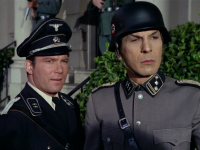
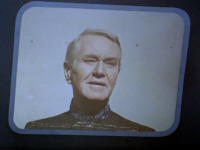
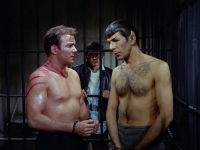
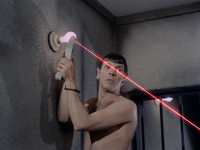
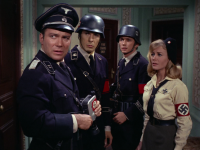
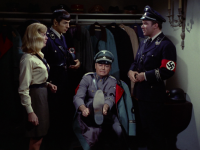
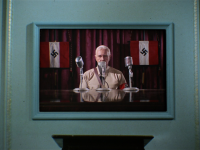
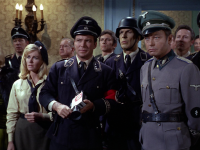

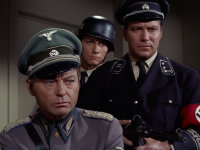
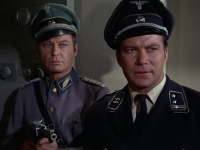

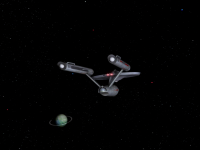
Star Trek TOS - 2x21 - Patterns of Force
Originally Aired: 1968-2-16
Synopsis:
Enterprise is sent to planet Ekos to investigate a disappearance of Federation historian John Gill. [Blu-ray] [DVD]
Filler Quotient:
2, filler, but an enjoyable episode nevertheless. You can skip this one, but you'd miss out on some fun.
- There's no essential plot or exposition in this episode that renders it unskippable, but it's a decent episode, even though it could have been better.
Problems
- During the scene when Spock is about to dig the transponder out of Kirk's arm, Kirk's handcuffs are visibly not secured.
- At one point, Melakon states, "our entire solar system will forever be rid of the disease that was Zeon." This is a common error. The term they were looking for is planetary system. The planetary system we live in is called the Solar System because our star is named Sol. As such, the term "Solar System" is a proper noun, not a generic term.
Factoids
- German TV stations declined to air this episode during Star Trek's original run.
Remarkable Scenes
- The Enterprise blowing up a nuclear warhead launched at them from the planet.
- I like the subdermal transponder idea. A good precaution after so many away missions when they lose their communicators.
- Kirk: "You look quite well for a man who's been utterly destroyed, Mr. Spock."
- Kirk, regarding Spock in a Nazi uniform: "That helmet covers a multitude of sins!"
- Spock to Kirk: "You should make a very convincing Nazi."
- Spock digging the transponder out of Kirk's arm. Ouch!
- Kirk bemoaning about holding Spock up on his back.
- Daras: "You mean that the Führer is an alien?" Yeah, hard to tell sometimes, isn't it? ;)
- Kirk regarding McCoy's difficulties with the uniform: "Well send him down naked if you have to!"
- Spock being called a member of "an inferior race."
- Gill: "Even historians fail to learn from history. They repeat the same mistakes."
My Review
An episode which seems to run on little more than the assumption that Nazis on TV makes for good drama. Sadly, that's not entirely the case here, but despite the episode's weakly substantiated, mostly tacky premise which is little more than an excuse to fill the screen with somewhat bastardized World War II imagery, this episode manages to still retain some entertainment value.
The entire story is predicated on the idea that John Gill, an historian from Earth, had become so fascinated with Nazi Germany and so disturbed by the conflict between the primitive civilizations of Ekos and Zeon that he decided to violate the Prime Directive and interfere with their conflict by manipulating Ekos into adopting the characteristics of Nazi Germany on the grounds that Nazi Germany was, in both John Gill's and even more oddly Spock's peculiar judgement, Earth's "most efficient state" in history.
This is a remarkably stupid idea on a number of levels. Even accepting the premise that Nazi Germany was somehow blazingly efficient, which seems like an unlikely conclusion for either today's historians or the Federation's, it's hard to imagine that John Gill could ignore the painfully obvious fact that this hypothetical efficiency came at the cost of startling totalitarian brutality. Worse yet, if John Gill's goal was to end Ekos' conflict with Zeon, then why transform Ekos into a society perhaps most famous for its intolerance of outsiders? Hardly a way to foster peace. And I have a hard time imagining how Ekos transformed in such a way could ever be run "benignly."
Nevertheless, these seemingly stunning errors in plot logic are confined entirely within the thinking of the character of John Gill, who even acknowledges his gravely poor judgement in his final words. As such, instead of flawed plot logic, we are left merely with a flawed character subscribing to ridiculously faulty reasoning, which greatly enhances the realism of the plot itself, though at the expense of most of John Gill's authenticity. Even with John Gill being established as flawed in his thinking, it's almost hard to believe anyone in his position could have been that stupid.
Another curious detail was the statement that John Gill's view of history was unusual in that he subscribed to a concept that history is best viewed as a series of causes and motivations rather than dates and events. What struck me as odd about that statement is that this deterministic view of history doesn't strike me as at all unusual even today. By the Federation's time period, I would suspect that this reading of history would be rather common.
The plot logic itself is not immune to critique either. Since both Ekos and Zeon are yet another pair of planets full of aliens which look exactly like humans, I question the wisdom of bringing Spock down to the surface in what is supposed to be an undercover mission shortly after the ship was attacked by a nuclear weapon launched by these people. While Spock's headgear did indeed "cover a multitude of sins," the episode itself seemed to laugh at this cliche by having Kirk and Spock end up being captured early on entirely due to the removal of Spock's helmet.
Likewise, the plot logic surrounding the transponders was pretty fuzzy too. The reason Kirk and Spock were given transponders was so that the Enterprise could beam them up if they got into trouble. But then the first thing they do once they get into trouble is remove the transponders to stage a risky escape attempt! Why not just wait for the Enterprise to beam them up? I suppose that it's possible the next check-in from the ship was not scheduled soon enough to prevent their execution, but even assuming that, the policy surrounding check-ins should be more regular specifically to counteract that problem. That, and it sure was nice of the guards to wait outside and completely out of view to give Kirk and Spock ample time to stage a complex escape.
All that said, as we've seen from similar episodes, this could have been far worse. As was mentioned before, the core issue with the plot logic was confined to the judgment of John Gill rather than the plot logic itself, unlike what was the case with Miri and similar stories. Likewise, the fact that the social sciences have advanced to such a degree that it is even possible for John Gill to subtly and carefully alter a society of people to produce an identical clone of Nazism is a fascinating idea; far more compelling than Miri's pathetic excuse of the planet just so happening to have randomly evolved identically.
The premise being what it is also enables us to watch Kirk take far too well to pretending to be a Nazi. He takes to the role quite naturally, making up all kinds of wonderful hate lines about good hunting, dumping corpses outside due to overflow, captured pigs, and so forth. I also quite enjoyed the bizarrely out of character yet nevertheless amusing scene where Spock expresses excitement regarding the exhilarating effect the gamble of whether or not their plan will work has on him. I suppose it's nice to see Spock unable to control his human side on occasion. Finally I quite enjoyed the clever use of the Vulcan mind meld to manipulate comatose John Gill. All things considered, I would have to characterize this as a remarkably well executed story given its mostly shoddy premise.
The following are comments submitted by my readers.
- From rhea on 2008-04-27 at 8:12pm:
And what do you think the “obvious reasons” are? ‘Cause I don’t think they are so obvious to a non-German readership. I hope you do not think that the Germans did not want do be reminded of the Third Reich, which is not the case. Being a German I have heard and read a lot of discussions about it here. The TV audience has no problem with engaging in the topic. In fact there is a lot on the Third Reich on TV. The problem lies within the way the episode is done(taking this rather lightly, somewhat belittling the horrors of reality).
During the first run in the 70s it was not allowed to broadcast Nazi insigina on entertainment television as to not support remaining Nazi tendencies. Later on the channels feared they would meet with strong opposition from political science scholars and historians, who would harshly criticize the casual way the topic was handled in the episode. Many people who do not live in Germany seem to take the topic with a lightness that is not conceivable for most Germans. Here, especially well educated people demand a certain sensibility, even a strict code in which the topic has to be approached - absolutely historically correct and very seriously to do the extreme horror justice. I myself found the episode painful to watch for this very reason.
- From Orion Pimpdaddy on 2010-06-29 at 3:59am:
Not entertaining. For the most part, I think the jokes fall flat in this episode. Like when Spock was commenting while standing on Kirk's back, or when Spock is telling McCoy how to put on a boot.
I did somewhat enjoy the climax where Kirk and the others are sneaking around the back rooms, trying to get to John Gill. There were lots of twists and turns throughout the sequence.
However, I just think Patterns of Force doesn't have that "must watch again someday" appeal like a lot of the other episodes. - From Arianwen on 2010-08-02 at 10:51pm:
I think I'll add a positive review to the cooking pot. I agree with the criticisms of the portrayal of the horrors of the Nazis - although there's not very much you can show in 50 min when you have a whole plot to develop, they could still have put in a little on the sidelines, small details. Another thing that annoyed me (and that annoys me through all TOS) was the lack of blood or even bullet-holes when John Gill was killed. He was shot with a machine gun, for heaven's sake! It quite distracted me from the sadness of the situation.
On the other hand, I'm rather fond of the episodes when the crew of the Enterprise go undercover; all the little twitches and the massive bluffs. As to the characters, the baddies could have done with some more development, but all the goodies felt real and well built. The dialogue was excellent, the humour a bonus. With a bit more explicit darkness it would have been truly memorable. - From Arianwen on 2010-08-03 at 12:32am:
Oh, and another plus for the episode: Daras. Female, blond, attractive - does not wear risqué dresses, shriek, panic, require rescue, fall for Kirk/Big Baddie, etc, etc, etc. Quite astonishing, very satisfying. - From Scott on 2011-05-21 at 4:23pm:
For me, this is one of the worst episodes of season two. Apart from the dumb premise, the Nazi "world" is overly claustrophobic - nearly all of the action takes place in the same corridor, it seems. Worst of all, the humour doesn't work. It just all seems very flat. Spock is out of character, at times - "Captain, now I understand why humans enjoy gambling. There is some exhilaration." This is not a line we would expect from the proudly unemotional Vulcan. In all, a big yawn. - From jd_juggler on 2015-03-25 at 1:37am:
Plenty of episodes feature a shirtless Kirk, but this is the only episode to feature a shirtless Spock. - From jd_juggler on 2015-04-27 at 4:54pm:
Just how long had Gill been on that planet? Darris said she grew up watching John Gill, so I'm thinking at least 20 years. And nobody from the federation bothered checking on him in all that time?
Near the beginning of the episode, the enterprise was attacked by a weapon that was "generations" ahead if where these people should be, but the subject was dropped with no further explanation. So where did this technology come from? Gill was a historian, not a scientist, and he wouldn't have provided weaponry even if he had the ability to do so.
With the vast superiority of the enterprise, there were lots of options to delaying the war called for by melakon. The pilots on the attacking fleet could have been beamed out of their ships, then the ships could have been destroyed. Or the ships could have merely been disabled. And it should have been a rather easy task for the enterprise to disrupt communications so that mekakon's "final solution" could not be broadcast beyond that building.

Star Trek TNG - 7x02 - Liaisons
Originally Aired: 1993-9-27
Synopsis:
The crew hosts a cultural exchange. [DVD]
Problems
None
Factoids
- Terellians have four arms, according to Picard.
Remarkable Scenes
- Worf "having problems."
- Beverly trying to explain the concept of a buffet to the ambassador.
- Worf attempting to tolerate his diplomatic assignment.
- Data insulting Worf accidentally(?).
- Worf: "I am going to kill him with my bear hands. I will take him by the throat and rip out his esophagus!"
- Worf: "You are an insulting pompous fool and if you were not an ambassador I would disembowel you right here!"
My Review
This episode is entertaining though not very credible. The aliens motives just don't seem realistic at all. It's nice that they're not a bunch of psychotic obsessors but are in fact just conducting some harmless research, but their methods leave much to be desired. The pleasant redeems this episode for an extra point. It's always nice to see an understanding and compassionate cast.
The following are comments submitted by my readers.
- From Pete Miller on 2006-05-24 at 1:01am:
I found this episode to be stupid, simply put. The whole idea was just dumb. However, the immense amount of Worf humor was priceless. That cancels out the badness, giving it a 5. Good rating. - From djb on 2009-01-05 at 6:14am:
Voval says they are studying human culture. Why then, is Byleth learning about Klingon antagonism? Why was Loquel interacting with a half Betazoid? At the very end, you hear one of the Iyaarans say to the other, "fascinating species!" Which one? - From Neil on 2009-10-18 at 6:18am:
It was fun to see Warf freaking out and offering to disembowel the other ambassador on the spot.
But in all this episode was disappointing, primarily because of what happened in the last few minutes. When Picard discovers the truth, he almost thanks the aliens, which is totally out of character.
Normally, we would see Picard give a fiery lecture about privacy and personal rights when an alien 'uses' people so blatantly. Particularly in his case when he was put through a lot of physical pain and emotional turmoil.
Those aliens would have faced a blistering verbal assault from Picard, not the friendly forgiveness that we saw. I don't know why the writers chose to do this, it's totally out of character. - From Robert Koenn on 2011-06-19 at 6:42pm:
I gave the episode a 5 but as others have said, overall it was rather absurd but the humor, particularly related to Worf's problems, made it better than it might have been. My wife and I both broke out in laughter when the following scene occurred between Word and Data:
DATA: I have found that in moments of diplomatic tension, it is often helpful to find elements of commonality.
Worf considers this for a moment.
WORF: Ambassador Byleth is... demanding... temperamental... rude...
DATA: (innocently) You share all of those qualities in abundance. Perhaps you should build on your similarities.
There we or course many other humorous parts but that particular sequence was hilarious. There were the obvious inconsistencies such as why did they not simply orbit the alien world rather than use the alien ship and it almost appeared as though they were in an entirely different solar system when they had to crash land on the planet. Most episodes have such errors which are simply written in as the plot line dictates. It would be nice if technically things were more accurate. - From Chris on 2018-02-11 at 5:53am:
I tolerate the episode and agree about the 'study' of humans when neither are being guided by humans...!
My biggest problem with the episode (and I know that I've read this complaint in other reviews on this site) is the complete lack of safety gear and seatbelts!
I know there have inertial dampers to take care of the ride MOST OF THE TIME, but they do, as in this case, sometimes fail. No one would have survived that crash after seeing the ditch the craft dug into the ground!
I guess though that perhaps in this case with the crash done on purpose, safety gear may not have been necessary...
- From ChristopherA on 2019-04-17 at 7:49pm:
I enjoyed the little adventure of Picard on the planet, and have a modestly positive reaction to the episode, although I don't much care for the plot on board the Enterprise, it felt like a sitcom to me.

Star Trek DS9 - 4x05 - Indiscretion
Originally Aired: 1995-10-23
Synopsis:
Forced to bring along Dukat on a personal mission, Kira discovers the real reason her nemesis wants to accompany her. [DVD]
Filler Quotient:
0, not filler, do not skip this episode.
- Numerous major long term plot threads are serviced here.
Problems
None
Factoids
- According to Dukat, the Breen home world is a frozen wasteland.
Remarkable Scenes
- Dukat's appearance as Kira's traveling companion. Funny.
- Kira to Dukat: "Captain Sisko is right! You are in love with the sound of your own voice."
- Dukat: "I know you find this hard to accept, but I believe that in some ways the occupation actually helped Bajor." Kira: "Which part? The massacres or the strip mining?"
- Sisko's major faux pas with Kassidy at the dinner and his later discussion about with with Dax and Bashir.
- Quark trying counsel Sisko, describing how Ferengi handle women.
- The revelation that Dukat had a Bajoran mistress and even a half Bajoran daughter!
- Dukat sitting on something painful. I bet Kira enjoyed every moment of that.
- Sisko getting advice about his girlfriend from Jake. ;)
My Review
So Dukat has a half Bajoran daughter. A decent episode. For several brief moments, I felt that Kira and and Dukat actually gained some respect for each other. Beyond the chronicling of Kira and Dukat's adventure and Sisko and Yates' relationship though, the episode offers very little. An average offering.
The following are comments submitted by my readers.
- From Orion Pimpdaddy on 2006-05-13 at 2:33pm:
When Dukat is about to kill his daughter, at the end of the cave, look carefully at the right side of the screen. Something appears to crawl down the camera lens and then crawl back up. It may be a drop of water, but that does not explain how it changes direction. It is probably a spider.
- From John on 2011-01-11 at 7:28am:
Another Kira episode. It plays out like this:
Kira hates Cardassians and won't shut up about it. Gul Dukat shows up. Kira is outraged. Dukat is arrogant. Kira gets defensive and self-righteous -- this goes on for about 20 minutes, as usual. Kira puts her foot in her mouth and finally shuts up for a little while. Dukat shocks everybody (except the audience) by proving once again that he's even more evil than they thought he was, but not quite super-evil (yet). Kira witnesses all of this but doesn't learn anything (as usual). The end. - From Rob UK on 2014-03-03 at 9:36pm:
I was just watching this episode and just after Dukat sits on the thorn all is not right, i edited out the scene and uploaded it, check this out
Good bit of humour i thought
http://www.dailymotion.com/video/x1ehovn_major-kira-anal-fisting-gul-dukat_fun
No copyright infringement intended purely for fandom and entertainment purposes only ;) Thanks for sharing that little snippet of sanity Kethinov

Star Trek Voy - 6x18 - Ashes to Ashes
Originally Aired: 2000-3-1
Synopsis:
A crewman returns to Voyager. [DVD]
Problems
- Why have we never, ever seen Ballard before?
- How could Ballard have ever possibly caught up with Voyager?
- If Ballard died 3 years ago, how could she have been killed by a Hirogen? For that matter, don't the Hirogen claim their trophies?
- Why hasn't Mezoti been returned to Norcadia? They rescued her from the Borg one episode after Voyager made first contact with her home planet!
Factoids
- Borg Species Designation: 689, Norcadian.
Remarkable Scenes
- The opening scene. I liked Ballard switching from Kobali to English.
- Seven of Nine: "Fun will now commence."
- Seven of Nine's less than perfect parenting skills.
- Tom: "For those of us keeping score, Harry Kim has fallen for a hologram, a Borg, the wrong twin, and now the dearly departed!"
- The doctor: "Hair is one of my specialties, despite evidence to the contrary."
My Review
Good concept, nice premise, a well flowing story, and a great guest starring actress playing Ballard, but the flaws in this one spoil the ride. With more careful writing the episode could have been a lot better. It's hard to watch an episode like this because the execution of the premise was nicely done. If continuity did not exist, there wouldn't be a problem with this episode at all. But there are things in this episode that are hard to justify which wreck a lot of the fun. For details, see the problems section. Otherwise, this episode would have scored well above a 5.
The following are comments submitted by my readers.
- From Robert on 2006-12-29 at 9:06pm:
I always thought they really missed an opportunity here. If they had to bring back a dead crewman for the story, why not bring back Harry? Remember, the 'real' Harry was killed in "Deadlock" and was replaced with the 2nd Voyager's. Wouldn't it have been a kick if it was his body that had been recovered by the Koboli? - From Pete Miller on 2007-01-16 at 10:15pm:
First of all, this episode is an example of how VOY is suffering from "Badda Bing" syndrome, as you might put it. It's well into season 6 and we're getting a bunch of random crap like this rather than major advancements in the storyline. This episode might have been appropriate had the dead ensign been someone we knew. (In fact this would have been a good way for them to bring back Yar in TNG rather than make her some kind of Romulan hybrid.)
Secondly, this episode is a perfect example of a problem I have trouble reconciling, that Star Trek is rife with: The universal translator. When Ballard starts speaking Kobali, how can Torres tell the difference? The translator should be giving it to her in english or Klingon, or whatever she speaks. Example: When Ballard's "father" comes on board, he is almost definitely speaking Kobali, and everyone can understand him just fine.
This problem is all over the place in star trek. When Worf or Martok or whoever says something in Klingon, how can people tell the difference? Furthermore, isn't martok *always* speaking Klingon?
I realize that the UT is a necessary plot device, but I wish they either mentioned this magic ability it has to determine when you want to speak unintelligibly to the rest of the crew, or just stop putting these problems in. - From Rob on 2008-04-27 at 12:37am:
I completely agree with the other Robert... in fact, when I first saw this episode I immediately thought "This could have been a great Harry episode if the 'original' was now the Koboli" and I also thought they could have easily used Ahni Jetal from "Latent Image" and given the Doctor and Harry both an emotionally powerful scene.
Again: Voyager = Wasted Opportunities - From f. ive on 2010-01-29 at 10:37pm:
ah, Lyndsay Ballard. To me, the cutest and most sweetest female character of all the Star Trek series. Why couldn't she just stay and be happy? - From Anonymous on 2013-01-13 at 7:56am:
To both Rogers, that Voyager was blown up, there would have been no recoverable body. - From Al on 2015-10-03 at 3:34am:
Anon that 2 Robs.
Yes but from the more damaged Voyager copy, Harry dies when he is lost/thrown(?) into outer space. A twist to the ultra fab "Dreadlock" is breached by the Vidians is the less damaged Voyager, leading for that Janeway to order Harry takes the Wildman's baby (like Harry, died in the other ships reality) with him to the other ship as the successful Vidian boarding the "healthier" Voyager now means that 'J' will stop the the invasion by self destructing, destroy in the Vidians threat + setting the other Voyager free to escape the "lock" of phenomena that divided the ship, now given the reversal of fortune the clear best chance of survival (of the two ships) with the Vidians breaching the other ship - From Vmail on 2015-12-15 at 4:09pm:
I agree that bringing back Ahni Jetal would have made the most sense... they could even have used a different actor without much of a problem - From parkbench on 2016-03-01 at 7:01am:
thanks peter miller for noting the translator problem. as a bilingual person who has enjoyed fleetingly studying languages over the years and who works occasionally as a translator, it frustrates me to no end that the universal translator principle is always assumed even to the point of not making sense. i'm a few episodes past this now ("muse") and just trying to understand how communication is happening at all, unless you assume that the matrix locks into your freaking lobes without you even realising it--this somehow on a crashed and non-functioning away mission ship...
also, i wish that ballard had stayed on as a "teaser" permanent character. they could have milked this story arc for a few episodes, made her a kind of 'background' main-character for 3 or 4 episodes with hints of her feelings changing as a back story, and then her actual loss at the end, actually messing w viewers' expectations of a new permanent character. she certainly looked creatively done as an alien; i wish seven's difference w rest of the crew was that pronounced (supermodel w/ 3 pieces of visible robotics is kind of too obviously eye candy/fetish...).
so yeah, cute episode, but lost opportunities, the name of the voyager game. - From McCoy on 2017-10-22 at 3:30pm:
In short - it was awful.
I agree with all noted continuity/logical problems, but it's the morality of this episode which bothers me most.
But first - why Kobali are altering alien DNA? They've lost their reproduction ability? Or maybe they've never existed as a species and this "pathogen" is some kind of virus, somehow altering humanoids into "kobali form"?
I find their behavior disgusting and amoral. You can't explain it by "different culture". Stealing a body, altering and reanimating it is very similar to what Borg are doing.
And my final question - why Janeway allowed Ballard to go back to Kobali? Because she really wanted it? Well, it's bull... Seven didn't want to be disconnected from the collective and it doesn't mean she should stay with Borg.
Now I want to forget that episode and never see the Kobali again. - From Amelia Obumhardt on 2022-03-04 at 8:44pm:
Agreed with pretty much everyone here, they should have brought back someone we knew, I was thinking Suter, the killer that Tuvok helped mentally.
Instead they wasted most of the episode on exposition for a character nobody cares about. Terrible. - From maggie on 2022-07-06 at 4:55pm:
Ugh, the Kobali seem to be a rip off of the Oankali in Octavia Butler’s Xenogenisis series. The Kobali use the dead instead of live species with the Oankali. And of course their looks differ too. Otherwise, both mix their DNA with the alien species to reproduce. Both use stasis chambers and place their alien “mates” with families. Both offspring struggle with identity. Don’t forget the similar sounding names…
I don’t see Octavia Butler credited anywhere. For two species to have so many similarities and not be acknowledged feels icky. At min, it’s inspired by, at most it’s a copy with minor modifications.
I’m sure it’s tough being a writer for a revered show. But they can’t be so out of ideas that they are snatching storylines from an award winning sci-fi author, right?
Should have just expanded on the Seven of Nine/mom/teacher/etc episode. Glad for the continuity there.
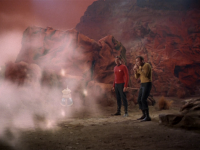
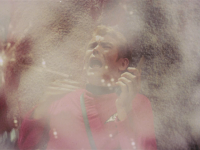
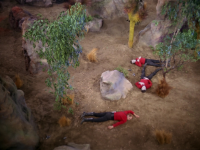
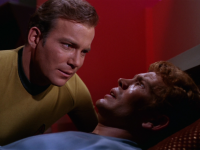
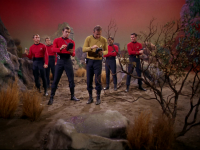
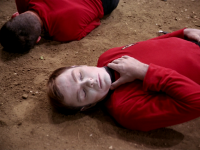
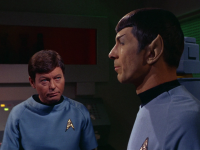
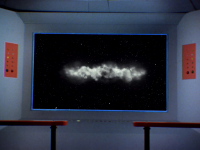
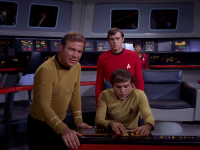
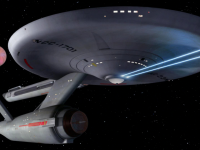
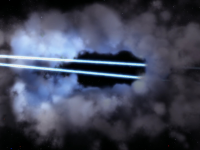
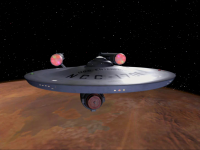
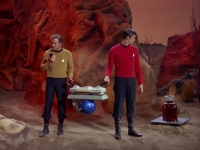
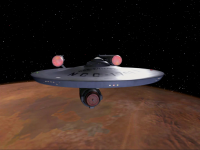
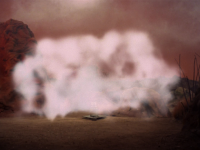
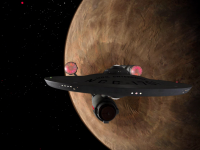
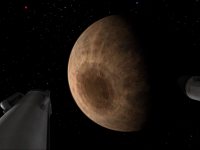
Star Trek TOS - 2x13 - Obsession
Originally Aired: 1967-12-15
Synopsis:
Kirk is determined to hunt down a vampiric entity he failed to destroy in his past. [Blu-ray] [DVD]
Filler Quotient:
2, filler, but an enjoyable episode nevertheless. You can skip this one, but you'd miss out on some fun.
- There's no essential plot or exposition in this episode that renders it unskippable, but it's a decent episode, even though it could have been better.
Problems
- Spock claims that an ounce of antimatter exploded will destroy a planet's atmosphere. This is incorrect. The actual yield would be no more than the atomic bombs that destroyed Hiroshima and Nagasaki.
Factoids
- This episode establishes that Vulcan blood is based on copper, not iron.
- Tritanium is stated to be 21.4 times harder than diamond in this episode.
- Kirk's first assignment was on the Farragut.
Remarkable Scenes
- Kirk chastising his newly promoted ensign for his poor performance.
- Spock revealing the origins of Kirk's obsession to McCoy.
- McCoy and Spock confronting Kirk about his obsession and Kirk handling it candidly.
- Nurse Chapel lying to Garrovick about McCoy's orders.
- Spock revealing to Kirk that based on his observations, there's no way Kirk could have killed the entity eleven years ago even if he had he fired his phaser on time.
- Kirk to Spock: "Why aren't you dead?"
- McCoy: "Crazy way to travel, spreading a man's molecules all over the universe!"
- Scotty: "Captain, thank heaven!" Spock: "Mr. Scott, there was no deity involved. It was my cross-circuiting to B that recovered them." McCoy: "Well then, thank pitchforks and pointed ears!"
My Review
Captain Kirk becomes Captain Ahab in this mostly charming story. While attempts to temporarily relieve Kirk of command seem to be becoming a cliche by this point, just about every detail of the story related to Kirk's personal quest had plenty of dramatic appeal, including Spock's and McCoy's perhaps too familiar conspiracy to relieve Kirk. The noticeable change in Kirk's behavior was well played. After having seen this many episodes we've seen a pattern to Kirk's typical behaviors which is clearly broken here. Kirk quite deliberately acts out of character in this story to service his incredibly unusual mood.
The suspense and build-up is well played too. It takes a full 14 minutes into the episode before we even have complete context as to why Kirk has instantly snapped into being such a mad man, during which time subtle clues are dropped in front of the audience, keeping us guessing. Normally it's annoying when the plot fails to get to the point and reveal to full nature of the danger to the audience, but this episode manages to succeed where similar episodes have failed. The audience has just enough information about what's going on to not be annoyed while still remaining curious about the full context of how Kirk could have such intimate knowledge of the evil entity of the week. It's clear Kirk is familiar with the entity from some prior experience with it, but we're fascinated to know precisely what experience Kirk is drawing from.
When the full context and origins of Kirk's obsession are revealed, the backstory delivers on its promise to substantiate Kirk's errant behavior. It makes sense that on Kirk's first Starfleet assignment that if he were to make a mistake that cost the lives of 200 people, that he would carry that guilt with him for a considerable time. Ensign Garrovick succeeds in acting as a metaphor for Kirk's past and the fact that Garrovick is the son of Kirk's old commanding officer from the very ship that suffered at the hands of this entity was a nice touch.
Garrovick was indeed a conceptually great character, but the execution could have been better. The facts surrounding who he was and what he represented were what made him compelling. Strictly speaking, nothing he actually did made him interesting. A better character would have been more than a window into Kirk's past. Likewise, both Garrovick and one or two of the other security officers had very clear shots at the entity which they didn't take. I wouldn't be as forgiving as Spock was. Their reactions weren't forgivably natural, they were incompetent. Either Starfleet's training of its security personnel is terrible or these officers haven't learned to suppress their fear in a combat situation. Either way there is a competence problem somewhere, regardless of whether or not phaser fire actually was effective.
Regarding the weapon that actually was effective, the antimatter bomb was perhaps the most annoying part of the story. The yield from an antimatter explosion triggered by a reaction of a single ounce of fuel would most certainly not produce an explosion of the magnitude the episode so explicitly and repeatedly goes out of its way to indicate. Worse yet there was no reason why both Kirk and Garrovick had to risk their lives by personally detonating the bomb or acting as bait, especially if the yield was large enough to leave a giant crater on the planet.
Strictly speaking, the ship should have been able to fire the bomb at the entity from orbit and there should have been no need for human lures with a bomb of that scale, given that it was clearly a weapon of mass destruction. Finally, they never even bothered to scan to see if the entity was really dead before trotting off back into the stars.
The following are comments submitted by my readers.
- From Scott Hearon on 2014-04-07 at 11:35am:
Some decent psychological drama in this one, and it was interesting to see Kirk rather unhinged for reasons other than being manipulated by something other than his own psyche.
My problems with this one stem from some of the science. I'm no medical, physics, or chemistry expert, but the writer(s) seemed to play pretty fast and loose with just how the creature was composed and what its capabilities were, in order to suit the drama of the story. If the thing is composed of electricity and basic elements and compounds, why would it require human blood to sustain itself? How, exactly, it is able to maintain its composition in the vaccum of space as it's "surfing" on magnetic waves?
At this point, I'm growing weary of Kirk's smug little smiles, coming as they often do in oddly inappropriate places. In this episode, it's when Spock agrees that the creature is, in fact, intelligent. Kirk all but rubs it in his "friend" McCoy's face by giving him his little crap-eating grin. It's a petty little habit of the character (perhaps an addition by Shatner) and completely out of place in the middle of his obsessive compulsive hunting of this creature that's been haunting him for 11 years. It's far from the first time, and I presume far from the last time, that he's done it. - From Rick on 2015-08-06 at 5:01am:
Kethinov,
Kirk and Garrovick were needed by the weapon in order to confirm that the entity was there. I believe a few times during the episode the characters mentioned that scanning for the creature from orbit was practically impossible. - From Chris Long on 2017-11-09 at 6:38pm:
The stuff I find irritating about this episode is that Kirk repeatedly tells his pals everything they need to know about the creature and yet they continue to disbelieve him and view him as being some kind of crack-pot.
I'm also always annoyed at how his logic works when it comes to who will perform the dangerous task at hand... In this case, it's, "If this plan fails, I want you to be on the Enterprise." This, after Spock's perfectly logical reason (little iron in his blood) for being the one to go down to the surface to detonate the bomb.

Star Trek Voy - 1x09 - Emanations
Originally Aired: 1995-3-13
Synopsis:
Kim is held by an alien race. [DVD]
Problems
- So there are class M "asteroids" orbiting a planet, with breathable atmospheres, and Earth-like gravity? What the hell are the cores of those moons made of that generates this much gravity? Black holes?
Factoids
- The Federation has 246 elements on its periodic table at this time.
Remarkable Scenes
- Kim carefully handling his discussions with the aliens.
My Review
An episode which deals with an alien race's religion. The religious issues are largely handled well, but personally I wish there could have been more discussion of this new element they discovered. Much of the episode is scientific nonsense once the opening scenes are out of the way. The episode starts off giving you the impression that they will explore the rings around a planet, discover a new element, and being creating new technology from it. But it quickly deteriorates into a giant cross cultural religious debate. In the end, this new elemental discovery is largely forgotten; we never hear about it again. To me, this episode is a large missed opportunity and a severe waste of time. Only Harry Kim's performance redeems the episode, as he really does do a good job.
The following are comments submitted by my readers.
- From Fenix on 2011-03-25 at 7:04pm:
I'm going to go ahead and suggest that your "factoid" solves your "problems." Perhaps the presence of one of these newly discovered elements explains the extra gravity on the asteroid. - From Annoyed on 2011-08-10 at 9:37pm:
Problems:
1) As mentioned, "the asteroids support a class M atmosphere" ?!
2)Ok, pretty soon we learn that Ptera was "dying of a lesion to her mid-brain...but she didn't die until the [pod] was activated." Then how come she was diagnosed as having died from a tumor by the Voyager medical crew? No sense.
And while we're on the subject of Ptera dying, how is it that they were able to revive her "minutes after she died" the first time, but not mere seconds after she died the second time, due to not fully unexplained circumstances (it's assumed to be some kind of transporter problem?).
3) Why does it take more than half the episode to fully discuss the theoretical difference between corporeal death/transition and other possible interpretations? This is just frustrating. It's resolved eventually, but it should've really been addressed right away.
4)How does Starfleet academy graduate Ensign Kim, who had his type 2 phaser with him (you can clearly see it holstered while on the asteroid), become completely helpless and at the mercy of the alien doctors? WTF? If he was disarmed, it would've made some sense to show this, but I suspect they didn't show it because it doesn't make sense. Here's the first person ever to come back from "the afterlife," a creature of a race you've never seen, wearing clothing and carrying technology you know nothing about, essentially some kind of angel, or prophet, or profoundly paranormal being, in any case, and the first thing you do is somehow disarm him (this without even knowing what's a weapon and what isn't) ? No sense.
This is the first voyager episode, chronologically speaking, that pretty much just stinks.
- From Mitchell O on 2023-01-01 at 11:47pm:
The other problem on glaring display in this episode is Voyager’s amazing ability to jump huge distances in the blink of an eye.
In this case, they travel 0.6 light years in mere moments. Janeway doesn’t even have time to stand up!

Star Trek Voy - 4x10 - Random Thoughts
Originally Aired: 1997-11-19
Synopsis:
A telepathic race arrests Torres. [DVD]
Problems
None
Factoids
None
Remarkable Scenes
- Torres under arrest for "aggravated violent thought resulting in grave bodily harm."
- Seven of Nine having no sympathy for Torres.
- Tuvok bluffing about wanting in on the dark thoughts black market.
- Tuvok sharing his dark thoughts with Guill.
- Tuvok and Torres talking after Voyager left the Mari planet.
- Seven of Nine expressing concerns regarding Voyager's exploratory nature.
- Janeway to Seven regarding their disagreement: "I dread the day when everyone on this ship agrees with me."
My Review
A fair episode with a meager premise but a decent set of details which make the episode quite pleasant. Beside the fact that the Mari look exactly like humans, the Mari are shown to think of themselves perfect; there's a certain arrogance and aristocracy in their behavior which is quite annoying. Fortunately, Tuvok wastes no time pointing out the imperfections in their legal system. In the end, the Mari are a much more complex race than they first appear, which piqued my interest. The idea of a black market for thoughts is analogous to the black market for drugs, or child pornography. This episode makes a point about how prohibiting certain things can have both positive and negative effects on a society. The idea of restricting what people can and cannot think in a race of telepaths has some merit, but it isn't sufficiently explored in this episode. Voyager just kind of packs up and leaves, leaving the reforms and decisions of what to do to the Mari. This is certainly consistent with the Prime Directive, but leaves the viewer somewhat unsatisfied, as if all Tuvok's work to point out the "dark side" of the Mari culture went partially to waste. Sure, he saved B'Elanna, but we'll never know what effect this incident has on Mari culture. Some details I really liked were Seven of Nine's few brief scenes. She may not have had much screen time, but her dialog was well crafted. The scenes at the end depicting Tuvok and Torres then Janeway and Seven both having their own small argument reminded me a lot of the scenes at the end of TOS episodes, usually between Spock and McCoy. The dialog in both scenes was interesting and funny, a suiting end to the episode.
The following are comments submitted by my readers.
- From TheAnt on 2013-10-11 at 4:11pm:
Snuff and stuff for telepathis
The idea of telepathy were almost phazed out of the ST universe in TNG after some early episodes with Riker and Troi.
But here the idea is investigated again and gets a full treatment.
(I am almost surprised that this episode have yielded no comments since it provided both a setting that provide for the hard core trekkie as well as one intelligent story that provide food for thoughts. Said in passing.)
For example we get another angle on why the Vulcans have to be so much in self control. Also one possible consequence of a society where certain thoughts are outlawed - creating a black market, even fetish which we can see in the Mari pusher, for forbidden thoughts and experiences.
There's one thing that make ST great, and that is the message of personal freedom and choice.
That contrast so well here with the Mari society that have developed into such an nightmare of an oppressive state, that they brainwash or 'lobotomise' their own citizens who do not comply with the 'purity' of thoughts.
- From pbench on 2015-09-03 at 9:57pm:
this episode is preposterous. voyager formula: interesting premise buried under mediocre writing, engage!
janeway's lack of real protest to the whole incident was absurd. again, we could have had a plot where the mari go hog wild on b'elanna in spite of janeway's protestations but we get instead a very weak and poorly thought-out version of the prime directive, misapplied. in fact, the only person who gets close to pointing this out is seven of nine: that the real fault here is ignorance of protocol. given that this is a contact between two alien cultures, the premise that b'elanna is de facto responsible is preposterous, since any diplomatic relationship would require the mari to prompt their new acquaintances with this fact of mari life: i.e., be careful with your thoughts. the mari have either never come into contact with anyone before (unlikely given the ease with which they stroll about w/ voyager crew), or they have, and presumably would have had to explain this at some point. what's the true answer? not something complex; the writer's just literally never thought of this stuff. the entire premise rests on them not explaining themselves but since they are so open to communication and *not* a race with esoteric rituals or a deep suspicion of outsiders, it isn't believable. the main investigator is 100% communicative and so this misunderstanding about a major aspect of their society falls flat.
so let's say they never communicated it anyway. okay. we could see the mari still stubbornly decide to try her, as has happened in trek before. you could run with this plotline as janeway pointed out their lack of procedure and the mari scream for blood. but instead we get a hint of a morality play that never really happens, as tom is made to seem impatient or too confrontational. given the situation they are in--lost in the delta quadrant--janeway's motivation to keep her crewmembers alive, especially crucial ones, is multiplied a thousandfold. even while trying to tow the federation line and submit to different cultures' laws, she could challenge the premise of the whole interaction or even threaten to break b'elanna free, after which i would've thought we'd see the clever plot device that the mari have developed to counter-act a full-on direct assault, necessitating the whole careful sting operation.
instead...milquetoast anger and weird acting. and then tuvok's insistence at the end that he would have let b'elanna be lobotomised had she been 'actually' guilty...horrible logic, as he should be able to deduce that the true fault was diplomatic and not merely one of personalities. and then, plot hole covering scene with seven & janeway at the end there...yeah. weaksauce.
voyager is a joy to behold and there are some awesome moments in here for sure, tim russ being a freaking god. love tuvok. but geeze why's it gotta be in such a painful wrapping?? - From Chris on 2018-04-09 at 6:23pm:
I didn't care much for the episode. Standard fare, I guess... - From Gary on 2018-06-13 at 4:44am:
OK, a minor point, but... Tuvok was beaten up by 3 Mari, really? A starfleet-trained, Vulcan, head of security... yes, against 3, but 3 civilians in a society that outlaws violent thoughts, so we can be pretty sure doesn't have martial training, in a situation where Tuvok should have been on-guard.

Star Trek Ent - 3x12 - Chosen Realm
Originally Aired: 2004-1-14
Synopsis:
Religious zealots hijack Enterprise to use it as a weapon against the enemies of their faith. [DVD]
Problems
None
Factoids
- D'Jamat erased 19.3 XB of data from the Enterprise computer... exabytes?
Remarkable Scenes
- D'Jamat and T'Pol having a science vs. religion debate.
- The human bomb demonstration.
- Archer faking out D'Jamat with the transporter.
- Archer: "These people you're fighting, what makes them heretics?" Yarrick: "We believe the Makers created the Chosen Realm in nine days. They believe it took ten." Archer: "For that you've been at war for over a century?"
- Reed throwing his gun at one of the aliens when it ran out of power.
- Archer: "Go ahead, try to blow yourself up. I'll wait."
- Archer showing D'Jamat the aftermath of his war.
My Review
This episode is a rehash of TOS: Let That Be Your Last Battlefield. While a decent episode to do over again, I should point out that this is yet another filler episode with nothing to do with the Xindi. In fact, this episode erases progress (literally) made in Ent: Anomaly by having D'Jamat delete data regarding the spheres from Enterprise's computer. This annoys me greatly. Some other complaints, this episodes focuses entirely on Archer. Phlox and Reed get a good showing, but T'Pol, Trip, Hoshi, and Travis all get severely neglected. Fortunately, the episode manages to do fairly well for itself. The science vs. religion controversy is made very clear at the beginning of the episode and then the episode spends most of its time pointing out the hypocrisy and stupidity of religion as it proceeded further. If there was still any doubt that Star Trek was anti religion, that doubt is gone now. The demonstration culminates nicely at the end when Archer shows D'Jamat the result of his religious zealotry. I wonder if even that is enough to make him change. Furthermore, I wonder if Archer just left the Triannons on their planet after the episode ended.
The following are comments submitted by my readers.
- From Pete Miller on 2007-07-29 at 3:20am:
I'd say all doubt that Star Trek was anti-religion was gone after TNG "who watches the watchers", but this episode does certainly build on that. It's far less subtle, though. - From Kevin on 2007-11-08 at 4:33pm:
Perhaps Star Trek is anti-religion in the sense that none of the human characters in any of the series professed a faith or participated in religious services, however I think the main point of this episode is that a religion based on fear, violence and a disregard of scientific fact is no religion at all. - From szycag on 2009-05-25 at 2:17pm:
I guess you could call it a rehash of Last Battlefield, I think update or tribute is more appropriate. This is the kind of thing I watch Star Trek for, a way of externalizing the problems that plague us in the present. I think Roddenberry would have enjoyed this episode a lot. Did diverting from the Xindi plot affect your score that much? It's one of the weakest war stories ever done in Star Trek anyways so I looked past it. - From fan ive on 2009-12-28 at 10:54am:
it's most unlikely that D'Jamat after seeing Archer's personal logs still don't know what transporter is.
and one other thing. why didn't the deleted files about spheres go to the recycle bin, and if they did, the data could have been restored - From peterwolf on 2012-09-12 at 6:45pm:
Indeed, many episodes of Star Trek seem to express an anti-religious attitude of the writers and directors. I think they mostly attack irrationalism, religious intolerance and tyranny, which is close to racism and political suppression. However, in several DS9 episodes the Bajoran religion is presented largely as positive, depending on the individual believers. Of course, there were negative examples such as the bigot Kai Winn, but the majority of Bajoran religious people were sympathetic. The most interesting feature of Bajoran religion was that it was based on facts, which had "scientific" explanations, like the orbs and wormhole aliens existing outside of time. This sort of religion is completey different to D´Jamats self-made religious dogmas, which only served his greed for power. - From Dstyle on 2015-10-13 at 8:27pm:
Sure, we look at these foolish zealots with pity and disdain now, but just wait until you die and it turns out the Triannon are right about everything.
<horrible car accident, no survivors, fade to black, then fade to white>
You: "Woah, is this what Heaven looks like?"
The Makers: "Welcome to the afterlife. Did you cherish the spheres? Did you protect the Chosen Realm?"
You: "Huh? Wait, what?"
The Makers (growing ominous): "But most importantly: how many days do you believe it took us to create the Chosen Realm?" - From President Obummer on 2020-01-27 at 10:46am:
It is such a bummer that Trek keeps introducing new species which we never hear of again, because it would have been interesting to see how these guys will handle what happens at the end of Season 3.
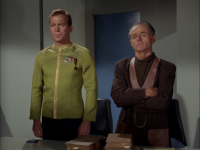
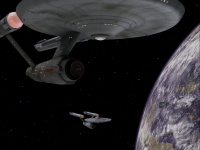
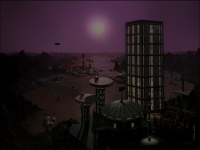
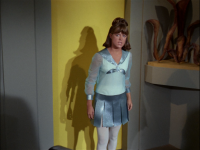
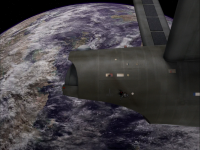
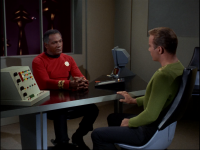

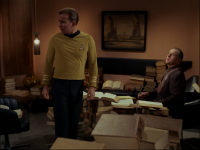
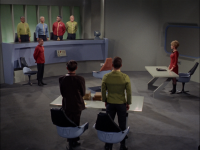
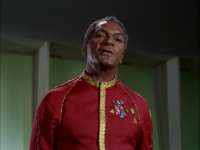
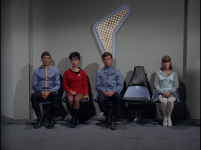
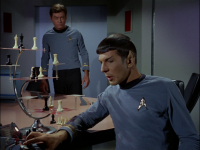
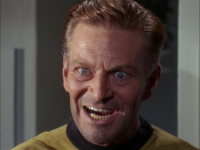
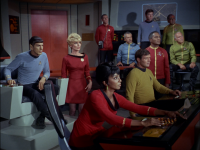
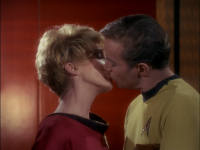
Star Trek TOS - 1x20 - Court Martial
Originally Aired: 1967-2-2
Synopsis:
Kirk is recalled for a potential court-martial. [Blu-ray] [DVD]
Filler Quotient:
2, filler, but an enjoyable episode nevertheless. You can skip this one, but you'd miss out on some fun.
- There's no essential plot or exposition in this episode that renders it unskippable, but it's a decent episode, even though it could have been better.
Problems
- Vulcans are inexplicably referred to as "Vulcanians" in this episode.
- Why does the captain's chair aboard the Enterprise have a "Jettison Pod" button right next to the red alert button?
Factoids
- Captain Kirk's Starfleet serial number is SC937-0176CEC. Kirk's many commendations include: Palm Leaf of Axanar Peace Mission, Grankite Order of Tactics (Class of Excellence), Prentares Ribbon of Commendation (Classes First and Second), Award of Valor, Starfleet Medal of Honor, Starfleet Silver Palm (with cluster), Starfleet Citation for Conspicuous Gallantry, and the Karagite Order of Heroism.
- Kirk previously served aboard the Republic, the registry 1371.
- No starship captain has ever stood trial before this episode, according to the commodore.
- Spock's Starfleet serial number: S-179-276SP. Spock's many commendations include: Vulcanian Scientific Legion of Honor, Award of Valor, and he was twice decorated by Starfleet Command for other unspecified reasons.
- McCoy's rank is established to be that of lieutenant commander in this episode. His many commendations include: Legion of Honor, Award of Valor, and he was once decorated by an organization called the Starfleet Surgeons.
Remarkable Scenes
- The frantic girl accusing Kirk of murdering her father.
- McCoy, to a beautiful woman: "All of my old friends look like doctors. All of Kirk's look like you."
- Kirk's revulsion at the commodore's suggestion that Kirk just take this lying down; just sweep it under the rug.
- Kirk flirting with his old friend while she's trying to give him legal advice only to find out she's going to be the prosecution.
- Samuel T. Cogley's eccentric introduction.
- Kirk to Spock: "Who knows, maybe you'll be able to beat your next captain at Chess."
- The girl apologizing to Kirk for her prior hostility.
- McCoy: "Spock, you're the most cold blooded man I know." Spock: "Why thank you, doctor."
- Spock beating the computer at Chess and discovering the computer had been tampered with.
- McCoy using the amplified sound of heartbeats to prove there is someone hiding on the ship.
- Finney's appearance.
My Review
Say hello to Samuel T. Cogley, an old fashioned man who still uses books in a world where computers are everywhere. Frankly, I found this eccentric luddite of a man far more entertaining than most of the actual plot which while interesting had several weak moments. The worst problem is the character of Finney, whose actions make him come across as a complete psycho and undermine his dramatic appeal. Did he really think he could hide in the ship long enough to get Kirk convicted? What was he planning to do afterwards given that he faked his death? Just go grab his daughter and find some quiet place in the Federation to live for the rest of his life in hiding? For a guy who claims to really love the service he effectively ended his career in the service the moment he pulled this stunt.
Then there's Cogley's questionable lawyering. Between not cross examining the witnesses and worse yet failing to procure a copy of the damning video evidence during discovery (was there even any discovery?) so as to mount a defense against it, Cogley, while amusing, didn't seem terribly competent. Likewise, why does the captain's chair aboard the Enterprise have a "Jettison Pod" button right next to the red alert button? And why are we now referring to the Vulcans as "Vulcanians" all of a sudden? All in all while this episode could easily have been worth an above average amount of points if it had better written guest characters and fewer errors in the plot, it's definitely a nice story as is.
The following are comments submitted by my readers.
- From Lenny Sundermeyer on 2006-08-15 at 11:17pm:
During the fight scene, in the engine room of a 23rd century matter/anti matter powered star ship, of what use is a 20th century 18 inch cresent wrench? The only uses I see are, (A) plot device weapon or (B) for tighting the hydralic steering lines of Scotty's antique Big Foot Truck! - From Arianwen on 2010-07-21 at 3:23am:
Here's a problem for the books: apparently by installing a booster they can increase the magnitude of the auditory sensor by 1 to the 4th power. That's a biiiiig number... - From Old Fat Trekkie on 2011-12-07 at 2:00am:
Every show under the Sun puts their principles on trial at least once. And they all stick. There is one exception however, when Trelane did it. Now that was funny.
"Until your are Dead, Dead, Dead." - From Old Fat Trekkie on 2011-12-07 at 11:37am:
In my last comment I meant to say. "They all stink" - From zerothis on 2012-09-22 at 5:06am:
Crescent wrenches, screwdrivers, hammers, pliers. Of course they will still be around for millenniums. They're simple, reliable, durable, and overall great tools. Impervious to a wide various of future problems including many time-space disasters, dilithium decrystallization, various greek-prefix radiations, etc...
But you've missed a much bigger problem. That is, how is it that Kirk walks into a room without a crescent wrench sitting on a stand in the corner but just as Finney drops the phaser they are there. Seems at least one space-time disaster caused a crescent wrench to move from where someone left it.
- From Scott Hearon on 2014-03-22 at 4:02pm:
This episode has some clear strengths, but I found a few thing annoying. I enjoy how the early parts of the story reveal the kind of character Kirk is. Thus far in the series, his bravery has been on display, but it was more interesting to hear his make-up described by those who know him best.
It was actually intriguing to wonder about whether or not a perfectly capable, skilled leader could make a mistake that costs a crew-member his or her life. I almost think it would have been far more interesting if Kirk HAD made such a mistake, and then had to deal with it. Instead, we get a bit of a bail-out to the story by providing a bit of computer sabotage.
The layout of the panel on the captain's chair was ridiculous. Are we to believe that "Jettison Pod" is really of such importance that the captain has to have it literally at his fingertips? I doubt it.
I can see how Cogley might be endearing to some people, but I thought his character was poorly written and overplayed. The basic idea is good - a man who has a passion for old-fashioned texts and historically significant legal documents. But some of his rants seemed oddly placed within the context of the story.
Overall, a decent but not great episode. - From Harrison on 2014-08-14 at 11:47pm:
One rookie writer's mistake in this episode has always irked me. As the court is convened and Kirk is explaining how the computer can monitor audio, he says that it a booster is installed that will amplify sounds by "one to the fourth power". One to the fourth power is, of course, one, so the booster does absolutely nothing.

Star Trek DS9 - 1x03 - Past Prologue
Originally Aired: 1993-1-10
Synopsis:
A reunion with a member of the Bajoran underground forces Kira to choose between her people and her duty as a Federation officer. [DVD]
Filler Quotient:
0, not filler, do not skip this episode.
- This episode shouldn't be skipped because it's Garak's introductory episode.
Problems
None
Factoids
- It seems the Runabouts are all named after Earth rivers.
Remarkable Scenes
- Garak imposing himself on Bashir.
- Garak to Bashir: "What a thoughtful young man. How nice that we've met!"
- Garak: "Ah, an open mind. The essence of intellect!"
- Bashir's reaction to having met Garak, then talking to the senior staff like an excited child.
- Sisko to O'Brien: "When Gul Dunar docks, it'd be nice if there were a few docking regulations to keep him outside a while."
- Sisko and Kira chewing each other out.
- Kira going over Sisko's head, discussing his actions with an admiral.
- O'Brien hinting at the Cardassian torture techniques to Sisko... additionally hinting that he wouldn't turn over anyone to the Cardassians, no matter what the crimes.
- Dunar complaining about the manufactured docking procedures.
- Tahna complaining about the Federation presence in Bajor.
- The Duras sisters showing up on the station.
- Odo: "We have specific regulations. You can leave your weapons or leave the station. Your choice. Please make it now." B'Etor: "Who are you?" Odo: "I'm the one giving you the choice."
- Odo trying to convince Sisko to let him lock up the Duras sisters summarily.
- Garak: "Join me doctor. Enhance my evening!"
- Garak trying to give Bashir subtle hints regarding the Duras' sisters malicious intents.
- Odo spying on the Duras' sisters using his shape shifting abilities.
- Sisko to Kira: "Go over my head again and I'll have yours on a platter."
- Garak negotiating with the Duras' sisters.
- Garak trying to give Bashir more subtle hints.
- Bashir to Garak: "I'm a doctor--" then he gets interrupted. Bashir was probably going to say something like, "I'm a doctor, not a spy!" A tribute to McCoy's many famous "I'm a doctor, not a (something)!" lines.
- Bashir seeking advice from Sisko regarding Garak.
- Bashir eavesdropping on Garak's conversation with the Duras sisters.
- Bashir realizing Garak's purpose for the "new suit."
- Tahna hitting Kira. Ouch! That looks like it hurt!
- Morn appearances; 1. Passes by Kira and Sisko while they argue; 2. Can be seen on the upper level of the Promenade when Odo confronts the Duras Sisters; 3. Quark's bar while the Duras sisters are there "just sitting."
My Review
An episode where no one knows who to trust. Kira, Tahna, Sisko, the Duras sisters, Garak, and Bashir all trying to push their own agenda. This makes for an interesting political episode, especially with regards to its placement directly after DS9: Emissary, which hints to this kind of political unrest is inevitable. Garak, however, stole the show. Cardassian spy? Probably, but we don't know. One thing's for sure though. He's highly entertaining!
The following are comments submitted by my readers.
- From Orion Pimpdaddy on 2006-08-27 at 2:16am:
This episode contains elements we'll see throughout the series. Kira's past causes her to make tough decisions, Garak is scheming, and runabouts are used for the climax.
Garak and Odo are great in this episode, but I gave it a 4 because it still seems to have that "pilot feeling." - From Bernard on 2009-11-15 at 10:54pm:
I don't remember ever liking this episode, but viewing it now I can see that it is a fairly strong episode. Character development is the order of the day and this has it in spades, even for guest characters (the wonderful Garak in his first appearance).
Bajoran politics are continuing to be featured and that usually makes for decent episodes. I gave it a 6. - From Jeff Browning on 2011-10-14 at 4:12pm:
This episode along with "Progress" in this season, and numerous episodes of other seasons of DS9 exposes one of the annoying aspects to Kira's character: She "goes stupid" whenever she is around a former "hero" of the Bajoran resistance, any Bajoran religious leader, anyone bucking the establishment order or the like.
Admittedly, Nana Visitor is not the greatest actress to start with. (Witness her terrible overacting in "Progress" after Mullibok gets shot.) Whenever Kira gets that starry eyed look, one begins to cringe: You know something embarrassingly lame is coming.
It's like this girl has no common sense whenever she is confronted by one of these guys. She simply cannot accept that they are human beings. Over and over she expects them to behave in a manner which accords with her delusions. And she is constantly and consistently disappointed. Yet she stubbornly refuses to admit defeat: The next time one of these guys comes along: Wham! There she goes again, all strarry eyed and deluded.
The plot device is way, way overused, and it does no credit to Kira's character. It just makes her look stupid. - From Bernard on 2011-10-15 at 9:22pm:
And Jeff has put in a nutshell while talking about Kira exactly why I prefer characterisation in DS9 to that in TNG.
Yes she is stupid. Yes she is stupid often. That is exactly how the character is! She is consistant, although as the seven years go on she does eventually mature somewhat. I prefer watching an imperfect character like this over the perfect people we had in TNG.
As for Nana Visitor as an actress I have to disagree with Jeff as I find her to be spot on almost all of the time during the shows run.
But hey, that's the great thing about opinions! - From Jeff Browning on 2011-10-18 at 8:01pm:
Bernard:
I love the dialog! Thanks so much for your response to my post. My issue with Kira is not just that she is stupid: She is stubbornly and aggressively stupid. After a while folks tend to learn. Kira does not seem to do so that much (although I will keep watching and see what she does in later seasons).
But I also agree with you. DS9 characters rock compared to TNG characters whio become cloying and sickeningly sweet at times. (The funeral schene for Tasha Yarr being one glaring example) DS9 characters seem more real, and for that reason more appealing. Bashir is such a blatant man whore (in a way Riker never was). Dax is so much more edgy and ambiguous than Troi. And as I have said in other posts, I absolutely adore the relationship between Quark and Odo.
I still maintain though that Nana Visitor overacts blatantly at times, though. ("Progress" is a good example.) - From John on 2012-03-20 at 4:51am:
I agree with Bernard. Nana Visitor does a fine job playing Kira. Unfortunately, Kira, as a character, is stubborn, willfully ignorant, and pretty much one-dimensional. It's not entirely her fault though.
In order to like Kira -- to sympathize with her whining about the Cardassians and appreciate her as a loyal Bajoran, you actually have to like the Bajorans. This is nearly impossible, as most Bajorans are depicted as helpless sheep who are WAY too religious, and generally weak. If this was TNG, Picard would find himself disgusted with their blind faith and rigid dogmas. Frankly, I do too.
I admire and respect that Kira is tough, but that's the only thing about her I like at all. Other than that I find her shrill, ignorant, and generally annoying.

Star Trek Voy - 2x08 - Persistence of Vision
Originally Aired: 1995-10-30
Synopsis:
A mysterious force puts the crew in a delusional state. [DVD]
Problems
- When Janeway becomes catatonic, why did Chakotay disappear behind her? He was in the turbolift too...
Factoids
None
Remarkable Scenes
- Busy Janeway.
- Small doctor.
- Kes seeing things. Strange things.
- Everyone becoming catatonic.
- Kes saving the ship.
- Janeway: "Why did you do this?" Bothan: "Because I can."
My Review
I like how the issue of transferring the doctor to the essential parts of the ship is revisited in the beginning. Nice to see it's taking some effort to actually implement. Sadly, not much else is interesting in this episode. I rather liked the detail concerning Janeway getting overworked and stressed out. The little doctor was amusing too. But we've seen far too many hallucination plots already. This episode is really a blatant rehash. The only thing I liked about the main plot as it developed was that Kes saved the ship. Go Kes!
The following are comments submitted by my readers.
- From Freddie Katz on 2015-03-10 at 8:41am:
Not only a rehash of other Voyager episodes, but a a rehash of what has now become a running Start Trek joke; the chief medical officer ordering the captain to take a vacation due to overwork and high stress levels. We had "Shore Leave" on TOS, and "Captain's Holiday" on TNG...I believe that Deep Space 9 was spared. - From Damien Bradley on 2017-01-06 at 8:48pm:
At first I was going to complain that it all came down to some mysterious alien trolling the crew for funsies. What? But then I remembered that that's pretty much all Q does in TNG. :)
I do like how Kes' character is being developed. She has powers not shared by the others, and in this episode she was forced to rise up and save the day. I like how, while at first, she was just kind of the "emotional relief" of the ship -- the warm, caring (not to mention attractive) person anyone can talk to, clearly she isn't just that, and she's becoming much more. Again I'm curious if other Ocampa share her telepathic abilities, or if she's exceptional in some way. This is the farthest I've gotten in Voyager so far, so no spoilers please!

Star Trek XIII: Star Trek Beyond
Originally Aired: 2016-7-22
Synopsis:
Captain Balthazar M. Edison disappeared 100 years ago while in command of the USS Franklin. While marooned on a hidden planet, Edison, now calling himself Krall, developed a deep resentment of the Federation which he saw as unappreciative of his long service and believes it has adopted a weak political philosophy of peaceful exploration. Krall survives on this planet for 100 years using an alien technology he discovered which allows him to drain vitality from others to extend his own life, mutating his body in the process. Once the Federation extends out far enough to make contact with him again, he uses the advanced technology he discovered to wage war against the children of his former comrades.
Problems
- When Kirk is trying to dispose of the biological weapon, Scotty mentions that Kirk is at risk of being sucked into space, but correct term is blown.
Factoids
- Anton Yelchin, who plays Chekov in this film, died in a tragic accident shortly after the film wrapped production.
- This film starts during the 966th day of the Enterprise's five year mission.
- According to McCoy, Saurian brandy is illegal.
- Spock notes that showing geographic favoritism on inducted Federation worlds could cause diplomatic tension in response to McCoy opining that starbases should be on planets instead of floating in space.
- At Starbase Yorktown, Sulu meets up with his male partner and daughter, establishing his character to be gay. This pays homage to former Sulu actor George Takei's status as being gay. George Takei was notably opposed to depicting Sulu as gay in this film. He said that while he was pleased to see the LGBTQ community get some representation on Star Trek, his opposition to the decision to depict Sulu as gay was due to Gene Roddenberry having always envisioned Sulu as heterosexual.
- Shohreh Aghdashloo, who plays Commodore Paris in this film, also plays Chrisjen Avasarala on The Expanse.
- McCoy says that Vulcans have their hearts where humans have their livers.
- The USS Franklin is established in this film to be the first Earth ship capable of warp 4. Based on the available evidence in the film, it appears as though the ship was commissioned prior to the NX-01 Enterprise, then perhaps mothballed and rechristened with its final NX-326 designation sometime later. Likewise, it seems likely that the prefix "USS" was not given to it until after the Federation was founded.
- Krall in his previous life as Balthazar M. Edison is very likely to have served under Captain Archer on the NX-01 Enterprise as a MACO under the command of Major Hayes. His character was never named on screen in Enterprise, but there are several unnamed MACO characters present in the background who could be reasonably retroactively cast as a younger Edison.
Remarkable Scenes
- Kirk regarding his father: "He joined Starfleet because he believed in it. I joined on a dare."
- The impressive sight of the Starbase Yorktown.
- Spock learning that old Spock has died.
- The Enterprise being suddenly attacked and its nacelles being torn off.
- The ship being boarded during the damage control efforts.
- The ship getting poked full of more holes as it tried to flee and people being blown into space, including the boarding party.
- The saucer section crashing into the planet.
- McCoy: "They say it hurts less if it's a surprise." Spock: "If I may adopt a parlance with which you are familiar, I can confirm your theory to be horse shit."
- Scotty and Jaylah finding the wreck of the USS Franklin.
- Spock and McCoy discussing his breakup with Uhura, old Spock's death, and his plans to leave Starfleet.
- Spock laughing and McCoy replying with concern that Spock must be delirious from his injuries.
- McCoy: "You gave your girlfriend radioactive jewelry?" Spock: "The radiation is harmless, doctor. And its unique signature makes it very easy to identify." McCoy: "You gave your girlfriend a tracking device?" Spock: "...That was not my intention."
- Scotty: "These old vessels, they were built in space. They were never supposed to take off from atmosphere." Kirk: "Make it happen." Scotty: "They're called starships for a reason, captain!"
- The Franklin lifting off.
- The attack on the Yorktown.
- McCoy: "Damn it, Jim, I'm a doctor, not a ph--[beamed out]." He was probably going to say "physicist." Count 39 for "I'm a doctor, not a (blah)" style lines, which McCoy was famous for.
- Kirk confronting Krall.
- Kirk's mixed gravity battle with Krall.
- Spock looking at a group photo of a much older Enterprise crew from the prime universe.
- Kirk's birthday toast: "To the Enterprise. And to absent friends."
- The construction of the Enterprise-A.
My Review
Nearly all action, almost no story. Star Trek Beyond is perhaps the most uninspired and unoriginal Star Trek film ever made, as while Star Trek V: The Final Frontier may have been infinitely worse in just about every way, at least that story was original and certainly not without inspiration; drug induced inspiration perhaps, but inspiration nonetheless. The way in which the bland unoriginality of this film stands out most is with the destruction of the Enterprise. While a somewhat pleasant surprise to see so early in the film, it lacked the emotional resonance of seeing the Enterprise destroyed in Star Trek III: The Search for Spock and Star Trek VII: Generations, despite the clear attempt to be an homage to both. Likewise, the entire character of Krall also seems to be an homage to (or perhaps rip off of) Star Trek IX: Insurrection's main antagonist, as both Krall and Ru'afo attain drug-induced immortality at the expense of others, leading to a disfigured appearance. Like the previous film, too much of this film's story relies on nostalgia for past Star Trek rather than carving out a new, exciting story.
Which is especially a shame, as Krall was the most promisingly original concept for an antagonist that the Kelvin timeline has offered up so far; sadly wasted on mediocre scriptwriting. You'd think a marooned starship captain who is a veteran of the Xindi and Earth-Romulan wars surviving for 100 years using alien technology and developing a deep loathing of the Federation's political philosophy would make for a more compelling villain, but Krall somehow managed to be even more bland than Nero. Chief among the reasons why is he's given almost no screen time with which to articulate his anti-Federation political ideology and as such his motivations seem profoundly half-baked and his evil plan feels laughably impulsive for a person with over a century of wisdom under his belt. "Oh look, a random artifact I can make a bio weapon out of to attack the Federation with! Just what I've been waiting 100 years for!" Really? There were so many ways for a person of his means to use the considerable arsenal at his disposal to wreak havoc on the Federation in more calculatedly effective ways.
Part of the reason why Krall gets so little time to become a compelling villain though is it seems the story's authors felt for some stupid reason that it would be more dramatic if his background wasn't revealed until the end of the film. This, in addition to almost completely destroying the value of such a cool backstory, also creates a series of awkward contradictions to resolve. For instance, why does Krall speak an alien language if he is human? And for that matter why does the distinction of language even matter in the age of the universal translator? Moreover, why is the Yorktown so much more advanced than any starbase seen on other Star Treks? None of those questions rise to the level of continuity errors, but they certainly stretch the limits of fan rationalization.
Likewise, the whole film should leave you wondering what happened to Krall in the prime timeline. Since he was marooned before Nero split the timeline, presumably Krall was dispatched by someone other than Kirk in the prime timeline's version of 2263. Perhaps by Captain Pike and original Spock. If that's how it went down, then since the Enterprise wasn't destroyed during the prime timeline's version of that incident, perhaps Pike prime and Spock prime got more time to learn about Krall's anti-Federation political philosophy before they dispatched him. That sounds like a great idea for a story. Maybe they should've made a movie about that instead.
Overall between the issues with the plot logic, the underdeveloped antagonist, and the film's general blandness, this film leaves much to be desired. Even Kirk complained about it all feeling routine ("episodic") in his captain's log, a joke which applies I think more fittingly than the authors intended. That said, there are some things to praise. The destruction of the Enterprise was visually spectacular for all that it was devoid of comparable emotional resonance to the previous films' takes on it. The parallelism with George Kirk presiding over the doomed Kelvin's evacuation and James Kirk presiding over the doomed Enterprise's evacuation was nice, particularly after framing it around Kirk being now a year older than his father was when he died. And it was nice to see Leonard Nimoy's death worked into the plot with the offscreen death of Spock prime making young Spock question his place in Starfleet. But those details aren't enough to make up for the film's flaws relative to the other Star Trek films. While still a very entertaining film, all but one or two of the preceding twelve Star Trek films were better than this one.
The following are comments submitted by my readers.
- From jules4me on 2016-07-24 at 5:42am:
CONS: The shaky and spinning style of camera work during action/fight scenes was annoying (lazy directing so they don't have to choreograph fight scenes as much). Because we don't get a full picture of the motives and true identity behind the antagonist until the end (which made for a confusing storyline), I had a hard time caring about him by the climax. It's important to be able to get into the backstory of the bad dudes & get into their shoes a bit. The pace of the story didn't flow as smoothly as I'd liked. And what was the deal with Dungeness crab head-chick giving in to threats so easily for something so important? I hope she gets demoted for that (or maybe serve up a few of her crab head-legs for an appetizer).
Lastly, my son asked me after the movie just how did prime Spock get a hold of a picture of the prime crew (which he left for new/young Spock), since that universe didn't exist anymore. I said the only way that could've happened was that when prime Spock got caught by Nero, one of his henchmen was nice enough to grab prime Spock's satchel of mementos & nick-nacks from his ship and gave it to prime Spock before stranding him on the icy moon and imploding Vulcan (it's my silly theory).
PROS: I did really like how they showed the warp field around the ship. They have the humorous banter down by this 3rd installment. Nice focus on the Spock-Bones rapport building. Not a lot of pros off the top of my head, but there it is. - From JD on 2016-07-24 at 7:43am:
I saw it last night and largely agree with you, mate. Wasn't exactly thought provoking high brow science fiction. I noticed the possible plot hole with the language too. Also, why did Jaylor need to hide the Franklin so carefully? Krill knew where it was, he parked it there! It would draw more attention to it by hiding it.
Saying that, it was fun to watch in the theatre with a beer and some pop corn.
I give them a pass on the advanced star Base stuff. Previous productions would have done it if they'd had the special effects and imagination to come up with it. - From Jake on 2016-07-26 at 10:34pm:
The Beastie Boys were the heroes of the space battle. Enough said - From Kelly on 2016-08-07 at 10:54pm:
Honestly I feel like I was ripped off. I think they found a formula to draw people in during the summer, a lot of action, shakey cameras, and not much story.
Kinda sad how they rely on the love of the older stuff to draw people.
Well after this one...no more..I learned my lesson!! - From Rob Uk on 2016-09-15 at 11:40pm:
hahaha it's all about the 'member berries, do you remember Stromtroppers and Chewbacca and kirk and Spock?
Yeah i love 'member berries, 'member berries make the bland retelling of the now taste a little sweeter, but, you gotta 'member the 'member berries or the sickly sweet nostalgia and retelling of stories that didn't need retold won't work on you, so if you can't get nostalgic about old pop culture icons without being offended about it all being unecessarily remade in the first place then it all falls flat.
I am nostalgic and offended so i am doubly pissed off.
The last sci fi story we have had from 'popular culture' which was even close to original was The Matrix and that in itself ripped off about 20 other storties of a similar fashion (Mostly the final Red Dwarf book The Last Human pub 1995) but at least they done it in original style.
Really sick of the shite Hollywood is churning out this decade - From Kevin on 2016-11-26 at 9:25pm:
I really disliked the first two "Nu Trek" movies. This one, I TRULY tried to give it a chance, and found the first maybe hour and 15 minutes to be fairly good. I liked the acting, the story, mostly everything. It was like they were listening to fans, and tried to not make it utterly dumb. No lens flares, the camera was not shaking constantly and they focused on objects and people for more than a half second or lass, as in the previous movies.
Then came the motorcycle scene and the silly as hell beastie boys music, that seemed out of place, juvenile, and completely pointless. Then came all the fighting towards the end, and all the good they did, was erased.
It had so much potential to be fairly good, but it ruined things, to satisfy the "typical movie goer" - From John H Adams on 2017-09-22 at 10:28pm:
Hire a very well paid actor that will be completely covered up. How logical is that?
Redo the ships interior then immediately destroy it. How logical is that?
Assume that everybody must be a big fan of the Beastie Boys. How logical is that?
Have an impossibly young Captain entertaining becoming an Admiral due to boredom? It doesn't work that way.
Assume that trekkies yearn for Fast and Furious in Space? Probably an illogical assumption.
This movie would have barely passed for an hour long made for tv show. If I was not a real Trekkie, I may have wanted my money back.
You can't do stupid stuff just because it has the Star Trek label on it.

Originally Aired: 1993-1-24
Synopsis:
A mysterious epidemic sweeps over Deep Space Nine, and Kira must find an antidote. [DVD]
Filler Quotient:
2, filler, but an enjoyable episode nevertheless. You can skip this one, but you'd miss out on some fun.
- There's no essential plot or exposition in this episode that renders it unskippable, but it's a decent episode, even though it could have been better.
Problems
None
Factoids
- Quark mentions that the Ferengi immune system is stronger than most humanoids.
- Odo mentions the station was built 18 years before this episode.
Remarkable Scenes
- The chief's bad day; feeling overwhelmed by people's demands.
- Sisko: "Chief! I thought you were going to fix the replicator!" O'Brien: "You're absolutely right sir, I knew I'd forgotten something. Can't have the operations chief sitting around daydreaming when there's work to be done, can we? Hohohoho... I'll get right on it!"
- Odo picking on Quark.
- O'Brien starting to talk funny.
- Dax: "I'd forgotten what it was like." Kira: "What what was like." Dax: "Being female. I haven't been one in over 80 years."
- O'Brien speaking jibberish.
- Dax talking jibberish.
- Random crewmembers speaking jibberish.
- Odo discovering Quark was making unauthorized use of crew quarters replicators. Quark: "How did did you figure it out?" Odo: "You claimed Rom fixed your replicator. Rom's an idiot. He couldn't fix a straw if it were bent." Completely untrue, as we later learn Rom is somewhat autistic. But Odo's hunch had merit.
- Jake talking jibberish.
- Bashir succumbing to the disease.
- Kira kidnapping the good doctor and infecting him.
- Sisko talking jibberish.
- Quark coming to Odo's aid and teasing him.
- Sisko's coffee in the end burning him again.
- Morn appearances; 1. In Quark's Bar when Quark talks to Dax and Kira; 2. in Quark's Bar when Odo goes in to ask Quark about the the quarantine.
My Review
While a fatal-virus-infects-the-crew episode seems a bit abrupt this early in the show, it nevertheless makes for some entertaining viewing. Everybody speaking jibberiish is great. See if you can repeat a few of those lines to some of your friends mid conversation, it will get you some funny looks. Horseback green undertow in the backwater. Sun rising crest between two ducks. Appalling nature exacts vast insurgency. Oh what fun. Who doesn't like a good word salad?
The following are comments submitted by my readers.
- From Bernard on 2009-11-21 at 1:53am:
I thought this was a fairly drab outing, with a quick fix ending. Lots of cliches and a very poor effort at injecting the suspense needed toward the end of the episode in the shape of the captain trying to escape the station.
Chances at character development largely missed out on because they were talking jibberish!
On the bright side, it's watchable and it's not the worst outing of the season.... - From AW on 2015-11-26 at 7:55am:
You have to consider the scene in which - Sisko tells Odo "There's no hurry" and then Odo proceeds to walk super casually to the turbo lift - a remarkable scene.

Star Trek Ent - 1x08 - Breaking the Ice
Originally Aired: 2001-11-7
Synopsis:
While the Enterprise crew researches a newly discovered comet, Archer tries to deal diplomatically with a Vulcan ship that is suspiciously watching them. [DVD]
Problems
- Why does the comet have Earth-like gravity?
Factoids
- Trip has only been in three relationships. "They all went bust."
Remarkable Scenes
- The children's drawings.
- The discovery of and landing on the comet.
- Archer answering the 4th grade children's questions.
- Trip: "A poop question, sir?" I almost died laughing.
- Phlox talking too much on the recording.
- Travis and Reed building a snowman.
- The discovery that T'Pol's communications were personal, not malicious.
- Trip apologizing to T'Pol.
- Archer to T'Pol regarding Vanik: "Help me make him go away."
- Reed enhancing the snowman with Vulcan ears.
- Vanik's behavior at the dinner.
- Vanik: "Your inexperience and your arrogance are your enemies, not us."
- Trip advising T'Pol.
- The shuttlepod sinking into the ice.
- Trip trying unsuccessfully to use the grappler to retrieve the shuttlepod.
- Archer finally giving in and accepting the Vulcan ship's help.
My Review
And now for some hardcore character development. This episode was most successful because it didn't involve any alien conflict or phaser fights, but just chronicled the ship as they investigated a comet. Rarely do we get something so mundane in Star Trek done so well. I was worried that Vanik might end up having some silly hidden agenda and that T'Pol might be involved in some kind of Vulcan conspiracy, like was revealed at P'Jem last week. But thankfully I was wrong. Instead, we watch as Trip helps T'Pol bridge her cultural barriers. She accepts his advice to make her own decision instead of letting rigid Vulcan custom determine her marriage and her career. She even tries some of Trip's pecan pie in the final scene. Archer learns to back away from his Vulcan prejudice too when he accepts help from Vanik. I'm just glad Archer didn't ask Vanik a "poop question" at the dinner among is many attempts at small talk. And Reed... well, I think Reed's just happy he found something to blow up again. Although I think he (along with Travis) took just as much perverse pleasure in building the Vulcan snowman with the oversized ears too. One lingering question... why do shuttlepods seem to have a dangerous habit of sinking into whatever they land on? ;)
The following are comments submitted by my readers.
- From joe on 2016-06-21 at 2:10pm:
This was the first episode that demonstrated just how melodramatic ENT would be and how much worse it would be than all of the other series. - From dominic on 2016-07-17 at 10:24pm:
I am just now watching Enterprise for the first time. I think I'm starting to see why it has a poor reputation.
First I am starting to get sick and tired of the scripts making Captain Archer seem like a dumbass. The rest of the humans don't fare much better.
Second the plot of this episode doesn't even make sense. Captain Archer is the one that ordered T'Pol's message to be decrypted. So why is Trip left on the hook to apologize? And a point that seems minor compared to the others, but how is an inferior race able to crack a superior race's encryption technology so easily?

Star Trek DS9 - 1x09 - The Passenger
Originally Aired: 1993-2-22
Synopsis:
The crew's efforts to thwart a hijack scheme are complicated when a sinister alien criminal hides his consciousness within the brain of someone aboard the station. [DVD]
Filler Quotient:
2, filler, but an enjoyable episode nevertheless. You can skip this one, but you'd miss out on some fun.
- There's no essential plot or exposition in this episode that renders it unskippable, but it's a decent episode, even though it could have been better.
Problems
- Bashir mentions that people only use small fractions of their brains and claims that there's "plenty of room" to store an additional consciousness. This is a common error in science fiction. In reality all parts of your brain are used for various things. Whatever mechanism Vantika used to transfer his consciousness to Bashir must have operated on some other principle.
Factoids
- Bashir: "The closest thing I've encountered is synaptic pattern displacement. But I've never seen it done by a non Vulcan." This is probably a reference to when Spock transferred his soul into McCoy in Star Trek II.
Remarkable Scenes
- Kira complimenting Bashir and Bashir being completely immodest about it.
- Odo and Quark talking about Dax. Quark: "It's good to want things." Odo: "Even things you can't have?" Quark: "Especially things I can't have."
- Odo being grilled by a Starfleet security officer about how he does his job.
- Sisko: "Odo was probably making sure Quark knows we know he knows."
- Odo's objections to being called "constable."
- Odo regarding Quark: "I always keep an eye on him."
- Bashir, disoriented when he woke up aboard the freighter.
- Kajada murdering her prisoner.
- Morn appearances; 1. At the bar in the background as Odo and Quark talk about Dax.
My Review
A pleasing mystery episode about a man obsessed with preserving his own life even at the expense of other people's. Some highlights are the contention between Odo and the starfleet security officer and the crazed Kajada character hunting her metaphorical whale all episode. I'm not fond of Star Trek's affinity for alien of the week episodes though and the Vantika-inside-Bashir's-body scenes are painfully poorly acted. However, while this isn't the most spectacular episode of Star Trek, it's most certainly decent ride.
The following are comments submitted by my readers.
- From Bernard on 2009-11-23 at 3:44pm:
This is another solid outing. A couple of red herrings thrown in for good measure to keep you guessing.
Worth watching back to see how Vantika is acted by his 'host' as you don't really watch for it first time around. Speaking of which, isn't this another review where you give away what has happened to Vantika? After all, we don't find out until very near to the end of the episode who is carrying Vantika's mind. - From Paul on 2010-08-31 at 11:04pm:
'Vantika did the exact same thing on Rigel VII' - isn't that where kang and kodos from The Simpsons are from?
Also Bashir states that humanoids use very little of their brains - this is untrue. All of the brain is used by humans, but not all of it at any one time. Different parts are used at different times. He has been reading too many urban legends and not enough Starfleet Medical textbooks - From Bryan on 2011-03-29 at 12:10am:
I have to confess that this episode is painful for me to watch. I find Siddig's performance as the posessed Bashir to be extremely wooden, forced, and silly. It ruined a good episode. - From greeh on 2011-08-11 at 11:30pm:
This was a painful one, the first painful one in the series. I'm not sure if I can really explain why. Pretty much everything seemed unbelievable, not well-explained, and too convenient for the sake of moving along the plot...
Somehow it had a weird kind of fairy tale quality to it (maybe some of the usual production staff were sick?)
The red herrings and Bashir being the host was a good twist, but then the possessed acting - and here I agree with another commentator, and disagree with the reviewer - was unexceptional... at best.
I give it a 3. - From Jeff Browning on 2011-10-16 at 6:12am:
Pretty obvious problem: If Bashir is possessed by Vantika, why does he continue to talk in the phones British accent? Wouldn't he talk like Vantika did at the beginning of the episode. I also agree Bashir's acting was pretty bad. - From Shani on 2014-01-09 at 1:01pm:
I'm not really a fan of Siddig at all at this point. He's performance here was terrible. TNG had much better actors. DS9 characterisation is better (the characters actually have flaws) but that doesn't make up for the difference in acting ability. - From Axel on 2015-05-10 at 6:39pm:
When Vantika/Bashir first makes contact with Quark on the upper level of his bar, there is a part where he hurls Quark forward. You can just barely catch a glimpse of Bashir's face as the camera pans up. It's so fast and the angle makes it hard to tell it's Bashir unless you freeze frame at just the right second.
I agree the Vantika-possessed Bashir isn't well acted, though. Siddig's improvement as an actor seems to have happened throughout this series :)

Star Trek TAS - 1x13 - The Ambergris Element
Originally Aired: 1973-12-1
Synopsis:
The Enterprise arrives to study the planet Argo, a water-based planet where earthquakes caused the land masses to sink. [Blu-ray] [DVD]
Problems
- At one point, you can see space outside the shuttle window while they were on the planet.
Factoids
None
Remarkable Scenes
- Shuttle being attacked by water monster.
- Kirk: "I can't command a ship from inside an aquarium!"
My Review
A black vs white conservative vs liberal society on the planet is a bit annoying, but the water breathing mostly xenophobic race was an interesting idea. The political contrast is just too stereotypical; young overly idealistic liberals vs old overly stubborn conservatives. Some of the science in this episode is a little fuzzy, but acceptable. Overall, the plot is original and fun to watch. A water planet with a water race is a nice change of pace.
No fan commentary yet.

Star Trek TNG - 2x12 - The Royale
Originally Aired: 1989-3-27
Synopsis:
The crew is trapped in an alien casino. [DVD]
Problems
- LaForge claims the temperature is -291C. That's below absolute zero, which is impossible. Also, if the temperature is below absolute zero, how can you have wind? Much less 312 meters per second of wind?
- Picard is attempting to solve Fermat's last theorem. Whoops! Little did the writers know that the years 1983 through 1986 remarkable progress had already been made trying to solve it. In fact, by the time this episode was written in 1989 it had already been proven that Fermat's last theorem was 1. solvable and 2. would yield an elliptical curve. The theorem was ultimately solved 6 years after this episode was written by Andrew Wiles and Richard Taylor. The writers must have been very pessimistic about the progress of finding the solution, or they were just uninformed that it was progressing at all.
Factoids
- There are 52 stars on the American flags in this episode.
Remarkable Scenes
- Riker: "Yes. We're from the United Federation of Planets." Clerk: "Of course you are. Welcome to the Hotel Royale."
- Riker: "He means this planet. What do you call it?" Clerk: "Earth. What do you call it?" Worf: "We call it Theta 8." Clerk: "Quite charming."
- Data: "What sort of bu'iness do you suppose he's getting down to?" Mimicking the slang.
- Data playing Blackjack.
- Worf refers to the elevator as a turbolift.
- Worf: "Terrible way to die." Regarding dying in one's sleep.
- Data reading the book at lightning speed.
- I love the insults thrown at this book in the episode.
- Worf answering the phone.
- Data cheating in the game.
My Review
Really quite a dreadful episode. Between the technical problems and the juxtaposition of a book with a horrendous story as this episode's main plot, there is little to redeem this episode besides the occasional well placed humorous scenes. Even those however are difficult to appreciate with all the various cliches and lameness spread about. Most of this episode's single point comes from my appreciation of the characters too complaining about the book. It's almost as if the characters also despise the episode. ;)
The following are comments submitted by my readers.
- From DSOmo on 2007-06-24 at 5:36pm:
- Just before beginning his attempt to win the funds needed to buy the Royale, Data explains the rules of craps to Riker. Doesn't it seem odd that Data has to explain the rules of craps to Riker? Riker is one of the best poker players on the Enterprise. If Riker has such a deep interest in poker, wouldn't that translate to at least a passing familiarity with other games of chance?
- I've read that the scene with Data at the craps table is a knock-off from a scene in a movie called "The Questor Tapes." A two-hour TV pilot in 1974 created by Gene Roddenberry. - From CAlexander on 2011-04-04 at 4:24am:
I liked this episode, despite the lack of any real meaning. It was just fun to watch the crew discover what is going on and execute their escape. A relatively simple, light-hearted episode.
In response to DSOmo:
- It is quite likely that Riker would be ignorant of craps despite knowing Poker. They are very different games. Poker is a game of skill and psychology with an element of chance. Craps is purely a game of chance, a simple-minded gambling game quite likely to have vanished utterly by the 24th century. And the average poker player today knows nothing about many of the games played in the 17th century.
- From Jeff Browning on 2011-10-20 at 4:30pm:
Wind speed of 312 meters per second would translate to:
312 x 3,600 / 1,000 = ~1,000 KPH
That's pretty %#%^ fast! Maybe too fast. Certainly too fast to survive without some elaborate protective gear. Possibly even faster than escape velocity for a planet this small. - From Abigail Chappell on 2012-08-12 at 9:25pm:
Fermat's Last Theorem: My friend Lucas (who went to ESU but transferred there after you left) was watching this episode and caught the problem with Fermat's Last Theorem. He emailed me about it, and I just showed him this website so we could post it under "problems" and look smart. Darn, you're ahead of us! - From Arianwen on 2012-12-15 at 3:43am:
If this episode had a theme, it would be "apathy". The entire crew appear to be suffering from depression, such is their disinterest in events. The away team shows no curiosity, the Enterprise crew no urgency. When your premise is shallow, your plot revolves around a cliché and your atmosphere is nonexistent - this is the result. It's a shame, because it could have been so much more. Picard's agony as he reads The Royale is relatable and very real: clearly they just taped the script to the set without warning Patrick Stewart. One point for emotional honesty and Data hamming it up with the dice.
Re. Fermat's Last Theorem, Wiles worked on the proof in complete secrecy for seven years and when the the time came to proofread the proof (ha) he only told one person. The final publication hit the mathematical world like a falling piano, so at least the writing team cannot be faulted for their research. My headcanon is that Picard was referring to Fermat's claimed "wondrous proof" rather than Wiles' monster of a solution. People still hope to find that mythical elegant proof, though I believe most mathematicians now agree that Fermat had likely made a mistake somewhere. It's likely people will still be keen on finding it three centuries from now.
(Sorry for the infodump, but Fermat's Last Theorem is fascinating.) - From Harrison on 2013-07-14 at 9:50pm:
Undoubtedly one of the most poorly executed Trek episodes ever, replete with narrative sloppiness, stilted acting, bad science and irritating plot flaws. It is certainly Patrick Stewart's most lightweight performance ever.
Too bad, because the original script may have had some potential. All that time wasted on unconvincing dialogue could have been used to give the "future Picard" character a little substance. The time paradox, while hardly novel, could have been woven into something rich enough to at least pique the imagination.
At the very least, this episode more than any other probably put the final nails in the coffin for the irksome "Dr. Katherine Pulaski" character. Silver lining, I think, because she exemplifies the worst Season 2 had to offer. - From Harrison on 2013-07-31 at 5:21pm:
OK, it's a weak (and super low-budget) episode with a lot of flawed science & unsubstantiated plot assumptions.
Nonetheless, it's not entirely a waste of time. Lots of very amusing interplay between Data and the (holographic?) denizens of the Hotel Royal. The Texan and the airhead bimbo are both highly watchable.
It's a lightweight, forgettable vignette. Don't expect a whole lot. But for a filler episode made on a shoe-string, it's not bad. Quality, relaxed performances from just about everyone. - From Mike Chambers on 2013-10-21 at 12:08am:
Very underrated episode. A 1? Come on, it's not THAT bad. It may not be the most engaging story or have any real relevance, but it was a fun little episode. The long-dead NASA astronaut found in the hotel room and his note was interesting to me. That was a very unique plot point. Try to imagine being in his shoes! - From Mike Chambers on 2013-11-12 at 8:31pm:
Just to expand on my last comment...
I also enjoyed watching Worf deal with the situation, a lot of laughs from him in this one. I especially loved Data interacting with the characters in the casino. Funny stuff, and overall an episode that I enjoy watching every now and then. Not every episode has to be dark, serious, and relevant. It was a nice change of pace. - From Ryan on 2015-08-06 at 2:54am:
Data says that the odds favor "standing pat" on 13 when dealer is showing 10, but in any variation of blackjack I know of the odds would actually favor hitting. - From Quando on 2017-02-07 at 1:54am:
Call me crazy, but I kind of like this episode. It is goofy and kind of silly, but I like how baffled the away team is about the whole thing (like not knowing how elevators work). I think the best line in the episode goes to Worf. When they find the old astronaut in bed and mention that he appears to have died in his sleep, Worf says, "what a horrible way to die." - From lordcheeto on 2017-07-23 at 4:59am:
Perhaps the near extinction of humanity following WWIII in the 21st century resulted in the loss of the solution to Fermat's Last Theorem. - From Jamie on 2018-09-19 at 11:21pm:
Kethinov's review of all Twilight Zone episodes: 1. Cliches and lameness abound. - From Azalea Jane on 2021-07-19 at 10:25pm:
So bad, it's good! The cheesy soundtrack, the halfhearted writing... This episode is special. A bit like "Move Along Home" in DS9. Sort of enjoyable if you treat it like a joke.
"None of these people are emitting life signs."
"You mean they're not alive?"
Problem: Troi can sense Riker's emotions from that far away? Wouldn't that sense be subject to the inverse square law, or something? I heard it pointed out that one of the big problems with Troi's character, and one reason she's constantly underutilized, is that nobody could seem to pin down exactly how her empathetic abilities worked. Case in point: what is the range? Does it work by proximity, or by sight?
Data emotionspotting: he looks quite satisfied after winning that hand of 21, then very obviously lights up when he gets into character playing craps! - From Pipanni on 2021-09-07 at 2:35pm:
I too liked this episode. It's very creepy and sad what happened to the lost astronaut. If you just skip ahead all the book-story parts (which suck bigtime) it turns into a rather enjoyable episode.

Originally Aired: 2003-2-5
Synopsis:
T'Pol's standing on Enterprise is threatened when it is learned that she has contracted a deadly disease. [DVD]
Problems
- Only a small minority of Vulcans can perform mind melds? This can't be right...
Factoids
None
Remarkable Scenes
- Archer and Trip meeting Phlox' second wife Feezal. She finishes the scene with one of those big Denobulan smiles.
- Phlox and T'Pol being questioned by the Vulcan doctors.
- Archer finding out about T'Pol's illness.
- Trip fighting off advances from Phlox' second wife.
- Archer approaching the Vulcan doctors demanding a hearing.
- Trip talking to Phlox about Feezal's advances.
- Dr. Yuris revealing how T'Pol contracted her disease to the other doctors.
My Review
This episode demonstrates more clearly than any other the vast differences in social structure on Vulcan compared to that of TOS and later. The two most shocking differences are the insinuation that mind melds can only be performed by certain Vulcans and not any Vulcan, and that the right wing Vulcans are practicing eugenics. I've said before that we've seen enough proof that the Vulcans are different than in the other shows. In a way, I found this episode redundant too. But it was also a nice idea, to show that T'Pol has incurred consequences due to the events of Ent: Fusion. This episode is also very clearly an AIDS allegory. Why find a cure when you can just let the infected die off? The disease is only transmitted by "undesirable" people anyway... Sound familiar? Despite my disagreements with the way Vulcans are being shown on Enterprise, this ended up being a nice episode. And at least the writers are being consistent with their portrayal of Vulcans. I just hope they finally get around showing us what changes them by TOS sometime soon. On a lighter note, the Denobulan subplot was much more successful. Phlox' second wife was just hilarious. I wonder how many times Trip (or Archer) has said the words "perfect gentlemen" on the show now? ;)
The following are comments submitted by my readers.
- From Inga on 2015-04-02 at 12:02pm:
Well I, on the other hand, have some beef with the Denobulan subplot. I know it was played for humour, but Feezal's behaviour was appalling at times. She was simply harassing Trip. If it doesn't seem this way to you, reverse the roles - a Denobulan male getting himself all over Hoshi. I'm really tired of the notion that men always want sex with women, unless they are ugly or married... - From Dstyle on 2015-09-23 at 8:47pm:
A very timely parable about the AIDS epidemic... if by "timely" you mean it is possible to somehow put this episode on a Trek timeship and send it back to the mid-1980s.
Remember that episode of TNG where Riker falls for a member of an androgynous race who secretly identifies as female, and (spoiler) she is outed, persecuted, and forced into a mind-resequencing "rehabilitation" program? Well, that came out in the early 1990s, during the era of DOMA and Don't Ask Don't Tell, when it could be devastating to a person's career and livelihood to be outed as gay. If you read the comments about that episode on this site or any other Star Trek fan site, that episode had a very real impact on changing people's minds and hearts by making them reexamine their own taught prejudices toward gay people. It addressed and challenged the contemporary cultural climate in a way only science fiction can.
That's what this episode perhaps could have been in the 1980s. In 2003? It just feels like a story that didn't really need to be told. It's a parable with no payout; a parallel with no punch.
The "only this small percentage of Vulcans can do mind melds" thing is also really odd, and I'm pretty sure it can't be true. I assume that it's supposed to correlate to "only gays get AIDS," which is of course also untrue.
A better B-plot might have saved the episode, but instead we're stuck with Trip fighting off Phlox's wife's inappropriate advances. No means no, lady! - From Zorak on 2016-10-02 at 2:35am:
I mostly agree with your review and especially with the assessment of Dstyle that this was an incredibly dated parable. Enterprise is just beating a dead horse. Further, I agree with you completely that the portrayal of Vulcans on Enterprise has been unfortunate. They seem to be using the Vulcans as a foil to play against the superior nature of humans, embodied by Archer the savior who is always right and can do no wrong.
If one can set aside those annoyances though, this was another good episode. They didn't really start getting heavy handed until close to the end anyway, so it was enjoyable.
Certainly the highlight was Phlox's wife. She was great. I only wish they would have portrayed Trip as a little wiser than he is. How is it not obvious to him that Phlox would view this differently then a human husband would? There's no excuse for him (or Reed) to have no clue that Phlox's culture has a different outlook on these things. It makes the situation less believable when Trip acts so oblivious.

The following are comments submitted by my readers.
- In one of her personal logs, Unari yearns for a glass of real muskin seed punch, the kind her mother used to make. She doesn't think the replicator does a very good job. Later, Geordi brings her a glass of muskin seed punch in Ten-Forward and Unari acts like it is wonderful. Is Unari just trying to make Geordi feel good or did Geordi get into Guinan's personal supply?
- This coalescent being is either not very smart or it made a bad mistake. Crusher states that it probably has to change bodies every few days. The episode supports this by saying that the coalesced officer arrived at the relay station several days before the incident with Unari. Supposedly he attacked Unari because he needed the food. But the episode's dialogue indicates that the station assignment lasts for a year. What was the being going to do after it consumed Unari and her dog? The station is out in the middle of nowhere. If the being absorbed the officer before he arrived at the station, why would he go somewhere with such a limited supply of nutrition?
- Someone made a mistake in the sound effects department. During the last scene between Geordi and Unari, they sit together in Ten-Forward. At one point, the "boop" sound effect for a companel page momentarily interrupts their conversation. Strangely, no one pages Geordi or Unari, and the scene continues as if nothing happened!
was the dog a berger picard (dog breed) ?
I agree. This one is "absolutely dull and sad." Geordi can't get a break with the ladies to save his life. What is it about Engineers and women? Scottie had this kind of luck as well.
Apart from that, the saddest thing is that a pretty cool idea gets completely wasted here. I love the idea of the coalescent being, but the way it's executed here is just boring. The plot just sort of plods along and then explodes at the very end with the dog attaching LaForge.
Think for a second how shitty an assignment Aquiel has in the first place. She's stuck on a remote outpost for at least a year with only one other person for company, but she's listening to everybody's communication. It would have driven her crazy even if her new partner hadn't been a homicidal blob of ectoplasm. Now that's something that could have been explored a little better. But, alas, this episode squanders it all. I bump it up a point for at least having an interesting premise, so it's a 2.
I'm having problems recreating the murder scene here. Rocha/Blob attacks Uhnari in order to absorb her. Does it succeed a bit (Geordi suggests an initiation of coalescence may have been responsible for her loss of memory) ? Uhnari phasers the blob down to scrap DNA - interfering with the absorption process ?? Uhnari flees to shuttlecraft having interrupted absorption ??? Bits of blob (missed by the phaser meltdown of Rocha ????) then absorb the pooch ????? Or something. Sheesh what a mess.
I know - who cares, get a life.
Hey, at least this chick was real and not some computer generated fantasy.
The episode isn't just dull, it's idiotic as well.
- Uhnari confesses to Geordi that she deleted the logs because she "was afraid that if they found the letter they'd blame [her] for the murder". This directly contradicts her earlier statement: if she had no memory of a murder, then she had no reason to get rid of the evidence! Or memory of having removed the logs at all, for that matter. Did she delete the logs AFTER she came to the Enterprise? If so, what kind of incompetence would allow a bloody murder suspect to teleport off the damn ship?
- Crusher, Picard, Riker and Worf are all aware of the shape-shifting organism. Not ONE of them thinks of the dog. Riker even has a conversation with Geordi while PETTING it - even the Red Dwarf crew would have noticed!
Everyone's holding the Stupid ball today. One can only assume the senior staff are still concussed from their previous adventure.
By far the worst episode of Season 6. I agree that Aquiel's story never adds up even after her "memory drain" is explained and her fight with Lieutenant Blobcha. The entire Klingon thing turns out to be a red herring. La Forge spends a big chunk of the episode getting to know this woman only to have it go absolutely nowhere. And, after all of that, his skirmish with the coalescent being is painful to watch.
At least they brought Leah Brahms-the real one-back for some continuity and development of Geordi's character. Aquiel gets an episode named after her, makes quite an impression on the Chief Engineer, and then disappears for good.